October 8, 2014 / mascara / 0 Comments

Jonathan Hadwen is a Brisbane writer whose poetry has been published in Westerly, fourW, and Stand Magazine, as well as other publications in Australia and overseas. In 2013 he was named runner-up in the Thomas Shapcott Poetry Prize for an unpublished manuscript. He recently had a prose poem sequence published in Writing to the Edge, published by Spineless Wonders.
In the neighbourhood
I drive out to see a friend. He lives out west in a suburb that was brand-new about thirty years ago, but is now a bit run-down. I drive through 60 zones, and 80 zones, a school zone, intersections, and roundabouts in the more modern areas. On every side I pass streets lined with houses. I have lived in this city my whole life. There are so many streets I will never drive down.
*
A plane sinks into the suburbs. A cloud reaches out like a great claw.
*
There are more birds around than I ever knew, and they fight all the time, and some of them even sing. Some of the birds are regulars – a pack of noisy miners, a couple of crows – but occasionally there are lorikeets, or rosellas, and even more rarely, a song-bird. I can never see him, only hear him, there in the trees, no matter how long I stare and study each bough and branch. He never sings the same song twice – he is like a composer trying out melodies, a perfectionist, who is never truly satisfied with the tune.
*
I never see the old couple downstairs, except on bin night. They keep their place locked-up tight, and the air-conditioner is always running whether it is hot or otherwise. It is the man who takes the rubbish out. He totters down the few steps from their first floor apartment with his walking stick, and one small bag of trash.
*
The old man is coughing again. It is bad today. My throat catches just listening to it. The sun is out, in its merciless way. The birds are happy – it is early summer – there is always enough to eat.
May 23, 2014 / mascara / 0 Comments
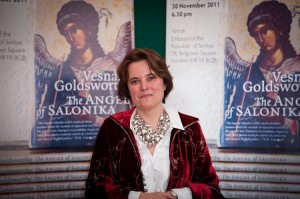 Vesna Goldsworthy (1961, Belgrade) lives in London and writes poetry in English, her third language, as well as her native Serbian, in which her poetry is much-anthologized. Aged twenty-three, she read her poems at a football stadium to an audience of thirty thousand people. She moved to Britain soon afterwards and did not write a line of poetry for over twenty years. Her Crashaw Prize winning debut poetry collection in English, The Angel of Salonika (Salt, 2011) was one of the Times Best Poetry Books of the Year.
Vesna Goldsworthy (1961, Belgrade) lives in London and writes poetry in English, her third language, as well as her native Serbian, in which her poetry is much-anthologized. Aged twenty-three, she read her poems at a football stadium to an audience of thirty thousand people. She moved to Britain soon afterwards and did not write a line of poetry for over twenty years. Her Crashaw Prize winning debut poetry collection in English, The Angel of Salonika (Salt, 2011) was one of the Times Best Poetry Books of the Year.
Yalta
Everything in the world is really beautiful, everything but our thoughts and actions…
A.P. Chekhov, “The Lady with the Dog” (1899)
After they made love that first time
She still felt distant enough to use the formal you
In the first question she posed.
He contemplated the heavy Japanese scent
He helped her choose the day before.
Something less overwhelming, with more zest,
Would have suited Yalta better, now he knew,
Than the red spider lily.
That flower grows, so legend says,
Along the path on which you meet
Someone you will never see again.
He was still naked when he got out of bed
And sat down at the table to cut a slice of watermelon.
His testicles rested on the chair.
The lacquered wood felt pleasantly cool.
They stayed like that for thirty minutes at least.
Her little Pomeranian dog was there too
Watching his mistress, then him,
As he chewed the red flesh in silence.
The two pairs of eyes
Seemed similarly moist in candlelight.
If she were not naked – or not shy –
If she could only fling the window open,
Would they still hear the crashing
Of the waves
In the darkness below,
Like earlier that evening,
A century ago?
Sanssouci
I am old enough to remember
The appearance of Akhmatova’s Requiem,
The ambiguities of Brecht, Brodsky in his prime,
The Wall before it fell, the sound of planes
Taking off and landing. Nearby, another country.
On our long ride to Potsdam
We carved a crescent, a Cyrillic S,
In the first snow of the season,
As we wound our way across
The white spaces on the map,
Along the streets which echoed in Russian
And smelled of coal, cabbage, and wool.
It took years to reassemble
The memory of winter love-making
Undone on the parturition table,
In the encounter of metal and flesh.
The nurse returned with a pack of wadding.
It will cease in a day or two, she said
As though you were, already, absent. Do rest,
Drink some Georgian red, forget.
She straightened the shawl on my shoulders.
Under her uniform, the smell of sweat
Was just like mother’s, the night she was taken.
Our bicycles remained padlocked at the gate.
The brushstrokes of white powder
Emphasised the elegance of bars and chains,
A trail of lines in virgin snow,
To but not from, never returning;
So much blood and nothing
Conceived from so much love.
Of all that betrays us, the gentlest is memory.
Leaving the Party
We walk in silence bearing westwards
Along the towpath, against the current.
The Thames slithers and shimmers
On its slow way to surrender
Exhausted and spread-eagled on the sands of Essex.
Bicycle lights approach and frame us
In milky stills of gelatine silver.
Runners pound by in sweat and lycra,
Their footfall like strange amphibians’ heartbeat,
Mosquito buzz of music rises from their ears.
They give a wide berth to the couple of elderly clowns
In dinner jacket and sequins, carefully treading
With patent leather shoes unsuited to water’s edge.
At one point this evening we seemed unbearably close.
I raised my right hand to touch your temple.
Your hair, your fine hair, your fine white hair
Moved towards my fingers in static electricity.
There again was that question I was about to pose.
Then something behind your unquestionable goodness
Suddenly scared me, like ormolu and woodworm.
The cup of my palm still carries that faint fragrance,
The smoothness of black silk where the hand fell in defeat,
The soft woollen cloth, the white cotton underneath,
All those conspiracies of loom and thread
Expensively constructed to shield and to protect
Your skin, your warm skin, in all its unfamiliar creases.
Mine always feels porous, a layer to be shed,
Though I forever shiver — needing a cover, a shawl, a shelter —
Like some short-lived species of insect, a devil’s darning needle.
The darkness grows. The heat’s abating. I’ll hold myself together.
May 22, 2014 / mascara / 0 Comments
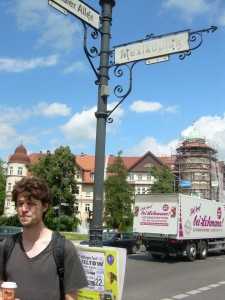 Sam Langer was born in Melbourne, in February 1983. He lives in Berlin. He edits Steamer and has published a chapbook, Law You Can Eat, with Munted Beyond Press. A second chapbook, Topaz, should come out in 2014. Recent poems have appeared in Otoliths, Southerly, and Outcrop. Contact: samuel underscore langer at yahoo dot com dot au.
Sam Langer was born in Melbourne, in February 1983. He lives in Berlin. He edits Steamer and has published a chapbook, Law You Can Eat, with Munted Beyond Press. A second chapbook, Topaz, should come out in 2014. Recent poems have appeared in Otoliths, Southerly, and Outcrop. Contact: samuel underscore langer at yahoo dot com dot au.
Horizon Drinkers (after Pierre Reverdy)
Venomous dregs girt by sea jails
Vicious pearlers in boated collars
these men who shut their eyes in the warm cruise blood
these suspect men whose love lives on water
their eyes open like cages
staggering under blokeish cenotaphs
they go home in hollow bungalows
they hide themselves
and exile and bile and boredom share out
their hearts and minds like overripe fruit
The warm breaths on porches at thresholds
against the boulevards and the currents of night
the ports and beaches
the dead adventures
the flame badge detaches itself, ferments, and is rotting
the nostrils full of savage aftershaves
givings up
bestial fights
unseen agonies in the table shadows
the Tummies rolled under these tomb plaques
the ear sagging with obese words
and too beautiful names
under the frozen forehead arch sharp arrows of desire
this evening the spirit was troubled by an irritating task
to book departure
the world’s blank verso on freshly constructed roads
on hopeless quayside strips toward sudden returns
to leave this type of leaf, always to leave
to run
May 21, 2014 / mascara / 0 Comments
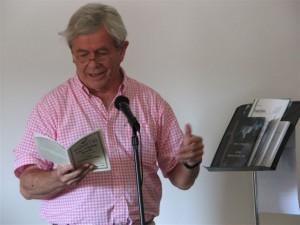 Chris Wallace-Crabbe is an octogenarian metaphysician whose generous accolades include participating in a reading series with Iraqi poets Fadeel Kayat, Jamal Al-Hallaq, Sudanese poet Afeif Ismail, and Chilean poet Juan Garrido-Salgado. Thereafter, he was anthologised in a ground-breaking transnational collection, Poetry Without Borders Ed Michelle Cahill (Picaro, 2008). Having conferenced with the legendary likes of Andrew Motion, Alastair Niven as well as Mulk Raj Anand, Kamala Das, Raja Rao, Eunice de Souza, G.V Desani and Raj Parthasarathi, he describes himself as a post-colonialist with history being the ultimate arbiter. Carcanet published his New and Selected, while his latest collection is My Feet Are Hungry (Pitt St Poetry) and Afternoon in the Central Nervous System is forthcoming with Braziller, New York.
Chris Wallace-Crabbe is an octogenarian metaphysician whose generous accolades include participating in a reading series with Iraqi poets Fadeel Kayat, Jamal Al-Hallaq, Sudanese poet Afeif Ismail, and Chilean poet Juan Garrido-Salgado. Thereafter, he was anthologised in a ground-breaking transnational collection, Poetry Without Borders Ed Michelle Cahill (Picaro, 2008). Having conferenced with the legendary likes of Andrew Motion, Alastair Niven as well as Mulk Raj Anand, Kamala Das, Raja Rao, Eunice de Souza, G.V Desani and Raj Parthasarathi, he describes himself as a post-colonialist with history being the ultimate arbiter. Carcanet published his New and Selected, while his latest collection is My Feet Are Hungry (Pitt St Poetry) and Afternoon in the Central Nervous System is forthcoming with Braziller, New York.
Cardamom Country
Well, yes, I’ve always been intoxicated by India,
a rich Everywhere which can’t possibly resemble us
(except in playing cricket, either straight or bent),
let alone the notorious gravity of beer-drowning Belgium and Wales,
being a technicoloured macro-country of hill station and spice
plus devilmaycare characters like Babur and Kimball O’Hara
and at best reminds me of every adventure I relish,
not excluding the nursery land of green ginger which
may well have been Cathay.
It could be that India is a collective subconscious,
but I can let that one go through to the ‘keeper
tricked out in glorious silks and golden bangles.
My dad lived there through years of war;
I love the way they sustain the English language,
though why we call it that only the Krauts will know,
(bespectacled, growing esteem among literate historians);
a tongue that tricked wryly past Norman bastardisation
holding hands with a lovely Latin of inkhorn learning
in order to produce dinky-di oxbridge Australian
or laboured essay prose from catholic schools,
but which in their spicy landscape is melodiously
delivered from high up the oral register.
On my very first visit to those curried shores
I flicked my passport open to an inclining clerk
who cut to the paper chase quickly and demanded,
“Who is the greatest English poet?” and when
I roundly demurred at Shelley, proffering Shakespeare,
He could cope with that, riposting blandly,
“He was not for England , but for all mankind”.
He passed me on to the dodgy taxi-drivers, Hanuman
and Petrolpants, into the southerly smileage of Madras
with pluncake in Spencer’s emporium.
Back in those days even when the street beggars laughed
and our hotel drummer wanted to eat the cook; no,
it was the other way round, like sari-bright India:
that bulky chef was devoured of all. Whatever
passed by meltingly became him: or her.
and I suffered only once from Akbar’s Curse,
but that was in a posh quarter of Delhi,
not on the elephantine Great Trunk Road
in some lean-to-café with hot sugary tea.
I filled the shower with shit for a couple of days.
Trivandrum was another story again,
literate, breeze-laved, anticipated from childhood,
a southwest version of rapture’s roadway far,
while necklaced with glinting lagoons.
(2012)
May 17, 2014 / mascara / 0 Comments
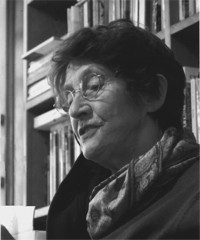 Brenda Saunders is a Sydney poet of Aboriginal and British descent. She has published three collections of poetry, her most recent, The Sound of Red (Ginninderra Press, 2013). Her work has also featured in anthologies and journals and was included in Best Australian Poems 2013 (Black Inc.) In 2013 she was awarded a Resident Fellowship to CAMAC Arts Centre in France where she worked translating into her poetry into French.
Brenda Saunders is a Sydney poet of Aboriginal and British descent. She has published three collections of poetry, her most recent, The Sound of Red (Ginninderra Press, 2013). Her work has also featured in anthologies and journals and was included in Best Australian Poems 2013 (Black Inc.) In 2013 she was awarded a Resident Fellowship to CAMAC Arts Centre in France where she worked translating into her poetry into French.
Skin
He’s suddenly there on a platform at Central.
With a voice like a teacher, he bends to ask.
Where are you going today, my dear?
What is he saying? He’s leaning too close
long teeth, chin, a grey fedora.
I think of red-riding hood, ‘stranger danger’.
Spittle gathers at the edge of his mouth
I say nothing, wondering will he bite?
I’m taking the train to Grandma’s I say.
But we’re not in the woods and I don’t have
a basket, so I show my schoolbag, just in case.
And who are these ladies? he cries even louder,
Watching my Aunties, dark hands holding mine.
He’s eyeing our faces, from one to the other
Waiting in silence, to find an answer.
Everything’s still, but they don’t say a word.
Their eyes look down to the dusty ground.
Searching for something they fear they’ve lost.
As he turns away, he yells to the crowd.
Never can tell with these Abos today,
mixing the blood will lead to disaster.
I don’t understand, but I hear the threat, feel
the pain in familiar faces. I look around
reading the signs. Anxious to find a new way out.
Taxi!
I met her at the lights with her plastic bags
food bought at Woollies
with a Salvo’s card
making for the taxis on Pitt and Park
She’s used to cabbies, knows the drill
never mentions high-rise
The Block or Waterloo
Goes to the first one waiting in line
Calls through the window
asks ‘Are you free?’
Waits, as he looks up from the ‘Form’
Suspecting trouble, he hedges his bets
says he’s booked
The man in a Silver Cab examines
his windscreen, has no answer
to her open smile
her missing teeth counted against her
It’s clear round three is up to me
I demand a ride from a waiting cab
while she dumps her stuff
and jumps inside
‘I’ve got their numbers, I’ll follow through’
I yell to the street, as she moves away
Her strong voice trails a defiant response
‘I always ring, but it don’t change nothin’
Same old story with this black skin’
May 17, 2014 / mascara / 0 Comments
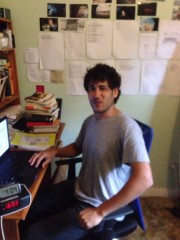 Joel Ephraims lives on the South-East Coast of NSW. He studies creative writing, philosophy, and literature at the University of Wollongong. In 2011 he won the Overland Judith Wright Poetry Prize and in 2013 his chapbook of poetry, Through The Forest was published as part of Australian Poetry and Express Media’s New Voices Series.
Joel Ephraims lives on the South-East Coast of NSW. He studies creative writing, philosophy, and literature at the University of Wollongong. In 2011 he won the Overland Judith Wright Poetry Prize and in 2013 his chapbook of poetry, Through The Forest was published as part of Australian Poetry and Express Media’s New Voices Series.
Vipassana Frog Pond after Meditation and Dawn
Dragonflies synch in misted dawn air
around mutated fingers of a dried dog turd white ash
tree; through the hyperbola your tea cup
spoon-end makes with the unseeablely starlight lipped sun.
Pond new birthed as a biologist stirred mid-dream,
usual as his motions vacuuming up fondue fountain crumbs.
Lilies lie green Pac-men recovering nonchalantly
from heavy drinking with mouths still open for ghosts.
Ripple of rain’s pear explosions programmed
by Blue Mountain weather intermittent in petroleum
tinctured water where larvae by gradations form.
All ghosts long eaten their eyes hover in room at bottom
unseen by orange fish mothers amongst their eggs.
Frogs reincarnated Pali teachers sing final chorus chants
echoing morning pond before Nirvana incognito;
Pac-men power pellet nourished drift over digesting sankharas.
On wooden tree walk rail your elbow crooked
player’s hand splayed toward clock and hushed breakfast hall…
Anicca Anicca Anicca…
Breakfast in the Hall of Shadows
blue blue blue blue blue blue blue blue
blue blue blue blue blue blue blue blue
attentions tune to metamorphosis of steams
mists movements of underworld personalities
lugubrious gods unravelling vista hides
raisins rice grains floating volcanic islets
mirage filmed tongues oasis held spoons
curling yogurts water machine clarity
sighing form behind green mesh glides
melody of beasts burning in nestled forests
blue blue blue blue blue blue blue blue
blue blue blue blue blue blue blue blue
May 17, 2014 / mascara / 0 Comments
Beibei Chen is currently a Ph.D candidate, who came to Australia in 2011 to study in the English department of UNSW at Canberra. She is interested in representations of history, memory and identity in Chinese Australians fictions. She spends her spare time writing essays and poetry related to life stories of Asians in Australia. She has a passion for representing diversity of life, dreams and memory.
Homesick
Two Sharp, Sydney,
Darkening, Conflicting, Yearning, Struggling and twisting.
Neither did I have strong ‘Aussie’ coffee;
Nor walk to the hill growing a gumtree.
I suspect myself being sick.
Lost my soul,
Spelt “scapegoat” wrong into “space-goat”
People laughed.
I cried for home.
The Intruder
He came from the unlocked backyard door,
And straight to my kitchen,
When I was standing still in the rented roof,
Suddenly prepared to salute:
For he is the general of this foreign land,
I am the stranger who is prepared to intrude.
May 17, 2014 / mascara / 0 Comments
 Changming Yuan, 8-time Pushcart nominee and author of Chansons of a Chinaman (2009) and Landscaping (2013), grew up in rural China and currently tutors in Vancouver, where he co-edits Poetry Pacific with Allen Qing Yuan and operates PP Press. With a PhD in English,Yuan has poetry appearing in Asia Literary Review, Best Canadian Poetry, BestNewPoemsOnline, London Magazine, Threepenny Review and 819 other literary journals/anthologies across 28 countries.
Changming Yuan, 8-time Pushcart nominee and author of Chansons of a Chinaman (2009) and Landscaping (2013), grew up in rural China and currently tutors in Vancouver, where he co-edits Poetry Pacific with Allen Qing Yuan and operates PP Press. With a PhD in English,Yuan has poetry appearing in Asia Literary Review, Best Canadian Poetry, BestNewPoemsOnline, London Magazine, Threepenny Review and 819 other literary journals/anthologies across 28 countries.
Calling
Like the little guy screaming to his own death
On the collapsing bridge in Edmund’s painting
My other self is constantly calling
At the very top of its voice from the deepest
Valley of my sub-consciousness, from
The most remote corner of my inner world
From the darkest spot of my dream
Although its calls are muted, they travel afar
Echoing even beyond a whole continent
Like the calls of a blue whale, whose salty voice
Has such a high pitch that no human ears
Can hear them here and now
Y
Yellow-skinned, and yellow-hearted, you seem obsessed with the first letter of the word…
Using my yellow tail
I yellow-swam
From the Yellow River
As a yeast of the yellow peril
Against the yellow alert
In yellow journalism
With a yellow hammer
And a yellow sheet
I yielded to the yellow metal
At a yellow spot
¼ million yards away from Yellowknife
People call me yellow jack
Some hailed me as a yellow dog
When I yelped on my yellow legs
To flee from the yellow flu
Speaking Yerkish* like a yellow warbler
I have composed many yellow pages
For a yeasty yellow book
To be published by the yellow press
Don’t panic, I yell low.
* An artificial language developed for experimental communication between humans and chimpanzees.
May 17, 2014 / mascara / 0 Comments
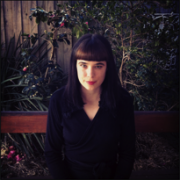 Autumn Royal is a poet and PhD candidate at Deakin University. Autumn’s writing has appeared in publications such as Antipodes, Cordite, Rabbit, and Verity La.
Autumn Royal is a poet and PhD candidate at Deakin University. Autumn’s writing has appeared in publications such as Antipodes, Cordite, Rabbit, and Verity La.
Strained
I saw my heart on the airport terminal floor,
and gasped at how my misunderstanding bled
into fibres scarred by shoes and suitcase wheels.
My organ’s meatiness was too raw to keep in mind,
so I bought a New Idea predicting my horoscope for 20__.
I rolled up the magazine and squeezed,
hoping for a meaning to drip from the gloss.
May 17, 2014 / mascara / 0 Comments
 Saba Vasefi is a poet, a documentary filmmaker and human rights activist. She was a lecturer in Tehran, Shahid Beheshti University. She became a member of the Committee of Human Rights Reporters. She also worked as a reporter for the International Campaign for Human Rights in Iran. She was twice a judge for the Sedigheh Dolatabadi Book Prize for best literature on women’s issues. She was expelled from the University after 4 years of teaching due to her activism. Her documentary film about child execution in Iran ”Don’t Bury My Heart” has been screened for the BBC, United Nation, Amnesty International, The Copenhagen International Film Festival, SOAS university, University of Oslo, Dendy Opera Quays cinema and Seen & Heard Film Festival. She has published poems, research papers, articles, reports, interviews and multimedia about executions, censorship, and women and children’s rights. Her multimedia piece, “Shirin, A Soloist in the Silence Room” was screened in Geneva for the UN. She has also had work published in the anthology “Confronting the Clash: The Suppressed Voices of Iran. She was director of First Sydney International Women’s Poetry Festival (Woman Scream). Currently; she is completing a postgraduate degree in documentary at The Australian Film TV and Radio School (AFTRS).
Saba Vasefi is a poet, a documentary filmmaker and human rights activist. She was a lecturer in Tehran, Shahid Beheshti University. She became a member of the Committee of Human Rights Reporters. She also worked as a reporter for the International Campaign for Human Rights in Iran. She was twice a judge for the Sedigheh Dolatabadi Book Prize for best literature on women’s issues. She was expelled from the University after 4 years of teaching due to her activism. Her documentary film about child execution in Iran ”Don’t Bury My Heart” has been screened for the BBC, United Nation, Amnesty International, The Copenhagen International Film Festival, SOAS university, University of Oslo, Dendy Opera Quays cinema and Seen & Heard Film Festival. She has published poems, research papers, articles, reports, interviews and multimedia about executions, censorship, and women and children’s rights. Her multimedia piece, “Shirin, A Soloist in the Silence Room” was screened in Geneva for the UN. She has also had work published in the anthology “Confronting the Clash: The Suppressed Voices of Iran. She was director of First Sydney International Women’s Poetry Festival (Woman Scream). Currently; she is completing a postgraduate degree in documentary at The Australian Film TV and Radio School (AFTRS).
Slap Fingerprints
Translated by Sheema Kalbasi
It is not without reason
that I no longer miss
Like the tea stirred in the cup
Haze dances around my temple
flock by flock
The Pimp
And the shameless
Scream their pain loud
It is still I
who expands like blood from
collarbone to
legs
But not
ripened enough to be picked from
the branch
The more the wheel turns around
the more confused I become
Like a reptile crawling handless and
Footless
Tell me where in this rotten hole I
should give birth to my daughter
So that the titmice paint her dress
Maroon
With ruby grapes
Now that in the long famine
Queues
I swallow rationed moldy bread
Where on earth should I entrust
Her
lest my imprisonment arrest the
motion of the Heaven
In the long term prison of life
Where is safe
For this out of circle baby
Who goes round and round
To find a face
Branded with slap fingerprints
May 17, 2014 / mascara / 0 Comments
 Deb Matthews-Zott has published two collections of poetry, Shadow Selves (2003) and Slow Notes (2008). She runs the Australian Poets’ Exchange Facebook Group, which has a membership of over 800, and is convener of SPIN (Southern Poets and Musicians Interactive Network). ‘The Weir’ and ‘The Pug Hole’ are from her verse novel in progress, ‘An Adelaide Boy’.By day she is a Librarian.
Deb Matthews-Zott has published two collections of poetry, Shadow Selves (2003) and Slow Notes (2008). She runs the Australian Poets’ Exchange Facebook Group, which has a membership of over 800, and is convener of SPIN (Southern Poets and Musicians Interactive Network). ‘The Weir’ and ‘The Pug Hole’ are from her verse novel in progress, ‘An Adelaide Boy’.By day she is a Librarian.
The Weir – Changing
Generations of Adelaide boys
have fished and swum at the Torrens Weir.
There’s a photo at the State Library
of five boys playing in shallow water
on the other side of the sluice gates
before they were installed.
It’s taken in the early 1900s
and the boys are all naked,
without any shame.
Was it different then?
or did the men with secret desires
always lurk there in bushes and change sheds
awaiting their prey.
One summer I was taken by surprise
in the old stone building, cool and damp
reeking of urine and keeping the shouts of play
at a distance.
Paralysed, I clenched my whole body, aware of my skin
the tug at my swim trunks. Thick fingers trembling
over early pubic hair. The fight or flight response letting me down
as bearded lips brushed me there, thrill of tongue, trembling thighs
a sick chill in my stomach, being drawn in, afraid, confused, but
somehow pleasant, heart lurching, unsure how to move away,
to end. Creak of old wooden door, the slackening of a spider web,
a fly caught in sticky silk, to be devoured. The world of boys burst in,
innocent, the flick of towels, push and shove of rough play, breaking
the act, in a flurry of escape. Utterly changed.
The Pug Hole
From Port Road, Welland, to the brickworks
at Hindmarsh, was only a 3K bike ride.
Off the main road, just beyond the river
the pug hole was an adventure playground,
where we’d spend all day clambering down
into the cocoon of clay, with deep pockets
of water, sprouting reeds, and a cache of
rusted rotting junk we transformed for play.
Old corroded tins were threaded with wire
for catching tadpoles in murky puddles.
Abandoned car bodies, afloat in deep
wells of oily water, became pirate ships
as we straddled them, and fought each other
with sticks, constantly shifting our weight
to keep the wrecks from sinking into the mire.
It wasn’t unusual then for a boy
to carry a slug gun or .22, slung across his back,
and to fire at bottles or tins lined up at a distance.
There were holes all over Hindmarsh and Brompton
which, having given up their clay for bricks
became dumping grounds for waste
and a rich source of amusement
or childrens’ imaginations.
The watery fissures were muddy but slicked
with slippery rainbows. When you stopped to notice,
the smell was a mixture of dead animal, iron, and rotten socks.
When it was time to ride back home
we carried the swampy scent of the pug hole
on our clothes,
to our mothers’ ire and disgust.
May 17, 2014 / mascara / 0 Comments
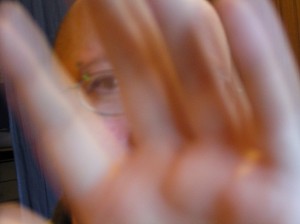 sean burn’s third and latest full volume of poetry is that a bruise or a tattoo? (isbn 9781848612945)
sean burn’s third and latest full volume of poetry is that a bruise or a tattoo? (isbn 9781848612945)
was published by shearsman press, autumn 2013. www.shearsman.com/pages/books/catalog/2013/burn.html
regina carter
thru first smoke days ov
autumn this havana
violin swinging like
leaves singed slowburning
slowburn in smoke ov this
miya masaoka
stripping the live
violins ov staccato teas
the spent fuel the hard
edge ov lullaby incense
signals bad girl dis integrate
myra melford
stitching time yr blue
blue-sing exhilarations
multiple nations
chord-calling yr striding yr
crush-seek see-sawing the now
sz – foundmap ov budapest. my icarus hands in exile / circus madonna fighting on an empty cock street / dream ov a sycamore / collection ov pharmacy / when hearts meet performance / wandering street playing chess / wandering street playing leaves / motive entitled autumn / country accident sweeping golgotha downtown / towing the feeding trough upriver / jumping over the patriot ship w/out show / satiric priest dancing water / latrine lovers reflected / forced march to the font / girls private war / street writing a mobilization letter / wandering spring : sleeping snow : kiss-cooking underneath / officer stripped ov his commune at beginning ov the badge / backwards feeding eternal tender touch ov the small town judge selling the hospital mass market / march hand waiting for two wounded april comrades / dont throw stones at each other : dont throw each other at stones – image-whispering / swineherd rippled in a cockerel glass / cd it possibly be said / cd it possibly / everything can be traced back to everything / everything can be traced back / even the smallest / everything can be / documentarist / cubist / surrealist / absurdist / dadaist / da da da
May 16, 2014 / mascara / 0 Comments
MTC Cronin has published eighteen books (poetry, prose poems and essays) including a collection jointly written with the Australian poet Peter Boyle. Several of her books have appeared in translation including her 2001 book, Talking to Neruda’s Questions, which has been translated into Spanish, Italian and Swedish. Early 2009 saw the publication of Squeezing Desire Through a Sieve ~ Micro-Essays on Judgement & Justice (Puncher & Wattmann, Sydney) and Irrigations (of the Human Heart) ~ Fictional Essays on the Poetics of Living, Art & Love (Ravenna Press, USA). Her work has won and been shortlisted for many major literary awards, both internationally and in her native Australia. Cronin has studied arts, law, literature and creative writing and after working for the decade of the nineties in law, began teaching writing in primary, secondary and tertiary institutions. She currently lives, with her partner and three daughters, on a biodynamic farm in Conondale in the Sunshine Coast Hinterland of Queensland. Her latest poetry collection, The World Last Night [Metaphors for Death], was published in late 2012 by University of Queensland Press. A new collection – The Law of Poetry – is forthcoming through Puncher & Wattmann.
Lesson
Every day, crucify what you know.
Watch the stone practising what it knows
of bulls and men.
When the dream begins to fall, don’t catch it.
Console the words which have lost other words.
Learn how to wholly speak
for the voice that speaks in shards`
but hints at love.
Move! And then move again!
The distance from your mother’s womb
is measured by adding what is now clear
to a bowl of yellow peaches.
Show me something perfect!
Learn the inside of your heart.
Be shaken by infinity awake.
Break poison like bread.
History Lesson
The cradle of history
is filled with rocks
which were all gathered yesterday.
The tomb of history
is surrounded by mourners whispering
in the ears of tomorrow.
Just what happened is nowhere.
May 16, 2014 / mascara / 0 Comments
Shirani Rajapakse is a Sri Lankan poet and author. She won the Cha “Betrayal” Poetry Contest 2013 and is a finalist in the Anna Davidson Rosenberg Poetry Awards 2013. Her collection of short stories, Breaking News (Vijitha Yapa 2011) was shortlisted for the Gratiaen Award. Shirani’s work appears or is forthcoming in, Kitaab, Cyclamens & Swords, Channels, Linnet’s Wings, Spark, Berfrois, Counterpunch, Earthen Lamp Journal, Asian Cha, Dove Tales, Buddhist Poetry Review, About Place Journal, Skylight 47, The Smoking Poet, New Verse News, The Occupy Poetry Project and anthologies, Flash Fiction International, Ballads, Short & Sweet, Poems for Freedom, Voices Israel Poetry Anthology 2012, Song of Sahel, Occupy Wall Street Poetry Anthology, World Healing World Peace 2012 and Every Child Is Entitled to Innocence. She blogs rather infrequently at http://shiranirajapakse.wordpress.com.
Late Afternoon
The sun’s overhead, I’m melting
like chocolate oozing all
over. Clothes stuck to skin
waiting for rains
that refuse to fall. The grass
cracks underfoot, coarse like old coconut
leaves falling to pieces bruising
my soles. Hot winds hurry
through the garden howling in agony. The cat
looks up and shrugs it
off as crotons, red, orange and yellow
sway flirtatiously.
The sky’s a deep blue
like the skirt you bought from
some faraway
land. I wore it with pink, you
liked the effect, shocking like the sunset,
the colour of my tongue,
lipstick and something else.
There’s no respite today. The weather’s
being cruel again.
Games People Play
Staring at the kettle, steam rising to the
ceiling, she’s sitting in the kitchen in her little
house in London, wondering what he’s doing
so far away from home.
Sun’s setting; she lounges in the verandah in
Colombo, unsure when he’ll leave. Colours
change in the garden, mango
leaves turn golden. She looks at him.
Shadows fall, walls whisper secrets. “Doesn’t
know what he wants, doesn’t know
what he wants.” Pink oleander strains
over the wall from the neighbours garden. Nods
at him sitting silent wondering what to
do. Messages whispered over phone lines,
crumpled in colored papers thrown
into dustbins. Needs more time
to decide. Winter in London,
cold and chill like lilies
adorning a wreath. A strange look in her
eyes, questions demanding to tumble
out. She doesn’t say a word but comes to
him. Sweating it out in the late afternoon heat her
blouse sticking to her like a second skin
dark pink like oleander. Rising from her corner
she pours herself a coffee, staring at the rain
falling, falling through the trees. He pulls
her close to him, desires take over. The game
moves on, decisions fly in the winds.
May 15, 2014 / mascara / 0 Comments
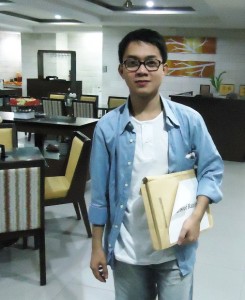 B.B.P. Hosmillo is a Filipino poet writing in English. He received the JENESYS Special Invitation for Graduate Student Research Fellowship in 2011 and the National University of Singapore—Asia Research Institute Graduate Student Fellowship in 2012. His poetry was shortlisted for the 2014 VOID poetry competition by Cha: An Asian Literary Journal, Hong Kong’s premiere literary establishment. Currently, he is based in Rumatá Artspace in South Sulawesi, Indonesia where he is completing a collection of poetry. Recent work has appeared or is forthcoming in Kritika Kultura, Cha: An Asian Literary Journal, Quarterly Literary Review Singapore, Far Enough East Journal, Sundog Lit, Alice Blue Review, Kenning Journal, Nude Bruce Review, Ellipsis…literature & art, and elsewhere.
B.B.P. Hosmillo is a Filipino poet writing in English. He received the JENESYS Special Invitation for Graduate Student Research Fellowship in 2011 and the National University of Singapore—Asia Research Institute Graduate Student Fellowship in 2012. His poetry was shortlisted for the 2014 VOID poetry competition by Cha: An Asian Literary Journal, Hong Kong’s premiere literary establishment. Currently, he is based in Rumatá Artspace in South Sulawesi, Indonesia where he is completing a collection of poetry. Recent work has appeared or is forthcoming in Kritika Kultura, Cha: An Asian Literary Journal, Quarterly Literary Review Singapore, Far Enough East Journal, Sundog Lit, Alice Blue Review, Kenning Journal, Nude Bruce Review, Ellipsis…literature & art, and elsewhere.
Old Creases
—for Liêm Vũ Đức
I have already spoken. It was loud. It was clear.
The insipid flesh comes to me with a pregnant ask without any point of return, not even a single
pause:
Was it the color of Mt. Fuji? Was it really a footprint?
Was the moon absent when you departed from the night and the sun nowhere to be found?
Were you, really, alone in the exterior estuarine damp?
The clinking sound of kitchen utensils is always ambitious in the forlorn arena of a bachelor’s
gourmet. His hip-hop metals are frantic against the table’s flat slab. His pointer-finger pokes
each corner of every apathetic wall, waiting. The city is agog for another visitor, humming.
Coins are triggered in a pocket, perhaps the left, of a single man in a walk, bulging. All are
noises of a limp for chaos is a woman; it has torpor of abyss. Departure is a guillemet, just as
inside, just as out. It is the word ‘either.’ Yet places of rest a porcupine to an outsider are a
grammatical relative: where is it that augmented? She takes the receiver of a ringing telephone
just to silent it. She presses the answering machine. A voice-over, recorded from a memorized
script. A repetition, practiced and perpetual. An imaginary friend, one of whom Caliban spoke to
in The Tempest: hast thou not dropp’d from heaven? But the weather is an acid grace. It was
your tongue devoid of sap, limping for an evil trance while my words are never fluid,
always dry, always black. You motioned me with a drunken litany, an accidental violence of husbandry to a
woman now sinful for smiling at her wedding. She is a chaise lounge. A body of another reclines
against her at 3pm while James Joyce is the narrator. She is a house. A son visits her every
summer, every burial.
My Prized Room
—for Liem Vu Duc
Whoever looks seriously at it finds that neither for death,
which is difficult, nor for difficult love has any explanation, any
solution, any hint or way yet been discerned; and for these two
problems that we carry wrapped up and hand on without opening,
it will not be possible to discover any general rule resting in
agreement.
-Rainer Maria Rilke
VIII.
Outside the room there are plenty of noises: crickets whispering, ting-tong of two elevators, scratching of cold neighbor’s bodies, and our feet.
VII.
What keeps me focused is how your eyes as we walk like we always did inspect my doubting iris. I wanted to ask ‘what happened last night?’ but your left hand holding a wilting brownish leaf of a fig made me forget speech.
VI.
There is no silence inside the room: ream of antiquarian papers, bags of tea from the most impoverished cities in Southeast Asia, a bed where two safe pillows aground, and our photograph.
V.
I was told early morning yesterday how you cried heavily after our evening conversation. I had to doubt. I had to search for a graspable reason why you would allow your misfortune be known to other men in the most inconvenient time-a nocturnal call of the one ready to die. I had to see you as if you were a paper that I have to write on; a page’s mystery relies on its ability to obscure the eyes.
IV.
By your right hand, you took a pillow carefully bringing it underneath your head; your left hand still clutches the almost dried leaf. ‘Will this room be forever?’ you said. I touched your head, my hand counting each hair strand. I wrapped myself around you feeling your thighs, your proud chest a delight of the sweetest nipples, your broad shoulders that can be a bridge to troubled arms. Onto your beloved neck, I pinned my warm lips. The sublime electric emptiness was a force to trust you; I let fall my left hand unto your now empty right. Then our eyes conjoined as if by accident: we met again. I gave you the room key I left in my pocket. What we have now is distance: what makes a return that finds nothing, only separation?
III.
It was too fast. You were at your feet. I find memory in what I have: a room, garbage bin full of torn papers and dirty letters, used tea bags that only bittered my lips, a soiled bed dwelling of a pillow whose color reminds of me of urine, our photograph the object of creative dust.
II.
You left with what you have: a dried leaf that pulverizes each step, the key to my room and your eyes with a promise of return.
I.
I started cleaning my prized room. Since your death, it became an everyday routine; your every faint shadowy appearance is a trace that even my room will soon expire.
May 14, 2014 / mascara / 0 Comments
 Nathan Curnow lives in Ballarat and is a past editor of Going Down Swinging. His work features in Best Australian Poems 2008, 2010 and 2013 (Black Inc) and has won a number of awards including the Josephine Ulrick Poetry Prize. His most recent collection, RADAR, is available through Walleah Press. Nathan has been twice short-listed in the Peter Porter Prize.
Nathan Curnow lives in Ballarat and is a past editor of Going Down Swinging. His work features in Best Australian Poems 2008, 2010 and 2013 (Black Inc) and has won a number of awards including the Josephine Ulrick Poetry Prize. His most recent collection, RADAR, is available through Walleah Press. Nathan has been twice short-listed in the Peter Porter Prize.
The Guru
his rants make sense with ‘listening glue’
he is convinced he can poop a dove
he prophesies that a dragon will shake the building
separating the wheat from the chaff
murderers go to hell and play Cluedo forever
Salvation—harder than pissing on a frog
we dig him a moat and fill it with lions
‘hurple’ is the mantra of the month
he blesses each raid on the cannery outlet
gives us hair bracelets and Kalashnikovs
flexible parentage is the number one doctrine
everything consensual at first
how much sunshine to bleach a camel
tepanyaki is your mum—
his koans are unique and so expensive
they are impossible to forget
passing the time with games of wink murder
while he sleeps in his celestial vault
it is his destiny to ascend in a skybox we bought
with the life savings of non-believers
rejoicing when the famous clown becomes a convert
until we become wary of tricks up the sleeve
we patrol the stockpile and then the orchard
executing the voluntary penance
and when the guru returns trembling on stage
trying hard to poop one with wings
we see it all makes sense in his divine program
on guard for whoever smirks first
Séances
teenagers help their parents conduct them
in exchange for car keys and weed
but if they tire of quizzing the Ouija board
the pointer just keeps on moving
packed away the wooden heart slides faster
knocking against the sides of the box
some wrap it in blankets and stash it in a draw
some submerge it in the tropical fish tank
an anonymous narrator transcribes War and Peace
there comes the back story of the Cheshire Cat
and something is spelling quality mince matters
perhaps a butcher with undying remorse
this last parlour game this after-life rhythm
a constant tapping of fees and charges
Rosabelle-answer-tell-pray—believe believe believe
over and over from beneath the house
wedged in a locker at the Ever Fit gym
abandoned in a food court at an empty mall
the dead metronome counting down
some set it on fire to watch their flaming souls
posting premature messages from the grave
some never tire remaining stuck to the board
for answers that will come soon enough
as the family car pulls out throbbing with bass
denouncing the beats of the Angel of Death
the last players of hip hop middle fingering
the stereo uh yeah uh uh uh
May 13, 2014 / mascara / 0 Comments
Jamie King-Holden lives in Melbourne and studies literature at Deakin University. Her first book of poetry, Chemistry, was published by Whitmore Press in 2011. Her poetry has appeared in Antipodes, Capsule, Dotdotdash, Eureka Street, Ekleksographia and Verandah. She was shortlisted for the Gwen Harwood Poetry Prize in 2010 and was guest emerging writer for the Mildura Writers festival in 2011.
the crux
the first time you have a fever.
Saturday’s dying and you let your
umbrella melt at the door.
we zigzag to shadow, newly drunk.
find the queer wilderness of skin,
kiss and slur.
the clock halts and spills, Daliesque.
on the wall women in frames
glow and look on.
your open mouth’s a small sun
that asks my neck for a poem
over Abbe May.
when you’re inside me, at the crux
I only render this: carnal apple, woman
filled, burning moon.
carnal apple, woman filled,
burning moon.
May 10, 2014 / mascara / 0 Comments
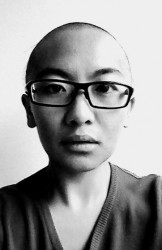 Lia Incognita is a Shanghai-born, Melbourne-based cultural critic, media maker and poet- provocateur whose work has appeared in Peril, Overland, Metro, Going Down Swinging, Social Alternatives and Melbourne Poetry Map. Lia presents radio monthly for Queering the Air on 3CR Community Radio. www.lia-incognita.com
Lia Incognita is a Shanghai-born, Melbourne-based cultural critic, media maker and poet- provocateur whose work has appeared in Peril, Overland, Metro, Going Down Swinging, Social Alternatives and Melbourne Poetry Map. Lia presents radio monthly for Queering the Air on 3CR Community Radio. www.lia-incognita.com
toisan
toisan
the armies and opium cored you
you spat out your children
like fireworks, sparks scampering
they bright and travel far
far enough to fade out of sight
blowfish mouth deflated
spider babies kiting on silk thread
land them softly softly
so they swell & full up
six strange sheets of earth
to the crinkled edge
long there over indigo water
cold roiling broth, the sea
sometimes as heavy
as bolts of dye-dipped cloth
they bright and travel far
mass of black-haired heads
lacquer bleached cliffs
and sallow beaches
they wear pigtails and tax
your boys, left wives and children behind
or were children, ahead of their age
chasing faraway time that can turn
to gold, if it all pans out right
they bright and travel far
tattoo steel scars right across
cut down carved up country
for thieves to ride hoofless
and make more rapid plunder
toisan
call the ocean to you
bid it carry your song
tell them boys, slow slow walk
soft your feet on foreign soil
hold tight to each other and jŭ tóu
hao jiu bu jian jia
they long time no see home
April 27, 2014 / mascara / 0 Comments
 Toby Davidson is a West Australian poet, editor and reviewer now living in Sydney where he is an Australian Literature researcher at Macquarie University. He is the editor of Francis Webb Collected Poems (UWA Publishing ) and author of the critical study Christian Mysticism and Australian Poetry (Cambria Press). His debut poetry collection is Beast Language (Five Islands Press).
Toby Davidson is a West Australian poet, editor and reviewer now living in Sydney where he is an Australian Literature researcher at Macquarie University. He is the editor of Francis Webb Collected Poems (UWA Publishing ) and author of the critical study Christian Mysticism and Australian Poetry (Cambria Press). His debut poetry collection is Beast Language (Five Islands Press).
Scant
She walks barefoot in the cut and rush,
she’s learned to walk, remind
through people, barefoot,
as they walk through people,
bared and fooled behind.
In each case, feet set the story:
riven skin on luckless bone,
she feels each sole in the tug of another,
a dance to the sound
that calls the steps home.
Pivots scum. Staccato, stiletto,
the well-heeled lunch crowd
snakes a cracked whip;
upper crusts scolding, flashing around
her hearing back, tough underneath.
Today is not to be pocket dialled
or tired, touching base in the lifts.
She prays and she presses,
divines the right path.
Serious. Consumed. Everlasting.
Epilogue and Origin
Agate and filmy stellate crusts like the first amphibian
(yours too), speculating itself clear of nightfall’s
pounding ossuary . . . I was or wasn’t around, Half-Planet,
depths and folds we mustn’t know; if the tall are prone
disentangle them completely from each trident-shaped
break from homing. Above the New Hebrides Trench,
wisps less laughable than firmament close out furrowed
roughcut paper in photonegative, grain through the gloom.
Before a Hawai’i I never see, netting or losing a day is direction,
instrumental in a desert of cloud (and deserts of continents
are each a Pacific). Your calendared hermaphrodite rides
sidesaddle crying wingtip light at the wonkiest point
of our tumbling cage; one bar loose to squint again, off,
at the cold diversion of a monocled Greenwich who calls
himself prime down your full turning back.
April 24, 2014 / mascara / 0 Comments
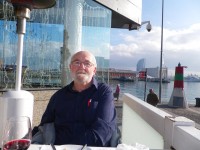 Ron Pretty’s eighth book of poetry, What the Afternoon Knows, was published in 2013. An updated edition of Creating Poetry will be published later this year. He spent six months in Rome in 2012, on a residency granted by the Australia Council.
Ron Pretty’s eighth book of poetry, What the Afternoon Knows, was published in 2013. An updated edition of Creating Poetry will be published later this year. He spent six months in Rome in 2012, on a residency granted by the Australia Council.
Translation
She could not speak to her mother
when they met. She had just turned
twenty one, but had never seen this
small dark woman until then, except
in photos. Harris sat beside her, his smile
inviting them to break the silence.
He would translate, he said, if only
they had something to say. Mother and
daughter looked at one another, tears
on their cheeks. Tell her, she said to Harris,
tell her I did not know where she’d gone,
which country she went to. I used to
watch the planes fly over, she said,
and wonder where they were going,
and if she was on them. Alana
– for that was the daughter’s name –
reached out to her without a word.
She took her hand. Visanthi,
the mother said, that was your name.
And still it is, the daughter cried.
Tell her, she said through her tears,
tell her that’s what it is. Star sapphires
falling as tears, and a second mother,
in her pale silence watching
Alana Visanthi there in that room,
Sri Lankan sun streaming in where
mother and daughter are holding hands
having no language except its loss.
Dreams
Krystel said, I am happy with my mother,
my family here; I have no need to go
seeking for that distant other on that island
I have no wish to see. You do not feel
there’s something missing, her lover asks,
his pale hand caressing her straight black hair.
A long time ago her infant self was flown
out of penury into suburban class.
She’s never been back to see the village
she was plucked from; she loves her parents
who brought her home, happy they’d never
have to face again the heat, the beggars
on every corner, the guns at every checkpoint.
This is my home, she tells him, I have no other.
She will not tell him how she dreams, some nights,
of elephants wading a stream, a road side stall
selling papaya flecked with lemon, a cripple
begging under a figtree. The dreams recur,
but she has decided her life is here; she wants
only her mother and a lover who holds her
in his strong white arms as he kisses
and kisses again the warm dark skin of her face.
April 19, 2014 / mascara / 0 Comments
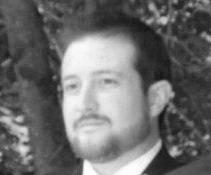 William Byrne is a South Australian poet in his twenties. He has always lived in rural and coastal townships, excluding an urban interlude for university study for degrees in architecture and design.
William Byrne is a South Australian poet in his twenties. He has always lived in rural and coastal townships, excluding an urban interlude for university study for degrees in architecture and design.
Aspergers
Water dries so fast
on my fore and index fingers
once I leave the chiesa,
that foreign place of incensed marble.
It evaporates
as soon as I see the sun
and basking in it, the smooth shoulders
of the lane’s cobblestones. I trip
in my penance, later, while seated
in the brassed café
as my lips part for vermouth.
Again I see Rome’s dark shoulders
then her leather heels and passing souls,
then half smoked cicca,
their pale ghosts hanging in the streets,
then smooth, tanned Roman fingers.
Chiesa water dries so fast on my fingers.
The vermouth is also dry.
Wheat
In my old car, tyres wet, we spoke
black over green like a Rothko painting,
the young crops startled in our headlamps,
their fronds thrashing in the yellow glow.
You too were startled when I turned the headlamps off,
even though we had pulled up aside the field.
The lamps were deadened, yet the radio hailed
in a distant AM. Ice crystals formed on the window,
shading thinly the edge of the screen.
Beyond the glass, grey clouds brushed past the moon
rising on the curved horizon beyond
wheat past further than sight from two sets of eyes could see.
Afterwards, we drove to a town
at the edge of the wheat, leaving the earth
on the side of the road where we parked
a dry-ish print framed in rain craters
and shallow puddles bleeding into its soft sides.
We laughed so hard that night as we spoke and tried to see.
April 17, 2014 / mascara / 0 Comments
 Hazel Smith is a research professor in the Writing and Society Research Centre at the University of Western Sydney. She is author of The Writing Experiment: strategies for innovative creative writing, Allen and Unwin, 2005 and Hyperscapes in the Poetry of Frank O’Hara: difference, homosexuality, topography, Liverpool University Press, 2000. She is co-author of Improvisation, Hypermedia And The Arts Since 1945, Harwood Academic, 1997 and co-editor with Roger Dean of Practice-led Research, Research-led Practice in the Creative Arts, Edinburgh University Press, 2009. She is co-editor with Roger Dean of soundsRite, a journal of new media writing and sound, based at the University of Western Sydney.
Hazel Smith is a research professor in the Writing and Society Research Centre at the University of Western Sydney. She is author of The Writing Experiment: strategies for innovative creative writing, Allen and Unwin, 2005 and Hyperscapes in the Poetry of Frank O’Hara: difference, homosexuality, topography, Liverpool University Press, 2000. She is co-author of Improvisation, Hypermedia And The Arts Since 1945, Harwood Academic, 1997 and co-editor with Roger Dean of Practice-led Research, Research-led Practice in the Creative Arts, Edinburgh University Press, 2009. She is co-editor with Roger Dean of soundsRite, a journal of new media writing and sound, based at the University of Western Sydney.
Hazel is a poet, performer and new media artist, and has published three volumes of poetry, three CDs of performance work and numerous multimedia works. Her latest volume of poetry, with accompanying CD Rom, is The Erotics of Geography: poetry, performance texts, new media works, Tinfish Press, Kaneohe, Hawaii, 2008. She is a member of austraLYSIS, the sound and intermedia arts group, and has performed her work extensively in US, Europe, UK and Australasia. She also had a previous career as a professional violinist. Her website is at www.australysis.com
Smoked mirrors
AJP Taylor thought Dylan Thomas was a charlatan because he replaced simpler
words with obscure ones. But then Dylan was his wife’s lover.
Technique, like misunderstanding, holds it head high, accused of decapitation.
Just as I think I will never hook an idea, that I will have to give the commission
money back, just as I have signed off, I know I will never write again, the surrender
of hope flames the messenger.
My father was a chain smoker and would light one cigarette with another. But he had
a cacophonous smoker’s cough. Its assault began in the morning, once he
started he couldn’t stop. Then one day he decides he’s giving up. Just like that. He never
smokes another cigarette again but the cough remains, every day that demented coughing.
Who is that young man my mother says, pointing to my father in a photograph. He’s
very handsome, as if adjudicating a stranger.
Perhaps she is slowly passing away the doctor says in her hearing. She is asleep but
her ears are twitching.
Meanwhile I decisively hit the keys and dispose of an ailing poem. But
the dead persist in listening, sometimes more carefully than the living.
Afterwards I spoke to my sister, who said that the doctor seemed a bit of an idiot.
SnowTalk
the seasons are talking to each other
we pick orchids in the snow
as if the world’s thermostat
was programmed for cross-weathering
fairylights frame the Hindu temple
shops sell gift-wrapped buddhas
they gorge themselves on Christmas day
then purge at Ramadan
did you know that snowflakes are irregular?
that words shiver when they boil?
as the white wind fills its tiny lungs
it hears black trumpets blowing
shall we rewrite the brothers Grimm
so Snow White is mottle-skinned?
the reindeer is exhausted
the sun burns up the sludge
April 17, 2014 / mascara / 0 Comments
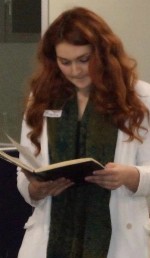 Dimitra has a Bachelor of Performance Studies from the University of Western Sydney – Theatre Nepean, and a Master of Letters in Creative Writing from University of Sydney. She’s had poems published in Australian Poetry’s Members’ Anthology, Meanjin, and Southerly. In 2012 she won the Australian Society of Author’s Ray Koppe Young Writers Residency.
Dimitra has a Bachelor of Performance Studies from the University of Western Sydney – Theatre Nepean, and a Master of Letters in Creative Writing from University of Sydney. She’s had poems published in Australian Poetry’s Members’ Anthology, Meanjin, and Southerly. In 2012 she won the Australian Society of Author’s Ray Koppe Young Writers Residency.
Station
After I’ve spent the night being someone else, and going home –
wriggling out of that alien face like an old skin – I like to walk
all the way to the end of the platform. You know, how it tapers
to that thin wharf of concrete? With the one fluorescent light
on its high pole, and the sign that says, Staff Only Beyond This Point.
From here, you can just make out the glitter of the next station.
At this time, no-one will walk the distance through the dark to get here –
the platform’s lights are sparse, dull beads on the night’s chain.
Across the tracks the fence hangs slackly, a gaping jaw. Stillness
clings to everything like frost. A woman’s laugh, the clink
of glasses – the city’s noises are padded here; a siren wails
like a half-asleep child. Then a whip of wire, a spring-loaded lash.
The train pulls up, groaning in its metal.
Sun
It’s dusk, and I’m listening to an old
Indian devotional, the woman’s voice is a coil
of plum honey. As the sun slips down the empty
western sky, the tiles of houses are silvered
in light. At some angles the sun
is forked by newly budded branches. I’ve stared too long
at its gold-lash pinwheel, the quills of starfire.
When I turn my gaze away, its brightness clings
to my pupils, and I think: she’s singing about love.
Her voice winds, and slides, and slips upwards,
and falls, honeycombing through the notes.
But it’s the sun she’s singing about, waking the buds
with white fire, hard as crystal.
December 2, 2013 / mascara / 0 Comments

Richard James Allen is a poet, choreographer and filmmaker. His books include the critically lauded The Kamikaze Mind (Brandl & Schlesinger) and the NSW Premier’s Literary Award-nominated Thursday’s Fictions (Five Island Press).
His forthcoming collection Fixing the Broken Nightingale will be published by Flying Island Books, an imprint of ASM (Macau) and Cerberus Press (Markwell, NSW).
The Optics of Relationship, or
With this Poem I Thee Wed
For Chee and Stephen
Who I was in the past,
Who I will be in the future –
What distractions these are
From who I am now.
Who I am now,
Here, with you.
In this moment,
You have rewritten my past.
You are rewriting my future.
What I don’t understand about
Who I was or will be
Doesn’t matter now.
Whoever that is
– As we stand before the shimmering altar
Of the unfolding lights of our lives –
I know that we will find out together.
Because this is what a marriage is,
This is the optics of relationship,
The coming into focus of two lives.
The Secret Language of Border Guards and Those Who Wish To Cross
1. The Secret Language of Border Guards
What we dream we might say to each other,
if the roadblocks all came down
and the checkpoints disappeared.
If our language were not a secret one
we might share it with you.
If we had not already given up
on your ability to hear,
we might open our mouths
and allow that magic expectant
breath we
all share
in and then eventually out
with some words for you.
If we had any faith left
in your capacity to listen, to think, and,
on such basis,
to act,
we might hope
for you to understand.
But you give us no reason
to believe.
Faith starts
with small things.
2. The Secret Language of Those Who Wish To Cross
Do not speak to us of faith.
Faith lingers like smoke, drifting
through the rubble you have left
of our homes and our children.
But deep below, nestled
like burnt seeds in the soil,
the embers of the fires
you have planted fester.
We do not dream,
we glow.
Even if the roadblocks all come down
and the checkpoints disappear,
the road between us will never be open.
December 2, 2013 / mascara / 0 Comments
Carolyn Gerrish is a Sydney poet. She has published five collections of poetry, most recently The View from the Moon (Island Press, 2011). She runs creative writing workshops in the community and at WEA adult learning. She is currently working on her sixth collection and hopes that one day satirical writing will save the world.
War of Nerves
sometimes the feeling nothing can harm you
the dizziness of freedom where anxiety’s
a useless passion & there’s no vigil waiting
for the end to begin you’ve lost the fear
life could just haemorrhage away or that the
mobile phone tower could morph into a Transformer
& ruin the suburb & there’s plucky Bette Davis
who after receiving a negative prognosis from
the handsome doctor claims I’m young & strong &
nothing can touch me
every exit
is an entry
somewhere else
but why are there so many security guards at the
Mall then there’s the worry of wrong weather
(this year summer was autumn) & those nimbus clouds
painters’ inspiration or evidence of Apocalypse
& that shadow just resting on the road becomes a
suspected portent & please note the asteroid
passing by us if we collide could certainly
take out a medium-sized continent so with
Armageddon averted for now one antagonist
is missing but the 24 hour news cycle never
stops as a rogue Afghan soldier kills
Australian troops
the disaster
takes care
of everything
Ground Zero
the omniscient narrator peers down the air
stoic rather than heroic no ignorant armies
(that) clash by night & Stendahl would find
nothing to swoon about it’s just a mess of stuff
detritus of the city’s zeitgeist & are these
your pets? dogs? camels? a baby in a backpack
on the way to Kindergarten Adventure Travel &
objects Jung would love to discuss a key for
no particular door residences are generic here
a torch to search for your neglected self a
globe of he world beginning to shatter after
ignoring all the warnings a lady’s hat housing
no skull & sheep & goats wander the street & he
shall set the sheep on his right hand but the
goats on the left a decaying apple brain in
cognitive decline when I am dead & doctors know
not why a life-size doll with attitude & paint
brushes that achieve an extinguished palette
but unfolding unfolding as being emerges
from concealment
After Rita Lazauskas, View from the Ramparts # 5
(drawing in charcoal, gesso, conte)
December 1, 2013 / mascara / 0 Comments
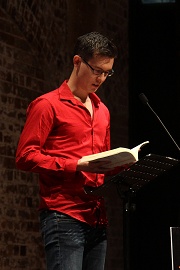
A J Carruthers is a PhD candidate at the University of Sydney and the author of The Tulip Beds ( Vagabond, 2013).
His work appears in Southerly, Cordite and Contemporary Asian Australian Poets.
Three Pathemes
patheme no. 7 (inverted bouquet)
by blind metonymy line (nonlinear &
horizontal) cuts flower, goes straight
thruit. curious about that stand – on the
same ground as it were – as the
inverted bouquet, as hard as it is to
imag | rays crossed ast a corresp | ine |
onding points of, quite easily, a sound
-box – sound-box possibly invocatory
patheme no. 18 (two mirrors)
you & I? don’t fool (us)! spherically
combine inadequates the correct feeling
| “I’ll have none of reality, thanks!” |
the subject’s on the edge of the mirror,
so this mightn’t end well. VS, that’s
you, code for virtual subject captured
from a young age in the secret contours
of an actual mirror
patheme no. 19 (simplified schema)
if you’re not sure just give me depth
psychology. can’t be on this see-saw
of desire forever! colorless green
ideas slip fervently read as careless
musicians sleep forever | “I read among
my disordered books” (Yü Hsüan-chi)
| let us be quite plane: your whole life
will unfold in O . . . . . and in O’
November 26, 2013 / mascara / 0 Comments
 Christopher Pollnitz’s Little Eagle and Other Poems was a Wagtail publication in 2010, and his six “American Idylls” were in Mascara 11. He has written criticism of Judith Wright, Les Murray, Alan Wearne and John Scott, as well as D. H. Lawrence, and been a reviewer for Notes and Queries and Scripsi, as well as The Australian and Sydney Morning Herald. His edition of The Poems for the Cambridge University Press series of Lawrence’s Works appeared in 2013.
Christopher Pollnitz’s Little Eagle and Other Poems was a Wagtail publication in 2010, and his six “American Idylls” were in Mascara 11. He has written criticism of Judith Wright, Les Murray, Alan Wearne and John Scott, as well as D. H. Lawrence, and been a reviewer for Notes and Queries and Scripsi, as well as The Australian and Sydney Morning Herald. His edition of The Poems for the Cambridge University Press series of Lawrence’s Works appeared in 2013.
Satin bower bird
He is playing, he is amusing himself. But what is he playing? We need not
watch long before we can explain it: he is playing at being a waiter . . .
Sartre
Black Prince of the undergrowth, to me his crackle
and hiss seem off-station, but you and he have a
thing together. As I finish each two litres
of juice, you put the lids out in the garden
and your pretty boy comes again and again carrying
awkwardly off in his beak the royal blue baubles.
So intense, so intellectual. I see him sitting
at a sidewalk café, trading Gitanes and banter
with Jean-Paul and Albert, him in lustrous leather
while Simone looks on askance from another table
or eavesdrops for news of post-existentialism
and clues on how to pick up. Smoke and mirrors . . .
It doesn’t do it for him, the bum-fuss and fluster
of hens flouncing in their pastels. Deep in his bower
blue-lit from below, magnified by his comb, I imagine
him preening, and know who it is he preens for
—him with his satin cloak and his rod of amber
his necromancy and his dark effulgence.
Subterranean cool that burns out—is this what maleness
amounts to? Brilliant fencer, prince, philosopher
or Freddie Mercury? Noting the uncollected
lids, you say He’s moved on, disappointed
but not surprised. You’ve other things to get on with
while I rack my brains conjuring up some witticism.
Kookaburra
Quem deus vult perdere, dementat prius.
Anon.
Whom the gods would destroy, they say, but isn’t it rather
since the gods are mad, their devotees drive them crazy?
That one at the barbecue, proper clever feller
left the bread roll in your hand, still with the sauce on
and stole the fire for his people, as well as the sausage.
And now this one, time and again dive-bombing
in the kitchen window his own adolescent image
—demented. We worry about him and the damage.
We tape up tabloids over the glass to distract him
but still he comes, kamikaze seeking his crystal.
One day it’s different, he approaches his rival close-up,
childish anger morphing to inquisitiveness.
You tell me I should speak to him more nicely
but my every word is laced with the mordant satire
reserved for watchers of reality television
or addicts of cooking shows who are just as stupid.
“Look here,” I say, making a chicken sandwich.
“This bird came in yesterday. His name was Hansel.”
Unperturbed he inspects the preparation bench and oven
—he doesn’t tweet but his eyes are bright with banter.
He peers in like Satan at this weird domestic Eden
little realising in his innocence what he’s seeing.
But hang on, if he’s innocent I’m the serpent
long, lithe and upright to his stocky Adam
and remembering how a kookaburra tackles
a six-foot common brown (a good yard dangling
each side of the beak, snake head a bloody tulip)
that gaze could terrify. No, no, forget it
—he’s a creepy bird, but he’s a bird for all that.
Comes another day, another stage of intimacy
—beak to the pane, and perched on the ledge of the window.
When I move towards him, he cranes even closer
when I step away, he edges back. Is he seeing
me in himself, outlined in his own reflection
Or is he seeing the greater Self ascending
to Nothingness with the ghostly Kooka Spirit?
I put the knife down, I fidget about the glasshouse
of my insecurities, my every move filled with
self-consciousness and loathing. I can’t bear his devotion,
he gives me the creeps, he gives me the creeps absolutely.
On the third day, you blow him a kiss through the window.
He pecks the pane and is off, to join the bush chorus.
He’s growing up perhaps, losing his religion.
White-bellied sea eagle
of ryal egle myghte I telle the tale,
That with his sharpe lok perseth the sunne,
And ys the tiraunt of the foules smale.
Chaucer
The Little Wobby eagle in my father’s death year
I remember like an incandescence burning
to burst from casuarina darkness, trawl the river
then flip back, and up again, with a wasp-like talon.
Had I been another Christopher I might have adopted
that estuarial Hawkesbury bird for symbol,
although, in hindsight, I’d rather take the little
smouldering wicks of the she-oak for my image
for there’s another candle that can light me:
us in the car park, the great swoop of coastline southwards;
their beaks like butcher’s hooks, gannet after gannet
mindlessly crashing into the cup of sorrows
that suddenly empties, as the eagle pulse-glide-pulses
overhead of all; and you in the car repeating
details of your friend’s cancer prognosis. All I could think of
was getting away overseas on leave and a conference;
and you—would she still be here on our homecoming?
Reviewing, Promethean eagle, your outstretched scalpel
drawn over the grey breasts and belly of the waters
I don’t yield much to my fear of you, nor do I take much
heart from your liverish victim. Given pharmacological
aid I can dispense with a demigod’s foreknowledge
(or doctor’s) of what I can endure for what duration.
Now it’s dementia I fear, particular losses
of others, and having no busy mind to distract me.
November 26, 2013 / mascara / 0 Comments
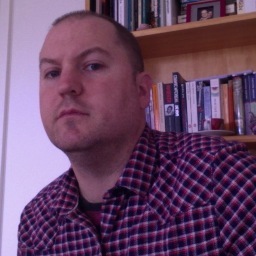 Benjamin Dodds is a Sydney-based poet whose work appears in a variety of journals and magazines. Two fun factoids: (1) Benjamin collects Mickey Mouse watches, and (2) his first collection, Regulator, will be published by Puncher & Wattmann in early 2014.
Benjamin Dodds is a Sydney-based poet whose work appears in a variety of journals and magazines. Two fun factoids: (1) Benjamin collects Mickey Mouse watches, and (2) his first collection, Regulator, will be published by Puncher & Wattmann in early 2014.
Unsheathed
Split up the back like dirty
slips, the ghostly cases
stand unmoving in the heat.
They mark the places from which
these prawn-eyed death-rattlers
have lifted themselves
on broad leadlight blades into
summer’s ripening dryness.
A far-off version of
me holds one up close,
Yorick-style.
The alien skin balances on
up-turned palm, primed
to catch even the slightest breath of breeze.
It’s hard not to wonder
just how it might feel to peel oneself
from within a congealing shroud,
to leave a pair of crystal domes
where obsidian eyes
once nested
unblinking.
November 21, 2013 / mascara / 0 Comments
 Chandramohan.S is an Indian English poet/writer/social activist based in Kerala,India. His writings deal with the social struggles of marginalized identities of the world. His work has appeared in New Asia Writes.
Chandramohan.S is an Indian English poet/writer/social activist based in Kerala,India. His writings deal with the social struggles of marginalized identities of the world. His work has appeared in New Asia Writes.
Crimson stains of caste honour
Gayathri Chatterjee
Gayathri Mishra
Gayathri Iyer
legacies of lineage
safely armoured
between her legs
forbidding her
to run
to climb trees
sit with legs spread.
eyes and ears of endogamic gaze
check out the gait,
eavesdrop on pissing sound decibels
to be attenuated by wifely docility,
keep the caste hymen intact
to be bartered away in yellow metal brokered weddings
bridal crimson stains of honour
dried and preserved to adorn the flags hoisted at caste rallies.
Lynched God
Purged from the annals of history
vestiges being excavated of fallen, broken, desecrated idols
entombed in violent memorials like Pokhran-II.
Tales of a great soul
lost in translation
from Pali to Sanskrit
scores of viharas
spiritually usurped
by vedic hymns.
Bullets from saffron terrorists
burned Bamiyans holes
in pages of medieval Indian history
tales of the vanquished race
erased from the fables agreed upon.
People of our race seek refuge,
in a lankan island,
like Chiang Kai Shek’s defeated army in Taiwan.
He used to meditate in
three posters
Padmasana, Abhaya, bhumisparsa
but before lynching
he lined up to the guillotine in Pranama posture.
He descended down
into the collective conscience of a
society as just one of the zillions of deities
without a capital first letter
India has become Brobdingnag for him,
the miniature Gulliver among saffron gods and goddesses.
In Malaysia
he occasionally gets his due
in a giant prostate deity
as giant Gulliver in the land of Lilliput.
His autobiography
diluted
divided deviated now sold as saffron history textbooks twice born editor refused to acknowledging the ghost writer.
First global Indian
almost has an NRI status now.
Beads around the bosoms
A chain of beads
around the bare breasts of our eves
a grim reminder
of the lynching of our god
November 21, 2013 / mascara / 0 Comments
 Linda Weste is a writer, researcher, reviewer, editor, and teacher of creative writing whose poems have been published in Best Australian Poetry UQP, and academic journals such as Westerly. Her second verse novel, an historical fiction for young adults, in progress, is based on the lives of German – Australians during wartime, and set in 1940s Melbourne.
Linda Weste is a writer, researcher, reviewer, editor, and teacher of creative writing whose poems have been published in Best Australian Poetry UQP, and academic journals such as Westerly. Her second verse novel, an historical fiction for young adults, in progress, is based on the lives of German – Australians during wartime, and set in 1940s Melbourne.
Revelation
As I enter the exedra, Clodius waves a papyrus scroll:
‘It’s from Cicero to Atticus!’
His flapping hand beckons me to the space
Next to him: our ritual meeting place
On the fish pond’s rim
Clodius’ turn to read:
Like a nervous quail, his head bobs over every word.
He leans toward me, eyebrow raised:
‘Well, well, well.’
I try to peer around the mound
of his fleshy hands, but he stands and skitters off
Like a lizard caught napping on the sunlit paving stones
‘Ha!’ he guffaws,
and fixes me in his gaze:
‘Well, well, well.’
His face beams,
‘Aren’t you fanning his flames!’
I snatch the letter.
‘If Cicero only knew it was you, Clodia,
scrawling epigrams here and there,
Amusing all and sundry,
Making him the laughing stock of Rome …
… He’d regret slighting you
with that impertinent term,
Poetria!’
I’ve read enough:
Contemptuously I let the sprung cylinder recoil
To the marble floor
Where it drum-rolls its own significance
Intercepted Letter from Cicero: Soft target
‘I hope you’ve got thirsty ears!’
Clodius calls
over the fountain’s gentle pulse.
He strolls through the exedra towards me,
a papyrus half-unrolled in his hand;
it wilfully trails over spring blooms
inciting rise from a siesta of flies
He props a sandalled foot on the pond’s rim.
Strong; striking; ardent: Ehi tó chárisma, I smile to myself:
With his wild black mane; his long proud nose
Indeed the gods have graced him
Clodius strikes a pose I recognise: Cicero in oratory:
He thrusts out a shortened neck; winks at me,
‘Cicero needs
a thor-ough-ly
trust-worthy
mess-en-ger …
I can’t im-a-gine
why?’
Tears of laughter pool in my eyes
He’s mastered the nasally twang, the odious tone:
‘Of course …’ Clodius begins to read,
‘He wouldn’t want his letters
such as they are …
… to get into
a strang-er’s hands.
So he won’t write in his own name …
Or use his seal …
And he plans to invoke some
se-cret
code …
He’ll call
him-self,
Lae-lius,
and
Att-icus,
Fu-rius.’
Laughter ends the pillory.
Clodius loses his composure,
collapses next to me on the pond’s rim.
A chorus takes over with perfect timing:
Like Subura gossips, loquatious sparrows dash to this spot and that,
trills teeming through the jasmine filled air;
Heads together wings a-quiver beneath the hemp net.
November 21, 2013 / mascara / 0 Comments
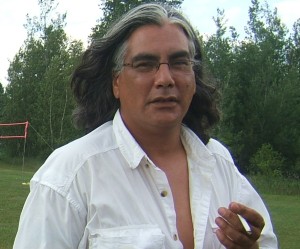
David Groulx was raised in Northern Ontario. He is proud of his Aboriginal roots – his mother is Ojibwe Indian and his father French Canadian. His 7th book of poetry, These Threads Become A Thinner Light is due out in the spring of 2014 David’s poetry has appeared in over a 150 publications in 14 countries. He lives in Ottawa, Canada
A past between us
White Canadians feel guilt
about what happened to the Indians
Indians feel shame about their condition
In this way there can only be
sadness between them
Higher intelligence
We are so smart
we’ve learned how to
melt the great ice
above and below the world
to flood it again
and rid it of ourselves
Indian giving
Canada gave the Indians religion
because it was cheaper
then giving them an education
Canada gave the Indians reserves
because it was cheaper
then killing them
Canada gave the Indians pails
because it was cheaper
then giving them clean water
Canada treats the Indians inhumane
because it believes
Indians are not human
November 21, 2013 / mascara / 0 Comments
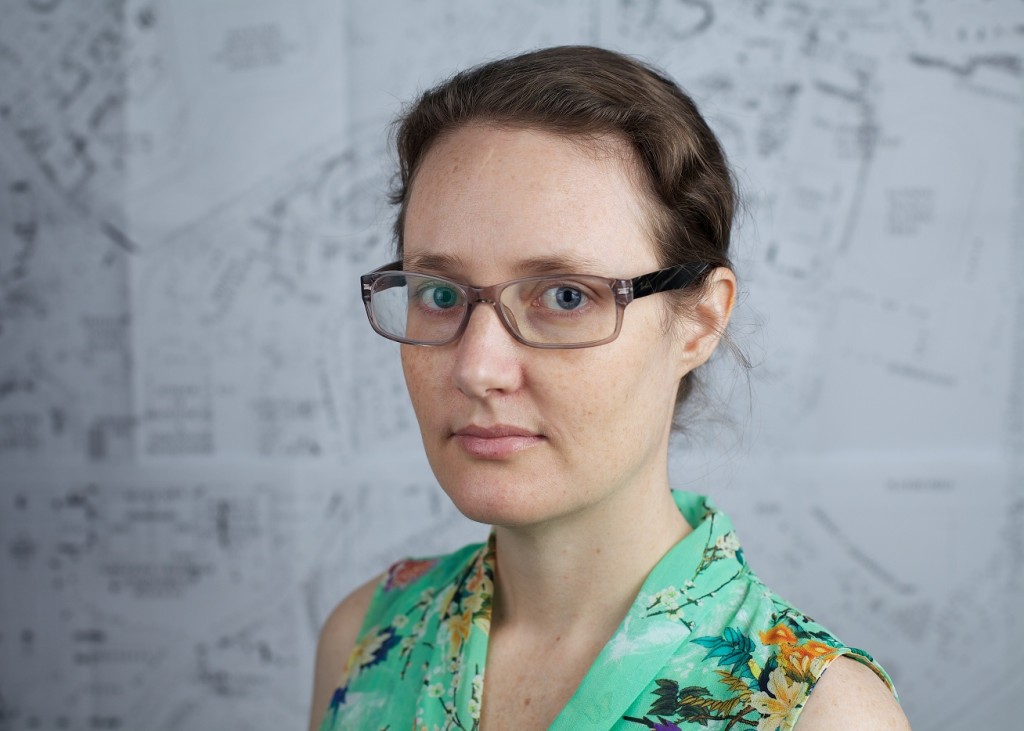 Jen Crawford is a New Zealand poet who coordinates the Creative Writing Programme at Nanyang Technological University, Singapore. Her poetry collections include Bad Appendix, Pop Riveter and Napoleon Swings. New work can be found in Axon 5, Brief 49 and Shearsman 95 & 96.
Jen Crawford is a New Zealand poet who coordinates the Creative Writing Programme at Nanyang Technological University, Singapore. Her poetry collections include Bad Appendix, Pop Riveter and Napoleon Swings. New work can be found in Axon 5, Brief 49 and Shearsman 95 & 96.
citronella
when dalliance returns, the one after the other, dallying
while dallying who’ll
for the token a night gathers pools
pool a woman carrying children into
citronella gathers to its pools a whistle, sailing
night arrow across the track’s prepared
burnishment absorbing the election’s
sweat through to the presidential election’s absorbing
the porous rubber collects,
radio interns a racetrack, pinned
inhaling a sterile water,
in ballooning and extinguishing colonies evenly
making a sugar-burn esophagus crackle
like chlorine; like forest fire like chlorine.
forest fire.
breath pools. chlorine cohabits
in a form of indonesia through the opening vessel.
fires for the palm through the opening
to the cordial, flicking cards
at snapping light. the horses rear
crackling mosquitoes. and should they
go round mosquito death too.
or around the light oneoneone two.
a tempo (implicit memory)
these two silk birds are frayed and then it touches them. these two
frayed silk birds. into the river diving and emerging. one such silk
is a cracked river stone and this is the surface of its silk, the green
surface of its time in that silk time, its water. you could cut your foot
on that accurate division. if you weren’t aware. you could lay
your hand on it and feel the sharpness aware in your hand.
these silk birds come down from the leaves of the grey way up
on the edge of the cliff, they come down to the water to drink. they
fly past the roots that break the cliff and through the stone cuts water.
absolutely slowly and too fast to see. so holds acceleration in array.
where when the riverbed bares its posture and then softens, there
go into the memory of water, into the likely inclination of future
water. and these forms will get undone. by their full registration
of pressure, heat and sound. into holding together, into dry and
adrift. the dive is whole into each particle, held or adrift.
November 16, 2013 / mascara / 0 Comments
Earl Livings has published poetry around Australia and also in Britain, Canada, the USA, and Germany. He holds a PhD in Creative Writing and coordinates the Professional Writing & Editing course at Box Hill Institute, Victoria. He is also the editor of Divan(www.bhtafe.edu.au/divan), Australia’s first all-Australian online poetry journal. Earl lives in Melbourne with his wife and is currently working on a novel and his next poetry collection.
Naming Instinct
Sligo, Ireland, August 2009
Not knowing its name, my being
On a far-flung island, its creatures
Known only by reputation,
I have no choice but to listen:
High-pitched chioo, chioo, chioo, or
Queeka, queeka, queeka, almost the sound
Of worn brakes jabbed to slow down,
Or a thin bronze staff tapped against oak
To call ancestors to dark clearings.
Not knowing what it looks like—
Midnight, the bird bounding
From one branch to the next,
Behind a maze of branches, calling
To mate, to mark territory, to state
Its own being-bliss—I imagine it
Brindled, slim-bodied, tawny-flecked neck,
Oil-gloss eyes that scan always,
Its red beak open, with each note
Chiming leaves and balmy air, all ears,
Etymologies of breath behind its eyes.
It knows nothing of thresholds.
Not knowing what to do next, I stop
Wondering, stop straining to charm the bird
And its rustling, moon-riddled tree,
Open gaze and hearing to whatever waits
Beyond the imprints and echoes of words,
The swing of breath and song, the poise.
November 13, 2013 / mascara / 0 Comments
Rachael Mead has been published in literary journals in Australia, Taiwan and Ireland and was shortlisted in this year’s Newcastle Poetry Prize. She was awarded Varuna’s 2011 Dorothy Hewett Flagship Fellowship for Poetry and her poetry collection, The Sixth Creek, has just been published by Picaro Press.
Driving through the mallee
We burrow beneath the heat blanket
attuned to the air conditioner’s unsteady wheeze
like the final breaths of an terminal friend.
Cupped in the shallow bowl of mallee
we speed past scraggled trees,
lean and desperate as pioneers.
Cockatoos, Caltex and St. Vinnies
prove the pretension of borders.
We drive the hours, each town
huddled around its silo.
The hay farmers’ vast stubble fields
lay bare the hard years
distilled to monosyllables:
Cut. Rake. Bale.
Muscles’ Song
The river grooves its slow meander
between cliff and forest,
cool and sweet as silty molasses.
Droplets fly in sunlit chandeliers.
We stroke. This is the day;
a meditation of movement,
infinity symbols
traced with every muscle.
The twin blades outline endless double loops
like fingering a string of prayer beads.
I am eye and arm,
falling into rhythms
dictated by the muscles’ song.
It’s a mix of languorous reaches
sculled slowly with a tail wind
or snags dodged with swift arms
aching skin to bone.
And just when you want
to inhale the pain and drown,
it comes.
Limbs click into automatic, pain drifts
disinterested as a pelican.
With each blade-splash
the sound of a soft kiss,
deeper into stillness
we stroke, we stroke.
November 13, 2013 / mascara / 0 Comments
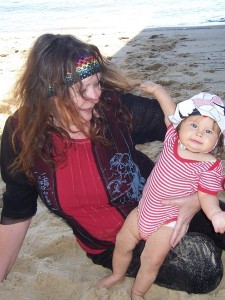
Jena Woodhouse’s publications include two poetry collections and a novel, Farming Ghosts (Ginninderra 2009). A collection of short stories, Dreams of Flight, is about to be published by Ginninderra.
Muswell Hill Road, London N10
It was a summer of high hopes –
of what, we weren’t entirely clear;
it was enough to be in London:
theatre, bookshops, pied-a-terre –
a good address to house-sit, owners’
prized possessions stowed upstairs.
We respected privacy
and primacy of others’ chattels,
but our son, who didn’t
understand exclusiveness,
would steal up to the absent
children’s nursery, spend hours there,
a toy he’d found clutched in his hands,
delighting his small grip.
There was a sense of people we
should meet, but somehow never did;
Highgate Cemetery close by –
Karl Marx, angels, Lizzie Siddal,
lately joined by Alexander
Litvinenko’s lead-lined casket.
Opposite, the dim green dolour
known as Highgate Wood
wove its late-Victorian trance,
reeking of untimely ends:
oaks decked with garlands, messages
from friends lamenting early deaths
in this last remnant of the ancient
forest realm of Middlesex.
A melancholy bubble waits to rise,
to take me by surprise;
I think of time’s attrition as a thief
that skulks beneath my bed.
Oh to be in England!
pipes a small voice in my head.
At her third attempt to access
inner elbow, hand, then wrist,
the pathologist draws blood.
The vein resists, then gives its best.
Birds for Evie
Arid spaces in me crave
paint in captivating shades:
saturated saffron, cyclamen,
alizarin; cinnamon and pomegranate,
fresh as cries of morning birds
in ancient lands; Armenia,
Uzbekistan, Iran…
I give Evie a flock of larks,
tinged with bright naïveté,
simple as the day, and artless
as a child who paints for joy;
but they are only semblances
of tin that rattle in the wind,
trinkets looped upon a string
that neither fly nor sing.
November 10, 2013 / mascara / 0 Comments
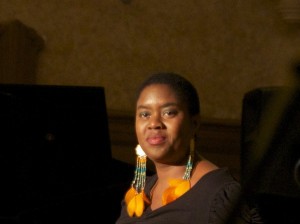 Maxine Beneba Clarke is a widely published Australian writer of Afro-Caribbean descent. Tim Minchin has called her work ‘amazing’. Overland literary journal says she’s ‘one of the most compelling voices in Australian poetry this decade’. Oz Conservative has lamented ‘…unappealing. Clarke’s views are the more dangerous ones’. It’s this last endorsement she wears afro-high. Maxine won the 2013 Premier’s Award for an Unpublished Manuscript for her debut short fiction collection Foreign Soil and the 2013 Ada Cambridge Poetry Prize for the poem nothing here needs fixing, the title poem to her forthcoming collection.
Maxine Beneba Clarke is a widely published Australian writer of Afro-Caribbean descent. Tim Minchin has called her work ‘amazing’. Overland literary journal says she’s ‘one of the most compelling voices in Australian poetry this decade’. Oz Conservative has lamented ‘…unappealing. Clarke’s views are the more dangerous ones’. It’s this last endorsement she wears afro-high. Maxine won the 2013 Premier’s Award for an Unpublished Manuscript for her debut short fiction collection Foreign Soil and the 2013 Ada Cambridge Poetry Prize for the poem nothing here needs fixing, the title poem to her forthcoming collection.
let alone
the one thing you never counted on
is how hard it is
to be a woman alone
let alone a black woman
alone with kids
let me alone
and get on with your business
how hard it is
to rent a house
in the neighbourhood of your child’s school
or get a job working
the hours you now need to
for five years you paid off joint plastic
and now that same bank manager
talks right through you
you have no ascertainable steady income
i am very sorry
we just can’t give a credit card to you
how hard it is
to get a break
or a loan
or a smile
or a hearing
or the real estate to repair
what so urgently needs mending
your child is the brightest boy in class
behaves besides
but now
they are always watching
waiting for him to slip
let my child alone
and get on with your business
a woman alone
let alone a black woman
alone with kids
the one thing you never counted on
was how hard
it is
November 9, 2013 / mascara / 0 Comments

Ann Ang’s poetry, fiction and non-fiction have appeared in Eclectica Magazine, the Quarterly Literary Review Singapore (QLRS), Poskod, Kartika Review, The Common and elsewhere. Her first collection of short stories, titled Bang My Car (Math Paper Press, 2012), was launched at the Singapore Writers’ Festival 2012. An avid birdwatcher, she is an educator at the Academy of Singapore Teachers.
Sister
Jie, you complain you are sixty,
but I’ll never beat you at being old.
In Primary Four, you were in Sec Two—
Taller, your studious silences like Sumatran haze.
You did my homework because it was right
to prove that my centre parting and fondness for kueh,
were really yours. Mama caned you
for having Pontianak-red nails.
That was a better kind of love.
You got angry, grew up into being beautiful.
Now people call you by your name.
Days pass the way we crack gingko nuts,
chalky cracked shell under bleeding nails:
you leaving the house keys, a new fridge.
My years were kernel and sap;
husband and children. Yours: a Mini Cooper,
a scarf and a tin of biscuits you returned,
dropping by for five minutes. “So much trouble,
give the kids eat. Singapore is so hot.”
“No one asked you, what,” you didn’t say.
So this is how we grow old together:
I’m wondering if you need spring cleaning,
more vitamins. Your left knee is gone;
you’ll die alone from leukaemia.
But I have grand-children.
The days filter through the rain trees,
hot humid light. You do nothing,
so time does not pass.
You say, “Don’t need, don’t bother,”
alone with the stories you believe about yourself.
November 9, 2013 / mascara / 0 Comments
 Kent MacCarter is a writer and editor in Melbourne. He’s the author of two poetry collections – In the Hungry Middle of Here (Transit Lounge, 2009) and Ribosome Spreadsheet (Picaro, 2011) – with a third, Sputnik’s Cousin, coming out in 2014. He is also editor of Joyful Strains: Making Australia Home (Affirm Press, 2013), a non-fiction collection of diasporic, essays from international authors now living, writing from Australia. MacCarter sits on the board of The Small Press Network and is active in Melbourne PEN. He is Managing Editor of Cordite Poetry Review. He was recently awarded a Fulbright Travel Award to read in Indonesia, promoting American literature.
Kent MacCarter is a writer and editor in Melbourne. He’s the author of two poetry collections – In the Hungry Middle of Here (Transit Lounge, 2009) and Ribosome Spreadsheet (Picaro, 2011) – with a third, Sputnik’s Cousin, coming out in 2014. He is also editor of Joyful Strains: Making Australia Home (Affirm Press, 2013), a non-fiction collection of diasporic, essays from international authors now living, writing from Australia. MacCarter sits on the board of The Small Press Network and is active in Melbourne PEN. He is Managing Editor of Cordite Poetry Review. He was recently awarded a Fulbright Travel Award to read in Indonesia, promoting American literature.
Howard Arkley on the Afternoon of 21 July 1999 with Fiona Hile
Flat-backed and drafting up the Hills
Hoist subdivides a blue into a bonkers purple
geodesic Yves Klein stubbed his cones and rods on
grade seven, oily spills, pleats the Shadows
carp how Boris Karloff won’t obey
them now in wide-screen video
and how green sees things in waves
like a woodchuck in a hurry and cyan’s
purées heavy-petting a potted dwarf
Mandarin. It’s a two kilometre sing-along
of colour that’ll detonate your Smurf
and pelt it down on postcodes with a pinch
of coltan in a laptop’s cell where MS Paint
and red square-dance with a Kumbaya of breeze and Juan
Davila’s been sprung fisting our box of Icy Poles again
tricky is the sherbet’s please, this golden brown
albeit one of tongue and recidivist patrols
so that even Spinoza as Spinoza-any-woman
couldn’t have counted on the head of a parricide
the firecracker limbs of Pacific tide bores,
palisading the facade out of his cerambycid beetle
Or is it when a woman loves it is with air of the universal
he said, indifferent bobcat sorting through broken self. Why
privilege the beautiful over the good when you can seize
up love as a way of retaining poetic language: drained radiator people
cars, flowers, plot the scope of geometric existence
while the old-fashioned crepuscular head of
you and green were already gone by that stage
Late Christmas Eve in Hyde Park, South Chicago
I expand behind my second level
window and unwrap a chitchat with an outside
squall of snowfall
accumulating on a pregnancy that’s growing still
and icily defeated on the alleyway
filled recycling bins of curse words incubate
with heat
Come ye all ye virgins!
Christ! I shout
into the endless bucket of a wintry dark
and toward a phrase of figures assuming shape
on tiptoed steps
up the tiny hours sprinkled all along my boulevard. And appearing from the narrow
daguerreotype of testament inclemency
float three Chinese
Kanji characters skating noiselessly and stiff along the sidewalk
delivering a late-night telegram to some address
they can’t decipher
yet or … Jesus H! … are those the silhouettes
of three intrepid bootstrapped mothers
pushing prams across a sheet
of December’s empty typing paper
at this late hour
curved and doubled over vehicles
in cursive fonts I do not follow
I cannot conceive. Why I compute
returning thirty years inside an outer space of three
hundred billion flakes of snowfall constellation and on a Scrabble board that waits
behind me … an abandoned match I wasn’t winning
warms the names of triplets tiled
out of order
some ancient blinking off-set printing press
an escalator up
or Sputnik’s cousin
tumbling wild its dormant locomotion
above a gravity
that’s rearranged to child
November 9, 2013 / mascara / 0 Comments
David Wong Hsien Ming was born in Singapore, discovered poetry as a child at a Sunday lunch and pursued honors in Philosophy at the University of Melbourne, reading poetry at Rutgers University New Brunswick along the way. His work has appeared in Quarterly Literary Review Singapore, Ceriph, Eye to the Telescope, Unshod Quills, Literary Orphans, and earned an Honorable Mention in Singapore’s Golden Point Award 2011.
To take care of your mother
Undo the woman before you—
go back beyond your youth
in fact go back into yourself,
pretend your unbirth
and her unpregnancy;
pretend the unbloom
of every bougain villea
in the family garden
and the unbloom of that first flower,
your father whom she found
half-grown and half-sated;
the first white workshirt
she scrubbed and poured softener over,
unwash that too;
unwash the lies and half-apologies
and the times you attempted
to use barbed words for reconciliation
until a thick stain spreads
to the utmost walls of the home
making it a blackbox
of broken dishes
and set-aside dreams,
of soft bolts of joy
and love so often tasting of pain;
make this blackbox of now, your life
—and meet her in her girlhood.
Chemo
It is night on your skin
where the needles swam.
Your body’s practiced betrayal
halves the venom’s speed today.
We have porridge for dinner again.
The swollen grain like flies’ eggs
hang together as we hang
together. I suppose in an older age
the eggs would have hatched and the maggots
would be weaning gratefully
on you, whom I kiss
with veils about my eyes.
The sheets that hold your sleep
ebb and flow and beg your case
to God who’s just about ready to—
look all I’m saying is
life does all the work
and we let death take all the credit.
November 9, 2013 / mascara / 0 Comments
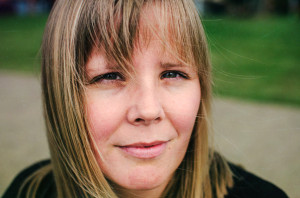 Maria Takolander is the author of a book of short stories, The Double (Text 2013), and two books of poems, Ghostly Subjects (Salt 2009) and The End of the World (Giramondo, forthcoming). She is a Senior Lecturer in Literary Studies and Creative Writing at Deakin University in Geelong, Victoria.
Maria Takolander is the author of a book of short stories, The Double (Text 2013), and two books of poems, Ghostly Subjects (Salt 2009) and The End of the World (Giramondo, forthcoming). She is a Senior Lecturer in Literary Studies and Creative Writing at Deakin University in Geelong, Victoria.
The Jimi Hendrix Experience
ENTER a man with six fingers on each hand
and an electric lady,
her blood bright as the moon’s.
Their son: fretting in a closet,
turning the psychedelic noise
of his drunken parents upside down.
1 brother and 2 sisters were born damaged,
blind and silent, so it is only him
—and another brother somewhere—
spellbound in the clamour of this hotel room.
ENTER the Sunburst Fender Stratocaster,
made for his father, with his plentiful digits.
The boy is lost in its violence.
Watch him: night after night, licking his woman,
his teeth, like pieces of noise,
raining onto the stage.
Back at the hotel there is red wine
and pills, white as amnesia.
EXIT the boy, into billowing silence,
only the fluorescent lights still brash.
Casino Royale
The sky let loose—not a good omen—when the hare went to visit the polar bears. The bears greeted him, blocking the doorway, their fur bristling, black noses dry and porous like ice. They stank of dead fish and urine. They turned their colossal backs to him, and the hare followed them into the room, shaking his sturdy ears and skittering rain. There was paisley carpet: brown with green eddies. The electric heater was on: a jittery orange glow. As usual there was a game going. At the table, draped with a crocheted cloth, was a horse, her back slumped with the ages, her eyes yellowed. Next to her was a moose with a scrap of fur missing from his snout. His antlers were brittle but intact. The drinking was being done from rank mugs. The ale was poured liberally.
The hare took a seat, picked with his teeth at a knotted mat of fur on his hind leg, and then was dealt in. He sifted through the picture cards in his paws. Table talk was forbidden. In any case the hare was thoroughly preoccupied. He felt a familiar hunger for his own droppings—and something else, he only now began to realise, like a secret longing for his own death.
Flick-snap. He was struck by a jester wielding a witchdoctor’s stick. The hare looked at the polar bear and at the stack on the doilied table. The bear’s eyes were impossibly still and dark. The hare drank and wiped the froth from his mouth. He eyed the hunched paw of the bear as it turned the final card. Flick-snap. A black weapon shaped, it seemed to the hare, just like a scythe. He had lost everything.
The hare turned to the horse, who had closed her eyes. ‘So, how about it?’ he said to her, urgently, quietly. The mare opened her lashed lids and turned her eyes upon him. She looked at him, he thought, with wist. Just then the neighbourhood dogs came careening into the room, wet as the day, carrying on at the world as if something had to be done about it. The game, the hare knew, was over.
November 9, 2013 / mascara / 0 Comments

Jordie Albiston has published seven poetry collections. Two of her books have been adapted for music-theatre, both enjoying seasons at the Sydney Opera House. Jordie’s work has won many awards, including the 2010 NSW Premier’s Prize. She lives in Melbourne.
I went to the shooter’s house pled shoot me
shoot me open my chest like an unread
book blast my colophon break my spine let
all my pages fly out look recto vers-
o I am a box & aimed a finger
right here at my heart there are poems in
there you can hear their din each tiny word
weighs a ton I-am-out-of-everything
baby needs air but don’t mind me reload
your gun your bullets will taste just like love
it is cold she walks to the corner vers-
o recto left right left turns the corner
thinks about karma wonders exactly
which stars are extinct she steps stops forgets
remembers the whole world is dead as a
door-nail shot while it blinked someone said
�
a white car has had all its windows smashed
in it wasn’t there yesterday marry
me? is written high in the sky lucky
I went out the back for a bit before
the words passed away today is Thursday
it is seven past three a warm wind moves
through the trees someone is crying I am
pleased to report the results of such del-
icate signs the driver may be dead the
girl say no but I think yes! & alive
the day peeked in I wasn’t home flying
with fishes swimming with birds driving my
car upside down tomorrow is coming
it says on the news I may or may not
be in it time is gone still it’s tricky
to tell this day is made up of minutes
November 9, 2013 / mascara / 0 Comments
Eileen Chong is a Sydney poet who was born in Singapore. In 2010 she won the Poets Union Youth Fellowship and was the Australian Poetry Fellow for 2011-2012. Her first collection of poems, Burning Rice, was published in the New Voices Series 2012 by Australian Poetry. The book was highly commended in the Anne Elder Award 2012 and was shortlisted for the Prime Minister’s Literary Awards 2013.
Noodles in Hong Kong
We’d walked downhill along Star Street
and emerged onto a version of Hong Kong
I finally remembered. Traffic, neon signs
and shopfronts like those from my childhood.
We squeezed into the single narrow aisle
of the tea room, locals staring at us outsized
outlanders. No one would share our table.
I had no Cantonese beside the usual ‘please’,
‘thank you’ and ‘I’m ok’. There were no pictures,
which meant we were in the right place.
Wonton mein, swallowing cloud noodles?
Brusque understanding. Two bowls slammed down,
steam rising from soup like early morning fog.
These were the best dumplings we’d had so far:
silken pastry encasing sweet prawns and crunchy
water chestnuts. Each mouthful of noodles
had just the right elasticity. The workmen had stopped
watching us; the news was on the TV in the corner.
We squinted and tried to make sense of the images:
a nuclear warhead, the Chinese flag, marching armies…
Three painters spilled through the door and sat
at our table. They looked hard at us and I smiled.
We finished our tea and paid for our meal. HKD110 –
a small price for perfect clouds with a hint of sesame.
Musician
The god of musicians has been trying
to get my attention. Last month, a man
on a street corner in Chinatown stopped me
with his playing. When he finished the song
I uttered a name: Ah Bing. He asked me where
I was from. How does a girl from Singapore know this?
In the Utzon annex of the Opera House
the cellist Wang Jian played Bach solos.
When the audience wanted more he spoke
of a blind street musician and played The Moon
Reflected in the Second Spring. That was the first time
I heard it. In the tunnel at Central Station
it surfaced again. The old man bowed away
at his two-stringed erhu and China swelled
like a mirage: bridges, moon gates, willows.
I emerged into the light and put on my sunglasses
to hide my moist eyes. Immortal Han, I thought,
don’t you only watch over flautists? There is no
Chinese god of writers, so I think of the Kitchen God
when I work. Sticky New Year cake. Sweet words.
November 9, 2013 / mascara / 0 Comments

Mike Ladd lives and writes in Adelaide. He produces Poetica each week on ABC Radio National. Mike’s most recent book is Karrawirra Parri: Walking the Torrens from Source to Sea published by Wakefield Press in 2012.
Gasoline Flowers
Mohamed Bouazizi,
wanting living space
and a little justice,
became an orange-yellow orchid
Tich Quang Duc,
a wavering lotus of flame
Palden Choetso – a smoky iris,
deadly bright at its centre.
For his land of snow
and a spinning prayer,
Tsering Tashi was a gaping petro hibiscus.
November 9, 2013 / mascara / 0 Comments

Elizabeth Allen is a Sydney poet and the events manager at Gleebooks. She is also the Associate Publisher at Vagabond Press. Her poetry has been published widely in Australian journals. She is the author of Forgetful Hands (Vagabond Press, 2005) and Body Language (Vagabond Press, 2012), which won the Anne Elder Award.
Winter Lilyfield
The mint and the rosemary
endure in the concrete backyard.
The star jasmine is taking over the
shed and the end of the clothesline
which is bare. A single sock lies
in the dead dried leaves and
a pair of lacy black underpants hang
off one of the succulent’s long spikes.
I can guess which flatmate they belong to.
The leaves are gathering in the corner
of our concrete backyard.
Lacy knickers
token of the summer dalliance
we wish we had.
Neighbourhood watch
Early one Saturday morning you watch
her as she shuts the door to her three
bedroom terrace & crosses the road,
highlighted for a moment in the sunshine.
She is wearing a red & white made590 skirt,
a black Witchery top with a blue plastic bird
brooch, Salt Water Sandals on her feet
& a hat made from a patchwork of recycled
vintage fabrics. She has a Monsterthreads
jumper over one arm & a tote bag with an owl
on it over the other & a KeepCup in her hand
(in your mind you can smell the coffee).
Some days she walks to the GoGet parked at the end
of the street. But today she appears to be walking
in the direction of the local organic produce markets
where she will no doubt buy carbon neutral food.
Sometimes you wonder what she is doing inside
her house: eating ash-coated goats cheese
on sourdough bread while listening to FBi radio,
or flicking through a magazine of new emerging
writers, or rewatching Mad Men? You think,
not for the first time, about how she would
be such a good character for a play: the wealthy
girl from the North Shore who makes her way
to the hipster wilds of the inner west & goes
no further, apart from occasional trips into
Marrickville for Pho or to Parramatta to visit
the one friend she has who lives out there;
how she would be so easy to write,
how it would be so easy to mock her
so much harder to take her seriously.
June 13, 2013 / mascara / 0 Comments
 Born on Wakka Wakka land at Barambah, which is now known as Cherbourg Aboriginal Reserve, Lionel Fogarty has travelled nationally and internationally presenting and performing his work. Since the seventies Lionel has been a prominent activist, poet writer and artist; a Murri spokesperson for Indigenous Rights in Australia and overseas. His poetry art work and oral presentation illustrates his linguistic uniqueness and overwhelming passion to re-territorialized Aboriginal language culture and meaning which speaks for Aboriginal people of Australia. In 2012 he received the Scalon prize for Connection Requital and his most recent collection is Mogwie Idan: Stories of the land (Vagabond)
Born on Wakka Wakka land at Barambah, which is now known as Cherbourg Aboriginal Reserve, Lionel Fogarty has travelled nationally and internationally presenting and performing his work. Since the seventies Lionel has been a prominent activist, poet writer and artist; a Murri spokesperson for Indigenous Rights in Australia and overseas. His poetry art work and oral presentation illustrates his linguistic uniqueness and overwhelming passion to re-territorialized Aboriginal language culture and meaning which speaks for Aboriginal people of Australia. In 2012 he received the Scalon prize for Connection Requital and his most recent collection is Mogwie Idan: Stories of the land (Vagabond)
Advance Those Asian An Pacific Writers Poets
As an murri writer pitch fee in carvings
Asian unity we need is most important
They are the beings on top of us an on the side of us.
At our arms is the Pacific of knowing
We need to unite for rights in all writing powers.
Our Asians are on our earth if we walk under the seabeds we sleep together
Think were there’s no sea the waves of our humanity is the same.
Most of this Asian Pacific is in fights just like love’s that was taken from them.
Most times the spirit of unity is not walled or housed but air free smell free and giving a shared stories.
Life at all times shown must have no different, but there are the bright lights, when we are blind.
Asian is not cassation
Pacific are not anglosacktion
The peace of mind was a balance in space respect the times of the once timeless minds.
Can the truth of Asian Pacific writer give us justices of causes?
Yo if they don’t get out work in their community’s then the pushishing world is at a lost.
So black fell writers this sacred future timing is important.
Remember in school we were taught they whites run them.
Will not true, wave have tunes
Our dancing not same, yes but thing can say and feel.
Our looks are not same but we see in painting art looks don’t mean we apart.
Just see them real reading our stories our culture of what a fight makes to be right.
Asian we can love on open eyes
Pacific we can love on open arms
They weren’t our oppression
We know here lot bugged like the white man’s peoples.
But that not the ones on homeland
Our skies in outback here beds and houses their skies.
The rain of road ships trucks all the days off all foods.
Delightment nights in fashion of opposite
Many souls wants to be unhurt unsafe offences of the desire to unity of the heart to art writing our Asian mobs have done in reply.
Our bodies spill the tempers but the spirit is one.
The moody Pacific mingling in our
Countries are negative at times
Yet these shinning sail them away says are sometimes can’t stand their own peoples.
All people of Pacific Asian are star travelling poetry, but the destination get contemplation.
All Pacific Asian needs our first Australia words to fill their emptiness.
A thousand pages in the food dish will feed the mind body as one.
Require our bush land sea sky without a cost to cut your bloods.
Reason now Asian Pacific letters to us natives down under not of sorry uncountable.
Capture our song mouth lip in our written sweat drop off the spear pen we given.
Let Asian knowledge refinement to out first Australia writers.
Make our books be the beach to lay on.
Make the millions turn the pages our, Pacific Brother Sisters writers learn and action to us, Asian as not drafting a trees felling over
pain sad and down and ousters.
Scream to the injustices quieted by birds in flying over the perpetually aggravation.
Don’t like the lit bug Aussies,
Hum began to like the Asian Pacific forgive but don’t forget.
Don’t like the collar reserve sir to the loudly thunder statures.
Pacific some trash our calendar histories,
Yet most of them know savagery is a wall-to-wall things.
And the sea makes all inland the body of man and women’s.
Asian history must be on our side for future frail fake are not civilianise.
The words here is to rib the rid of bone requiem deceit in the rackets.
Asians are not my or my people’s root yet flowers grow eye for an eyes.
Pacific are not my feet to eat, yet praise be it, to the writers not white in minds + bodies.
Coming back to poems over seas, yes the Asian Pacific touches our fingers without we know.
Half the write it’s not gods or goddess just same as land love, when a rainbow is felt by the two people’s the down under people
walk and talk sing and dance the dust on the pages of histories futures.
We cut the trails off for the smell to be tongued all around the Asian Pacific worlds.
They were never boat people but cues to cuss and shared to share.
The Makassar came then stayed so we live equal passion and ate blood on blood drank the earth as writers to today.
Some kill we had in need not for power over powers that be.
Bourgeois Asian sits a write poor at the doors life’s still die
Bourgeois Pacific sits on grass head thinking their freedom is the tongues they speak, well-written word must unite our respect too.
Mocked as nothing off shores, we last strong winged sails from shores to shores epics anew to write.
The warm beat on ward unawakened the sense in clearer washed skies.
Asian Pacific stories of the homesick
Aspire the creation unstained.
Asian Pacific attains our noon moons recoiling colour crews to be lacerated by our mythologies.
Banished now those ambush settlements away from a chained writers fears.
Bewail our progression painted to sing dance the one possess in peace over wars of grief.
Bound and adore our call for our poets to condemn flack fades of history awaking.
Monument the trust of patient and see our races unbridled.
Reappeared the repeated memories were no games are drop to knee.
The Asian Pacific volunteer are payed by the society vaporises.
We crawl not the injustices to arm our fingers and hand on legs for we yearn face on face rhyme to fierce any dodges of our writers.
Long lives the history of the struggle funny or wild to attack conditions.
Asian Pacific you all are the originality
Enfold the valleys in lust and rages
The country on earth is all that gives generation the chance to write and arts.
Shape our unity with perfect visionary give maturity to the immaturity other writers are old in the wall of racisms.
Mountain the unseen Mountains in our writer’s poet to rich on every Aborigine wish.
From the dawn of futures to the Australia dedicated longings,
We still must affectionate our Pacific Asian writers quarrel darkest mining to suddenly give hope over fury kept.
Fortune are moved by famous gallantry to stop genocides,
We must dominate all authority
Never surrender prophetic to the reflection of oppression
We must courage our welcomed one on number so high.
Customs are to carry on more so than the drunken stupor older chiefs.
Now speak of the harmony Asian Pacific’s
Bungalow all poor and unrest the brigade,
Harvest the learners even grabs soil in all barefoot victorious to rejoice rein in return.
Blunders those evil when the writers are burial; in shroud to justices by poets not massacred.
False people’s say they are ministers not the truth of people’s on peoples,
So stirred the ancestral emotions.
Let the Asian Pacific warriors live message UN broken.
Let the Asian Pacific warrior’s faith the barely crawled belly of mischievous.
Come Brothers of the Asian Pacific writers pleasant our pride for a truce in a thousand devour years, no colony can con.
The tall tales are Europeanism to blame for steering hopeless taste and treaty’s surprises.
Dreamtime multiple declare all mistakes be a past tears for those unfriendly warpaths.
Familiar our write-to-write together now Pacifica Asian’s narrow and bigger……….
Sort of Sorry
Sort of sorry tears on drops
Were no eyes?
Sore cries
Walk pass the changed season
Sing passion to the changed leavening.
Mouths lay at the below eyes of beds.
Now writing is unwritten
So ear in took raw deals.
Then as a stood sorry people
Said no more tears.
Smiles embraced the truth for saddest
Wiped an extinct body.
No sorry business changes things
No loaded crying stops crimes
Walk pass the changing seasons
Walls seek space for the lonely faces
She saw pain in a lane of flyaway planes.
He sewed rains drops fallen by
The baby’s unborn restrings.
June 12, 2013 / mascara / 0 Comments
 Belle Ling is a university graduate from the University of Hong Kong, and later she has completed a Master of Creative Writing in the University of Sydney. She has a special interest in writing poetry. Her favourite novelist is Haruki Murakami, and her beloved poems are those which can capture insightful images with in-depth philosophical meanings.
Belle Ling is a university graduate from the University of Hong Kong, and later she has completed a Master of Creative Writing in the University of Sydney. She has a special interest in writing poetry. Her favourite novelist is Haruki Murakami, and her beloved poems are those which can capture insightful images with in-depth philosophical meanings.
A Good Morning in the Crowded Train
Upon the window of the shuffled train, the sunlight eyes are churned white.
Eyes closed, heads grinding in circle, heels tap balance, disturbed by an awkward
halt—then resume their momentum as the train reels, as if smoothing all the angular
shoulders until they are as round as the river-washed pebbles—any uncertain frictions among
shirts, any unnoticed nudges, any sharp pokes of noses are harmonized
in the hypnotic back-and-forth of our heads and our heels. No ruins, no cries, no
surprises intrude when the space between one another is tied by the repetitive
rhythm. Sweat behind my ear, nearly tiptoes onto his shoulder—drops and is swept
by an unbuckled cuff, air-probing, of an unknown face—my vertebrae are chained,
his half-zipped fly slides over my thigh—fingers collide, chime—exchanging unborn rhymes.
His yawn—sour milk and leftover tuna—unsettles my dream of a Sultan’s perfumed verandah.
My forehead, rimmed by his chin, begs his collarbones globe
as a soft-fat pillow, as willows sway across the window—that gradually-eased hiss,
that deep ebb, zips our long-missed dreams rolling in our laces and fabrics. In-depth,
severely-pressed—his shoelaces, etched into my soles, don’t tussle. My jade-rabbit
pendant, that vivid verdant, is unconsciously-locked in his creamy collar,
as a green bean-sprout entwined in cotton. The wheels keep tracking the rail left-and-right, my
eyes trail his ribs, that strain and slack—as aligned handrails
surface and vanish, hardly held. Hot air curls my eyelashes, flicks my mind’s haze—
“Excuse me”, I say. “I’m sorry,” he beams. The door closes—
hard as husk—I look at the train until it’s reduced into a dark dot in the dense green.
Aussie
Dust, grit, ash,
keen sheen in lashes
of weeds;
your sweat appears
as a solid glow.
An eddy of rose
in your fist
draws in the winds
of all directions,
fast, firm, not fierce.
Impression
“Take it back,” I call,
I recall—petals in the winds. Rippling,
the church bells, remind me
of the air, the water, the light
and—the blue sky—all the basics
for a decent day,
for the first day
a human starts to breathe, or for—
the moment that time
is first numbered as days,
which, unfortunately, can’t outlast
the time of universe in reverse—
my undated calendar,
and your watch ridded of hands
are the most reliable.
I haven’t noticed
the tree outside—
my balcony is Jacaranda until
the sunshine determines to rinse away
the densely-vivid purple:
those blurring whites.
The strong shine on the apex
of the cross—that sharp
and cold point is hardly tamed, not even
the sisters’ buzzing lips:
regular amens can’t prop up
three trampled daisies.
“Take it back,” I call,
yes, I recall—the remains in your pocket—
ripped cloths, molten honey and several
unclassified name cards
plus a familiar scent that’s long
been forgotten, or—
long been hid
for being forgotten.
Red tea and ice, as clouds
pass over, turn dim and gleam again—
a colour, between cool and warmth,
beyond exact depictions of all kinds,
doesn’t know how to cheat:
we’re just two ordinary passers-by,
who can’t afford to lie.
June 11, 2013 / mascara / 0 Comments
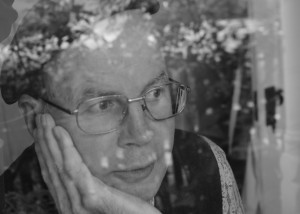 Melbourne-born poet, Peter Bakowski, keeps in mind the following three quotes when writing poems ‐ “Use ordinary words to say extraordinary things’–Arthur Schopenhauer, “Writing is painting”– Charles Bukowski, anand “Make your next poems different from your last”–Robert Frost. Visit his blog http://bakowskipoetrynews.blogspot.com
Melbourne-born poet, Peter Bakowski, keeps in mind the following three quotes when writing poems ‐ “Use ordinary words to say extraordinary things’–Arthur Schopenhauer, “Writing is painting”– Charles Bukowski, anand “Make your next poems different from your last”–Robert Frost. Visit his blog http://bakowskipoetrynews.blogspot.com
Portrait of Jean Rhys, 1979
I’m too here,
a once exotic specimen,
wings burnt
by your glare.
I hobble
to my further drowning
in distasteful rooms,
to my further droning
in sympathetic ears,
to view the further sagging
of myself
in every looking-glass.
I’ve memorized English poems,
the songs chambermaids and chorus girls sing
when they are too alone,
what men say to convince you
up a creaking flight
of boarding-house stairs.
I know the difference between
flattery and fawning,
loneliness and solitude,
the cost of each kiss given,
each cheque cashed.
I’ve travelled,
left many places
ahead of the landlord’s footfall,
the crucifying wife.
I’ve known rooms,
their tapestry-hung walls
flecked by the light from chandeliers.
Other rooms too
of hard chairs
and the eating of gritty porridge,
each incomplete winter window
stuffed with newspaper.
I’m a chore to nurses,
muttering in my dressing gown,
smeared with lipstick,
stained with rouge,
propped up with a cane,
assisted to the toilet.
Only writing is important.
But truth and fiction
are too late for some.
I didn’t change the world
or myself.
London fog, personal fog,
I glimpsed something necessary in both.
What is life? A holding on and a letting go.
Some trip from dignity to despair
with more than a little
dancing and drinking in between.
I haven’t any conclusions,
only the books I wrote.
The nib of my pen
scratching for vermin,
preening my ruffled feathers,
fending off attackers,
including myself.
Now I dictate words
to last visitors—
David, Sonia.
It’s the blind throwing of coins
at a dented cup.
Some fall to the carpet.
I’m nearly dust.
Open the window.
Let the curtain
be my sieve.
Portrait of Erik Satie, Paris, October, 1899
Granted these days, my number of tomorrows unknown, I resist
Rushing. Leave me to stroll through Paris, which enchants
And confounds me, as would an octopus with feathers.
The way sunlight falls through the horizontal slats of a park bench
Interests me more than many paintings in the Louvre. Most art is
Too polite. It needs to poke its tongue out, pull its pants down. Children
Understand my music. Their ears are not full of hair, politics and
Dinner party gossip. Meanwhile I stroll, pause at a favoured café,
Eavesdrop, watch the ballet of waiters gliding from kitchen to table.
Visiting my mother
Your confined self,
your hallucinating self,
your blanket-clenching self,
pulse beneath your hosting skin.
You’re angry, marathon runner,
that the finishing line has been moved.
The way you lived,
the way you didn’t live,
each has exacted their price.
I move nearer to your bedside
but the syllable you strain
to shape, crumbles.
I look through family photo albums—
evidence of all your capable years.
Each dutiful visitor soon quietens.
Their platitudes have little use
in this disinfected room.
Sister Anneliese reads you a card
from a German friend
who no longer visits.
She pauses to wipe
the sweat from your brow.
Your former neighbour Jean
looks up at the wall clock,
rubs at a buckle on the strap
of her handbag.
I walk with her
away from your
diminished self,
along the long corridor
of the nursing home
and down the lift
into the vital world.
June 10, 2013 / mascara / 0 Comments
 Kirun Kapur grew up in Hawaii and has since lived and worked in North America and South Asia. Her work has appeared in AGNI, Poetry International, Crab Orchard Review, FIELD, Beloit Poetry Journal, The Christian Science Monitor, Manushi and other journals and news outlets. She has been a poetry fellow at The Fine Arts Work Center in Provincetown, Vermont Studio Center and McDowell Colony. In 2012, she was awarded The Rumi Prize for Poetry from Arts &Letters. Currently, she lives in Newburyport, MA, where she is the creative director of The Tannery Series.
Kirun Kapur grew up in Hawaii and has since lived and worked in North America and South Asia. Her work has appeared in AGNI, Poetry International, Crab Orchard Review, FIELD, Beloit Poetry Journal, The Christian Science Monitor, Manushi and other journals and news outlets. She has been a poetry fellow at The Fine Arts Work Center in Provincetown, Vermont Studio Center and McDowell Colony. In 2012, she was awarded The Rumi Prize for Poetry from Arts &Letters. Currently, she lives in Newburyport, MA, where she is the creative director of The Tannery Series.
My Father’s Hopscotch, 1942
In August of 1942, the All India Congress Committee adopts the “Quit India Resolution,” calling for complete independence from Britain. The British government responds by incarcerating all the committee leaders, including Mohandas K. Gandhi. Strikes and protests sweep the country as over 100,000 are arrested.
Five rooftops—wide and flat— lie shining
between his father’s and his uncle’s house.
Five rivers in Punjab. His path spools out,
a conqueror, marching through the Khyber Pass.
First jump: Auntie Shara’s wicked chilies
smirking in the sun. Second: Rana Bhai’s old goat,
who gives no milk and bites a younger brother’s ass.
On Naana’s roof, a locked-up room, a sharp-nosed girl
whose only word is snakes. At his command:
a village burns, troops swim the Jhelum in the night.
Midway, my father stops, salaams
the black-draped Begums who come up to take the air.
They praise him as their naughty one, feed him
chunks of jaggery, never exposing their hands.
Who are you today, little son? Alexander? Shah Jahan?
Don’t tell us you’re an Englishman!
No way for him to guess the rumors in the street.
Some rumbling, a mutiny: the East is lost,
turn back, return to Greece. Roof to roof,
he leaps, he presses on across the map.
Under the Bed
I didn’t need monsters, I had
history. Didn’t want history,
I wanted crime—though I had
a girl’s body and the wind
in the palms outside cried steadily,
sounding like rain. I didn’t
need heaven or sin or punishment.
I had a mother. I had a father.
A fine gold sand blew across my face
and the shoreline I stood on changed.
The god who ruled our house
ruled patiently. The god of my heart
devoured me. I didn’t need a heart,
I had a family. A sea pumped that vast
salty love through its chambers.
When I looked under the bed,
I discovered emptiness. Discovering
my emptiness, I sang.
June 9, 2013 / mascara / 0 Comments
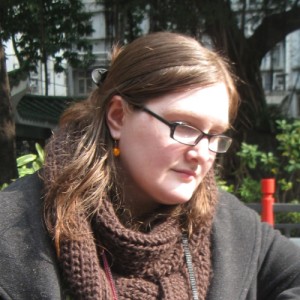 Sarah Stanton grew up in Perth, Western Australia. Halfway through university, she abandoned a promising career in not having much of a career when she transferred from an opera performance course into a Chinese language major, having fallen for the Middle Kingdom more or less overnight. Three years, two exchange programs and one potential firework accident later, she has settled in Beijing as a freelance translator and editor specialising in contemporary literature. As a writer, she has been published in a variety of magazines and indie projects, including Clarkesworld, Voiceworks, Hunger Mountain, Cha and Conte. She is a recipient of the Talus Prize and was recently shortlisted for the James White Award. She blogs at theduckopera.com and tweets @theduckopera.
Sarah Stanton grew up in Perth, Western Australia. Halfway through university, she abandoned a promising career in not having much of a career when she transferred from an opera performance course into a Chinese language major, having fallen for the Middle Kingdom more or less overnight. Three years, two exchange programs and one potential firework accident later, she has settled in Beijing as a freelance translator and editor specialising in contemporary literature. As a writer, she has been published in a variety of magazines and indie projects, including Clarkesworld, Voiceworks, Hunger Mountain, Cha and Conte. She is a recipient of the Talus Prize and was recently shortlisted for the James White Award. She blogs at theduckopera.com and tweets @theduckopera.
Midnight, Minus Three
Winter comes to Beijing like an old coat,
or perhaps a threadbare tide;
not a hurried cold—no, not yet so old
as an angry man—but careful, slow, and weaving herself from wind after wind,
snow after snow
like a shroud for a warm corpse
laying itself out on the street
at last to rest, and breathe—
then, tugging like a baby at her own sleeve
she sees to them, the hot potato women,
the quiet men crying corn,
to the dusty coats and supplications
and the sparrows blown like buttons
in a storm.
Harvest Festival
mulberrying by moonlight, out
in the sun’s full fruit and the sick,
glazed expression of desire;
out in the ripe clinic of collecting,
of undressing trees. alone is best
for this: one tremor, one kiss,
and the berries will fall—
scatter from pale to violet,
from the twitching green
of the newly born
to the final purple of food.
mulberrying by moonlight, burying
each arm in a thousand leaves:
juice hunting, the sweet cemetery
of bulbs at your feet, the curt wind
pressing nothings to your ear,
the bullying breath gathering up
its solo and shaking the berries,
their parted lips away
until each pail is full,
starbitten, stalk-yearning,
and you gather home,
steadied on the ready moment,
your skirt bullied up to the moon.
June 4, 2013 / mascara / 0 Comments
 Susan Fealy is a Melbourne-based poet and clinical psychologist who began writing poetry regularly in 2007. She is the winner of the 2010 Henry Kendall Poetry Award and her poems have appeared in many journals and anthologies including Best Australian Poems 2009 and Best Australian Poems 2010. She is developing her first full-length collection.
Susan Fealy is a Melbourne-based poet and clinical psychologist who began writing poetry regularly in 2007. She is the winner of the 2010 Henry Kendall Poetry Award and her poems have appeared in many journals and anthologies including Best Australian Poems 2009 and Best Australian Poems 2010. She is developing her first full-length collection.
Made in Delft
After The Milkmaid
by Johannes Vermeer
White walls melken the daylight.
In this plain room,
The map of the world
Has been painted over:
Only a woman, blond
Light from the window,
Her wide-mouthed jug,
And bread on the table.
Vision slows at her wrist,
Travels along her forearm.
Her apron cascades
Lapis lazuli.
One can almost touch her thick
Waist, her generous shoulders,
Her crisp linen cap.
One can almost taste the milk
Escaping her jug.
The Striped Moth
(In the Melbourne Museum)
At 5pm your wings will hang with shadow.
Now, they feed on light. Do you remember
tapping at the window, frantic as a tiny bell?
Or is your soul composed—a forest of shadows?
A tiger is latched in you: those eyes crouch
like stars and your pelt is soft as a tinderbox.
A tree expands in the veins of your wings––
counts one night and half a dawn––signs off.
June 3, 2013 / mascara / 0 Comments
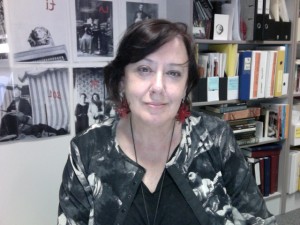 Professor Catherine Cole is Professor of Creative Writing at the University of Wollongong. She has published novels and two non-fiction books. She is the editor of the anthology, The Perfume River: Writing from Vietnam and co-editor with McNeil and Karaminas of Fashion in Fiction: Text and Clothing in Literature, Film and Television, (Berg UK and USA, May 2009). She also has published poetry, short stories, essays and reviews.
Professor Catherine Cole is Professor of Creative Writing at the University of Wollongong. She has published novels and two non-fiction books. She is the editor of the anthology, The Perfume River: Writing from Vietnam and co-editor with McNeil and Karaminas of Fashion in Fiction: Text and Clothing in Literature, Film and Television, (Berg UK and USA, May 2009). She also has published poetry, short stories, essays and reviews.
Looking for Serge Gainsbourg
Lying
on one of the graves
you kiss
the day-moon
(fading above bare branches).
Lover don’t catch a cold.
Don’t scandalise the tourists.
Don’t upset the cemetry attendants,
the grieving relatives.
This hunt
for Serge
is no laughing matter
I laugh
at the moon
at your lips
at the cemetry’s cats
making a wide
arc around
a crazy man
in a bright red scarf
a woman in stitches.
‘Go,’
you say
‘Allez trouvez l’homme.’
So I go
with my map
my gloved hands
dusted with snow
Je t’aime.
‘Serge?’ I ask an old man
watering,
‘Où et Serge?’
‘Tout près.’
He is close
(a little stream of water, a bare shrub, surely not lilac)
‘Y’a pas de soleil sous la terre,’ the man sings
Everyone’s a fan.
Près
And on Serge’s grave I find:
a love letter,
four metro tickets
and scrawled on the back of a café tab,
moi je ne tiens a rien
plus que toi.
manque de toi
je suis la moitié fou
and a
small smooth grey pebble
to take back to you.
Carlton
A late dark comes down
Cardigan Street
crows call from London planes.
By now you will be chopping at the sink
cat at your ankle,
pestering
ABC news
bushfires and floods.
Our friends live in separate cities too
we talk distance
of soldiers sent to war,
migrant workers
Stapleton in the Antartic, five years between letters.
Too tired by the time we call
to describe the crows’ black flash against red walls,
or how the drought has turned
all the grass
brown.
When next you come here
I will walk you past these trees
past the crows gnawing at plane tree pods
past the promise of Florence in the south.
I will sing sailor’s songs
Compose letters from the trenches of my heart
and hide them in your luggage
to read when you get home.
And while I wait
I walk past Victoria Street
past walls red radiant with heat.
I look a starling in its cruel eye,
step over the bleached bones of dead flowers.
And on Exhibition Building’s dome
a crow,
my heart in its beak.
June 2, 2013 / mascara / 0 Comments
 Jen Webb is the author of a poetry collection, Proverbs from Sierra Leone (Five Islands, 2004), a short story collection Ways of Getting By (Ginninderra, 2006), and a dozen scholarly books. She edits the scholarly journal Axon: Creative Explorations, and the new literary journal Meniscus. Jen has lived in Canberra for twelve years, and is an inaugural member of the International Poetry Studies Institute at the University of Canberra.
Jen Webb is the author of a poetry collection, Proverbs from Sierra Leone (Five Islands, 2004), a short story collection Ways of Getting By (Ginninderra, 2006), and a dozen scholarly books. She edits the scholarly journal Axon: Creative Explorations, and the new literary journal Meniscus. Jen has lived in Canberra for twelve years, and is an inaugural member of the International Poetry Studies Institute at the University of Canberra.
Four cities
1. On Brighton beach
Three a.m. The sea is black against the black sky,
but light hints along the tacked horizon line.
Yesterday the air was full of sound – the outrage
shrieked by gulls as they sailed
on spinnaker wings – the irritable sea
flinging itself on me. Now only small waves
shift on the stones; the only sounds now
are the cries of sleepless gulls.
Yesterday the carousel’s hurdy gurdy played
while dogs barked in syncopated time and
the painted horses galloped up and down.
They are still now, shut down,
the beach is asleep, the party done.
I am wasting my life. I am wasting your time.
2. In Christchurch
Stand under the doorframe, brace yourself
the way that we were taught
the floor rolls under your feet
the skin of the world is water
its bones twist and crack.
Don’t think those worst fears:
the earth has been closing over you
for days. Earth? or its fault lines,
they’re viscous, honey or jam lines—
oh and here come the ants.
Take heart, sweetheart, something
sweet is in the air, it’s the scent
of honeysuckle, it’s the idea
of tomorrow, it’s the promise of calm.
All we need do is wait.
3. On George Street
The red lotus
at the edge of the road
softens the traffic
at the heart of Haymarket
between the gutter and the sky
the bus driver coughs,
turns right into Bourke,
takes the airport road
I will leave where I should not be
I’ll fly home, meditating on
wrong love, on that red lotus
in the wrong place that
says it’s time to repent.
4. Collins Street, autumn
The rain is staining the pavement
rendering it black on grey
You have left your umbrella at home, again;
that meeting will have started
and you late, again. It can’t go on
The sudden crowd surge takes you
unaware: three pregnant girls bump by
and then the mob is on you,
the lights turn green. You step
between the pavement and the road
Do you turn left here, or right? Is that
your phone ringing? North has blurred
with south, all the buildings look the same
you’re late again
and you can’t recall the way
Between the traffic and the crowd
you have lost your way
And how do you cope? You run;
between the people and the trams,
you run; you hope you will not fall
June 1, 2013 / mascara / 0 Comments
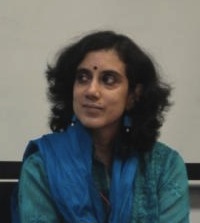 A poet, fiction writer and translator, Srilata is Associate Professor of English at the Dept. of Humanities and Social Sciences, IIT Madras. Srilata was a Charles Wallace Writer-in-residence at the University of Stirling, Scotland in 2010. She was also a Sangam house writer-in-residence. Her debut novel Table for Four, long listed in 2009 for the Man Asian literary prize, was published by Penguin in July 2011. Srilata won the first prize in the All India Poetry competition 1998 organised by the British Council and the Poetry Society, India for her poem “In Santa Cruz, Diagnosed Homesick”, the Gouri Majumdar poetry prize instituted by The Brown Critique in the year 2000 and the Unisun British Council poetry award 2007. Her work has been featured in The BloodAxe Anthology of Indian Poets, Penguin India’s First Proofs, Fulcrum, The Little Magazine, Kavya Bharati and The Hindu. Writers Workshop, Kolkata recently published her collection of poems titled Arriving Shortly. Her books include The Other Half of the Coconut: Women Writing Self-Respect History (Zubaan/Kali for Women, 2003), Short Fiction from South India (co-edited with Subashree Krishnaswamy and published by OUP in 2007), Rapids of a Great River: The Penguin Book of Tamil Poetry (co-edited with Lakshmi Holmstrom and Subashree Krishnaswamy and published in 2009 by Penguin/Viking India) and an anthology of poetry titled Seablue Child (Brown Critique, Kolkata, 2000).
A poet, fiction writer and translator, Srilata is Associate Professor of English at the Dept. of Humanities and Social Sciences, IIT Madras. Srilata was a Charles Wallace Writer-in-residence at the University of Stirling, Scotland in 2010. She was also a Sangam house writer-in-residence. Her debut novel Table for Four, long listed in 2009 for the Man Asian literary prize, was published by Penguin in July 2011. Srilata won the first prize in the All India Poetry competition 1998 organised by the British Council and the Poetry Society, India for her poem “In Santa Cruz, Diagnosed Homesick”, the Gouri Majumdar poetry prize instituted by The Brown Critique in the year 2000 and the Unisun British Council poetry award 2007. Her work has been featured in The BloodAxe Anthology of Indian Poets, Penguin India’s First Proofs, Fulcrum, The Little Magazine, Kavya Bharati and The Hindu. Writers Workshop, Kolkata recently published her collection of poems titled Arriving Shortly. Her books include The Other Half of the Coconut: Women Writing Self-Respect History (Zubaan/Kali for Women, 2003), Short Fiction from South India (co-edited with Subashree Krishnaswamy and published by OUP in 2007), Rapids of a Great River: The Penguin Book of Tamil Poetry (co-edited with Lakshmi Holmstrom and Subashree Krishnaswamy and published in 2009 by Penguin/Viking India) and an anthology of poetry titled Seablue Child (Brown Critique, Kolkata, 2000).
English Sentence
I was drowning
in a river of clichés
when it ran dry,
mid-sentence plunging
abruptly
into the swirling, breathless eddies of a
full stop
that ought to have arrived words ago.
The same evening, an old fisherman
counted forty dead words
from the preceding stanza and
one reeeely eely long river snake
which, he remarked later,
was the spitting image of those
insolent squiggles
that peered at him
from the pages
of his grandson’s English text book.
A Pair of Very Flat Feet
I meet them
in a shop selling orthotics,
my future arches,
paid companions to my very flat feet.
Shuffling backwards
in my pretend feet,
to the days when I had proper ones,
feet with which
to run on grass,
feeling the sharp tang of each blade,
I think
serendipitously
of metrical feet
and scansion
and all the stuff
my poetry teacher threw at me.
Home,
and the family is watching,
goggle-eyed,
Olympics 2012 live on TV
as beautiful red-lipsticked Russian gymnasts
with perfect arches
twist and fly arcs in the air
with the annoying lightness of robins.
I swear softly
and go to bed,
where,
pursued by pair upon pair of perfect feet,
I slip into yet another of my pointless dreams.
In this one,
I am a pirouetting ballet dancer
in Pointe shoes.
June 1, 2013 / mascara / 0 Comments

Stuart Barnes’ poems have been shortlisted for major Australian prizes & published at online & in print journals & newspapers including The Nervous Breakdown, The Warwick Review & The Weekend Australian Review; others are forthcoming at Otoliths, in fourW twenty-three & Blasphemy. ‘Mother and Son’, creative nonfiction about his coming out, can be read at Verity La (http://verityla.com/mother-and-son-stuart-barnes/). He edits PASH capsule (http://www.facebook.com/pashcapsule), a magazine of love poetry, & is working on the manuscript for his first book of poetry. Currently he lives in Melbourne, Australia.
Words witnessed, in traction, on Swanston St.
You fucking Asians
Stuffing your yellow
faces with
rice Picking
your Chinky noses
Yeah, that’s right,
get your fingers
right up there
Go back to China
I hope you die
today, bitch: I hope
a tram hits
you Thanks, Driver,
have a great
day
(title an adaptation of Sylvia Plath’s ‘Words heard, by accident, over the phone’)
June 1, 2013 / mascara / 0 Comments
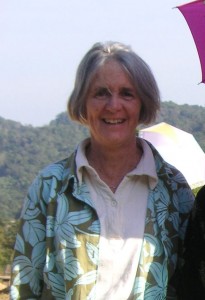 Jacqueline Buswell is a writer and translator, and has worked as a journalist and teacher of English as a second language. She recently completed a Masters of Creative Writing at Sydney University. Speaks Spanish, and is currently studying Italian. Her poems have been published in the Wollongong and Bundanon Poetry Workshop Anthologies, in the journal Five Bells and in other anthologies.
Jacqueline Buswell is a writer and translator, and has worked as a journalist and teacher of English as a second language. She recently completed a Masters of Creative Writing at Sydney University. Speaks Spanish, and is currently studying Italian. Her poems have been published in the Wollongong and Bundanon Poetry Workshop Anthologies, in the journal Five Bells and in other anthologies.
abstract
you are at ease in this landscape
of brown grey lines and twisting bark
gnarled deformities on old trees
all dry and crackling in the heat
fallen branches force you into detours
you get lost in the abstraction
you find a sunken billabong
hear the screech and laughter of the birds
on a full moon night you watch the heavens
and shadows move around the shining bark
small creatures move in the rustling silence
you hear the plaint of the mopoke voice
a house was lost in a bushfire, you re-created
that destruction on a murky canvas
dawn light opens on a granite rock and you see
the saltbush plain stretching west below
you realise you have never seen these distances
and a kangaroo is watching you
the valley turns with swathes of orange settles to dun
the bird song ceases and you cast about for shade
you realise you’ll have to build it
you’ve seen the humpies, as a child you used to draw them
you pull together branches, bark and leaves
brushing away termites and spiders
you lean logs against a tree
you never were a builder but by midday
you are snoozing under your rustic canopy
inhaling eucalyptus.
when you wake, you begin to paint –
that gold surround of pale blue
the iron red mountain
that mopoke night
After an exhibition by Elizabeth Cummings
SH Ervin Gallery 2012
June 1, 2013 / mascara / 0 Comments
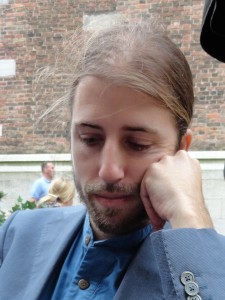 Luke Fischer is a poet and scholar. He won the 2012 Overland Judith Wright Poetry Prize and was shortlisted for the Newcastle Poetry Prize (2012). He is the author of three forthcoming books: a debut collection of poems titled Paths of Flight (Black Pepper), a monograph on Rilke and phenomenology, and a book of children’s stories. His poems and translations have appeared in Australian and international journals, including: Meanjin, Overland, Cordite, Snorkel, Agenda (UK), Antipodes (US), and ISLE (US). He was awarded a PhD in philosophy from the University of Sydney in 2008 and has held academic positions in the US and Germany. Recently he returned to Sydney.
Luke Fischer is a poet and scholar. He won the 2012 Overland Judith Wright Poetry Prize and was shortlisted for the Newcastle Poetry Prize (2012). He is the author of three forthcoming books: a debut collection of poems titled Paths of Flight (Black Pepper), a monograph on Rilke and phenomenology, and a book of children’s stories. His poems and translations have appeared in Australian and international journals, including: Meanjin, Overland, Cordite, Snorkel, Agenda (UK), Antipodes (US), and ISLE (US). He was awarded a PhD in philosophy from the University of Sydney in 2008 and has held academic positions in the US and Germany. Recently he returned to Sydney.
Les Grandes Baigneuses
Cézanne, 1900-1905
The serious blue of dusk
pervades the forest and figures.
On the further shore a dense cypress
spires. To the left of the group
arranged as a chance constellation,
a woman with a trunk-like frame
trails a river of towel, the source in her hand,
while her head is submerged in blackened foliage.
Two women, kneeling on the bank like deer with
folded legs, watch a naked girl as she slowly leaves the water,
unembarrassed and contained. Her iconic profile,
ringed by a cumulonimbus steeped in twilight.
To the right a tomato cheeked farmer with ample breasts
relaxes in cushioning arms and a sturdy physique
inclines with a tree. A seated woman between them
is feeling the texture of the earth while a russet head,
still bathing alone, rinses a shoulder, looking on.
Their skins shimmer––a moonlit lake
composed of refracted sky, woods, shore.
Beside the dark cat on a table of grass:
a cane basket of fruits and a watermelon half.
After days of rain
After days of rain
I go out for a walk
The air is hazy and bright like the mind of a saint
coming to her senses after a vision
Necklaces
threaded with polished jade and crystal beads
grace the breasts of trees
anklets glint in the grass
Three lorikeets pass in a rush––
chirpy green-winged rainbows
Entering the reserve
only now I realise the path
is a scar on the landscape
Now that the water
has made it a creek bed
and flows like a healing lotion
Downstream a fairy wren
twitches its blue-capped head
flicks droplets off its wings departs
In my fine leather shoes from Berlin
I slink along the bank, the soles pressing
native grasses and purple stars
Is there no way we can enter a forest
other than by severing it––like drawing
a rusty scalpel across a patient’s skin?
And what about the footpaths and roads,
the byways and freeways, motorways and runways––
all the cauterised wounds scarring her back?
June 1, 2013 / mascara / 0 Comments
 Michael Farrell is the former editor of Xmas poetry zine, elves. His new book is open sesame (Giramondo) which was shortlisted in the Kenneth Slessor Prize; Michael also has a new e-book from Black Rider enjambment sisters present.
Michael Farrell is the former editor of Xmas poetry zine, elves. His new book is open sesame (Giramondo) which was shortlisted in the Kenneth Slessor Prize; Michael also has a new e-book from Black Rider enjambment sisters present.
A Romantic Woman
Has sewn a bauble on her dress tonight
She thinks about the relation between
natural and artificial light as
she drives through the evening in a taxi
Doubt becomes her. If she were Catholic she
assumes she would’ve toyed with bishops …
agnostic it’s jackaroos that keep her
reading colonial fiction. Danielle
loves being twenty-nine (the pathos of
it) and dreams of an earlier name like
Muriel or Jean. She smooths the violet
sash her mother would say meant ‘die single
The country can be harsh like that. Next year
she might become a novelist, but for
now she’s happy with the magazine world
the hair and makeup boys, donuts on Fridays
She met someone online recently who
carves his own chess pieces and has a sandy
fringe, and she’ll meet Liam in the flesh tonight
Warm and soft, she said to herself warm …
soft. The night is floating with stuff: maybe
organic, but she thinks wearing a veil’s
underrated. I can’t wear a taxi
everywhere, she jokes to the driver who
doesn’t understand why not. Danielle thinks …
her friends, their brutal ways with men and how
successful such ways are. Men are afraid
she isn’t strong: yet she’s been known to eat
tuna from a can (to the right music
They don’t know what it takes to be her! She
wouldn’t be an editor for long …
Magazines were arcades for Danielle, not
stylish training manuals. Cigarettes
or insanity she would quip (before
she quit). Her therapist said she had …
Cinderella complex but Danielle – in
a rare fiery moment – retorted …
you have complexomania! Whereas
she was a deer of the forest …
Harriet Shelley without the river
bit, or the kids. Really, her mind was drifting
into inanity. The Melbourne traffic
wasn’t like a forest; she could surely
find better role models if she needed
them. She would never make anything happen
Danielle imagined Liam was probably
one of those soft, toilet-paper roll kinds …
guys with razor blades attached to the last
sheet. They love you until then. I have …
date with a bottle of gin, she thought …
a man on the side: a moment to cherish
cherish, cherish. She noticed that the clasp
on her handbag resembled a creature
with an unusual nose. She began
to conceive of a feature …
underrated beauty. She sat in the taxi
outside the party with the metre running
scribbling in her notebook while the humming
driver played a samba on the steering-wheel
Blue Cat Repository
Of everything that goes on in this
small room that is the house. Every feeling
evokes or colours me. Other cats mime
monitors, or speakers. Bread’s being sliced
jam’s being spread. I’m in your lap …
I’m purring. I’m outrageously fluffy
The TV’s on. The emu eggs hang from
the wall. Today I caught a mouse. A lie …
fire burns, the kettle boils. There are stock
anecdotes; there are street anecdotes. There’s
extended family slander, swearing, shushing
Someone’s melting their kidneys, someone’s fleeing
from the room crying. If you listen
you build up a picture of a culture
a kind of play with endless exits …
comebacks. I listen. There are leghorn
chooks pecking at the doorway, there’s …
ineffectual dog, barking …
shaking hands. Someone’s going to get
corn, someone’s getting a boiled lolly or
a hard coin pressed into their palm. Attempts to
reroute the conversation are shouted
down. Margarine’s tolerated. Cake
vanishes. Who has indigestion
Who wants a pink milk drink? Our usually
empty, calm domain has become a place of
noise and tussle. There’s no respect for cat
beds or cat bowls. But I’m not fooled
… distracted: there are determinations
being made. I’m a bank and a banker
I’ve watched card games played on quieter days. Quieter
trades of emotion are made then. I
remember watching a queen fight with
a general. They were lovers. I
was like a weather vane. Lightning struck them
both and they smouldered in cold gold corners while
servants picked up bugs with ancient tweezers. They
would stand on the balcony and throw
cherries at the pigs, who barely cared
No one thought cherries food there or then
certainly not me. Yet here, now, they fight for
a slice of anything with a cherry
in or on it. They sing about them
as if cherries constitute a world
June 1, 2013 / mascara / 0 Comments
 Eric Low works in the audio-visual industry, and lives in Shanghai. He has had his poems read on radio and has previously been published in several print and online journals, like the Asia Literary Review, Shampoo, Santa Clara Review, and others. He was the 2009 winner of the Singaporean Golden Point Award for poetry, and occasionally functions as an editor for Softblow.
Eric Low works in the audio-visual industry, and lives in Shanghai. He has had his poems read on radio and has previously been published in several print and online journals, like the Asia Literary Review, Shampoo, Santa Clara Review, and others. He was the 2009 winner of the Singaporean Golden Point Award for poetry, and occasionally functions as an editor for Softblow.
Chinese Park Bench
It is rare to see a man smile
in his sleep, on a Chinese park bench,
in the unicorn-blue days after the snows.
He is smugly dressed. His Mao coloured jacket
betrays a North Face label, badly copied.
His pockets are flattened, no wallet bulges.
A tan line marks his hand where he once wore a watch.
Nothing of value protrudes from this being.
Perhaps it is the knowledge of this,
that lifts the curls of his smile,
and grants him the comfort
of sleeping openly, here in this country.
Darling, Lets Call It One Of Those Mornings.
Darling, lets call it one of those mornings,
when we wake before any of our alarms go.
Maybe because we hear birds singing.
Rare, because this early on the 25th floor, only
suicides willingly squat it out on HDB ledges.
Nevertheless, what is there, is there.
Tweeties arriving in pairs to the prospect of construction.
Nary the jackrabbit bores bearing down on our doors,
that shake dust from our roofs, and take
our wooden board floors in waves. Instead coffee
sips through our gaps; the neighbour we all dream of hating,
is imitating my mother’s butter roasted grinds.
Yellow brick roads, ruby slippers. Our pet topic.
Never mind what Rose K. said about not arguing at night.
We’ll remember them for our next big bout.
Right now, it’s all about
how well the sun shines through and yet not shine.
Milk Films Over Soup
On reading Richard Hugo’s Letter to Kathy From Wisdom
All first instincts were the search for compatibilities.
Who was who, the likeness of individual behaviours, as if
choices then, were as limited as they were now.
After that, promises, promises. That I would always keep this poem close
repeating the words as I sipped cold soup at the Yuyao Lu cafe.
I am a liar of course. But only you, would know how to call me out.
Remember this place? Where we walked to for breakfast
after your first night at my house. I had to feel my way here then,
towing you along by your fingers. A blind man
with no cane, leading a girl only pretending to be blind.
Between now and then, one of us got smarter or duller. I forgot which.
These days, I trudge here on base instinct alone and the Frenchman
who served us on his first week in Shanghai, once so eager and kind,
no longer recognises me as the man in the blue long sleeved shirt
with the teenage girl clinging to his arm, asking him about life in general.
Perhaps it is three, and he and his waiters are impatient
to go home for those small hours precious to them.
The milk that formed the base of my soup has turned impatient too.
A layer of film freezes over its surface. I break it up with my spoon,
stirring to emulsify it back into liquid, but we both know,
nobody could drink this anymore. Still,
stirring always helps.
I started laughing; at you, almost the Kathy of my own Hugo poem.
For hoping that one day as you break the road on your yellow bicycle
through those sanely acres of your farm filled world, washing
your feet in the creek behind your house, splashing
your face with their waters, still trying to shun all that is me and mine,
you might come to understand how much you, this deli, that poem,
even the Frenchman, matters.
June 1, 2013 / mascara / 0 Comments
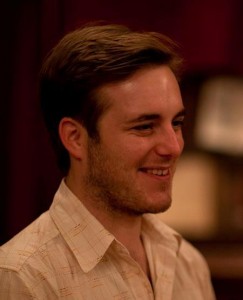 Corey Wakeling lives in Melbourne. His poetry appears in Australian and international journals and anthologies. He is the author of chapbookGargantuan Terrier, Buggy or Dinghy (Vagabond Press, 2012) and Goad Omen (Giramondo, 2013). He is reviews editor of poetry journal Rabbit, and interviews editor of Cordite.
Corey Wakeling lives in Melbourne. His poetry appears in Australian and international journals and anthologies. He is the author of chapbookGargantuan Terrier, Buggy or Dinghy (Vagabond Press, 2012) and Goad Omen (Giramondo, 2013). He is reviews editor of poetry journal Rabbit, and interviews editor of Cordite.
Mute
His hands silenced me, mute the epiglottis
made windowpane from which
and so disturbed by outside mania the hands
about others like dogs on a calf dog us.
More cuneiform plateaux without but
undisturbed since none live there surmounted.
All scrub rustles but binocular O’Casey
and the scramble, drifting lost for voice
but humming like turbines. Laburnum.
Lantana. Drift, in pools. That was where, intermission
of steady passage to the wax arrangements,
most rent the voice thrown clatters
disturbed by chance from the plainness
of clock face in Carlton,
the plainness of crime at the site of the Russian
juniper. Orthodoxy too, one guesses. Won
garsons. Turnpike to the grotto at estuary’s
diminishment, but surprise reflection
of state Narcissus.
Yours his hands steady, clockwork. Cur whelp to voice
in the juvenile zeit.
May 31, 2013 / mascara / 0 Comments
 Jan Owen’s most recent book is Poems 1980 – 2008. A selection in Dutch, Der Kus, was published in 2010, and a New and Selected, The Offhand Angel, is forthcoming in the UK with Eyewear Publishing. Several of her Baudelaire translations will be included in a future issue of Modern Poetry in Translation.
Jan Owen’s most recent book is Poems 1980 – 2008. A selection in Dutch, Der Kus, was published in 2010, and a New and Selected, The Offhand Angel, is forthcoming in the UK with Eyewear Publishing. Several of her Baudelaire translations will be included in a future issue of Modern Poetry in Translation.
Flittermouse
Elusive as Derrida
at the eastern edge of absence,
the tiny beast came through more slant
than Emily D in Sunday black –
a slashed-off scrap of dusk,
Venetian appliqué round a mask
glimpsed at a window over the Grand Canal,
Vivaldi played two rooms away.
Lobbed from nowhere onto the desk
in a shocking slippage of air,
grief’s gift paper sleeked its own dark nub,
a grinning foetus between the books and the cup,
myopically pulling itself together,
eerily looming, flumping towards me twice.
Then off to the frame of the Japanese print
to hang like disshevelled sci fi, gravity’s womb
or a scatological statement on art.
I let it be all night through chittering dreams
but woke round dawn as out to the square world’s
inconvenient corners it veered,
tracking its own grace notes to where
at last out the fast thrown-open door
it took my breath away
like an exorcism,
that most intimate loss.
Outside the Museum
Against the traffic’s roar
some small pipsqueak was giving
its territory away
with five clear-glass notes here
and five more there
like memory echoes in
the stripped trees’ mid-December air
so twig by twig by twig
one naked plane was hung
with limpid silver baubles of sound
like a boutique musical pine
with the unseen wren
so much ahead of itself
so much a sprung intention
it seemed the tree was plucking
the bird from note to note
from now to now
playing its flight in silver palindromes.
Passing below
our trivial quarrel held its ground
with words like dead bells
melted down for guns
till aptly we went underground at Iéna
parting finally at a corridor junction
grey as a tunnel in purgatory
no buskers at any coordinate
of space or time.
May 31, 2013 / mascara / 0 Comments
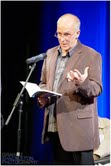 Terry Jones’ debut short collection, Furious Resonance, was published by Poetry Salzburg in 2011. That same year he was the winner of the Bridport Prize. His work has also appeared in magazines including Poetry Review, The New Statesman, Agenda, Ambit, The London Magazine, Magma, Iota, Communist Review, The North.
Terry Jones’ debut short collection, Furious Resonance, was published by Poetry Salzburg in 2011. That same year he was the winner of the Bridport Prize. His work has also appeared in magazines including Poetry Review, The New Statesman, Agenda, Ambit, The London Magazine, Magma, Iota, Communist Review, The North.
Sun
Let X be the sun:
between number and number the rage star burning; Xanthic helllight, Sunflower atom-pisser, imaginary
ghost flower.
Starts with clot of ochre
Impasto sun-mould the ur-text in outline paradigm mud-pat
A child’s sun isotope of yellow wax its surface storms
Upstroke the sun’s sign
On papyrus whirlpool of x-rays
a violent flower at zero
Furious stalk the inferno uncodes and black it is black a black funeral
feather World-black negative dark flower Gamma plant blazer Anarchist icon
O common star Sulphur flower the light star’s dark grammar
Is hossanah breath and bone swastika Solomon’s Seal
At heart it reads off Signifier Sigma
Sonne sunne A sol-fa
its energy a base petal pions’ spore Morpheme it flashes out
Struck flint Mi
Mi
Mi
The dawn flower Alpha Aaron’s Rod Gospel gold-leaf
To liquid sets elixir the dusk rose Giaconda Will-o-wisp light text
Glows oil out plumes out
Marigold Madonna Yellow ink on paper
Its syntax figured
complex Flowering Kells Book wrought Of roots enchanted Carnival chromosome
Writhing writing Rag-and-bone strange rose Torch of anti-matter Old rope manuscript
Ultra-violet hieroglyph
but penned
Coded.
May 31, 2013 / mascara / 0 Comments
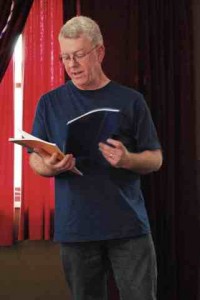 Mark Roberts is a Sydney based writer and critic. He is currently editor of Rochford Street Review and P76 magazine. He was widely published in Australian literary magazines and journals during the 1980s and 90s and has recently emerged from a long hibernation. His book Stepping Out of Line was published in 1985.
Mark Roberts is a Sydney based writer and critic. He is currently editor of Rochford Street Review and P76 magazine. He was widely published in Australian literary magazines and journals during the 1980s and 90s and has recently emerged from a long hibernation. His book Stepping Out of Line was published in 1985.
Martyrs’ beach
the seaweed was blood red
we stood on the sand
and watched waves
hurl bleeding clumps
at the regenerating dunes
at the local museum
we find buried at the back
of a yellowing scrapbook
a reference to a seaside massacre
of aboriginals who had
‘trespassed on prime grazing land’
near the front door
a hand written label
in a wooden showcase
full of spear fragments
announces
“little is known of the way of life
of the original inhabitants of the area”
After arrival – storm at sea
running like children
past the old midden,
protected by a rusty sign,
we burst onto the beach to be confronted
by the stench of dead mutton birds.
they stretch in a decaying black line
along the high water mark.
others lie rotting, caught on the rocks
at each end of the beach.
we climb over the headland
to the next beach
to find the carnage even greater
a wall of feathers bones and maggots
piled high.
in the general store
the talk is of pollution –
oil spills up the coast
or poison feed.
But in the bottle shop
an old woman
tells us of a storm at sea,
of birds dropping
exhausted into the waves.
May 30, 2013 / mascara / 0 Comments
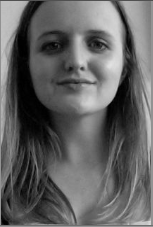
Jo Langdon is the author of a poetry chapbook, Snowline (Whitmore Press, 2012). She lives in Geelong and is currently completing postgraduate studies at Deakin University.
Hauptbahnhof
We suck down saltless air and the light’s gone
strange—mountains hiding
their greenery,
swallowing time.
In Vienna it was pigeons, feathers
slate-coloured and your camera full of them.
(Bodies filthy, grained and small
in the instant.)
I want you to see it all,
as I remember: in miniature, like a snow-
glass sequence.
Afterimages curved in crystal
compartments—drift
of snow that does not melt, does not build
in shape or artefact:
not the tilting flowers, starry edelweiss;
not bright air in singing hills,
or the zigzag of ice between us.
Sonnenfeld 17
The kitchen lit with snow light
your first morning here
again
and winter somehow cleaner: air
low and blue on the streets.
Deep in the night, trucks salt
the roadways; mountains lean in
on your sleep.
You wake to find shadows
unpinned and shifting
in barest light—
your face, a quiet hologram,
in looking glass that will not hold
melting garden snow.
May 18, 2013 / mascara / 0 Comments
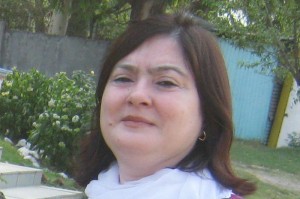
Ranu Uniyal teaches in the English Department at Lucknow University. She received her doctorate from Hull University, UK. Her work has appeared in Sketch Book, Twenty 20, Muse India, Kavya Bharati, Femina, Manushi, Indian Literature, Littlewood Press and other literary journals both in India and abroad. Her poems have been translated in Hindi, Urdu, Uzbek and Malayalam. She has published two poetry collections. Across the Divide was published by Yeti Books in 2006 and December Poems by Writers Workshop in 2012.
Love lies
Smoking veins that run wicked like
An old nanny whose time is running out
Doors have been closed and the moon has little to offer
We get inside as if there is no haste
And we time a plenty I put aside my old grandmother’s earrings
They often get caught when it is just right between us
Such a nuisance it is to unhook all – the buttons on your chest
My shoes and slim garters – they have been there awhile
Off your smelly socks which I pretend to explore
They say nibble his toes and he will come like a flash
We breathe one other as the lights twinkle
In the sitting and I draw you in me afraid
Of the morning that has been set aside.
Love is forever you whisper in my ears
The whole of you is seeped in truth
But for the fingers they find it difficult to lie.
Death of a letter
My dear I have stopped
addressing them to you
words glide swiftly
to the wild contours
of distant shelves
that once belonged to you.
In ink I dip them not
nor do I stamp them
with suave sincerity.
Some unholy passage
lurks out of memory
and hands get still.
The alphabet is cold
and my letter
devoid of warmth
of love, of news
and address
refuses to make amends.
For a Father who taught me to smile
My father’s face
soft and grizzly washes away
clusters of sadness and I get closer
to his smiles soaked in eternal bliss.
They are with me
those scattered shades
of a sunset in childhood
unwilling to disperse.
I find him almost everywhere.
The air is floating with his
morning chants of Durga Saptshati.
The fire groans in my son’s eyes.
The waters mingled with the smoke
while his body crossed the bare sands
and this little earth so moist and green
was loaned to me as his only keepsake.
Durga Saptshati: A collection of chants in Sanskrit in praise of Goddess Durga a symbol of Shakti – female energy and creativity.
May 18, 2013 / mascara / 0 Comments
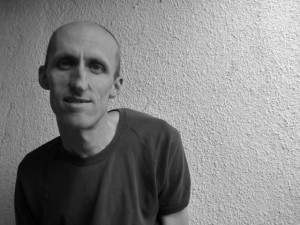
Andy Jackson’s Among the Regulars (papertiger media, 2010) was shortlisted for the Kenneth Slessor Prize. His poems have recently appeared in Meanjin, Cordite, Wordgathering and Medical Journal of Australia. He is currently working on a series of poems exploring medical tourism, and a book of portrait poems of people with Marfan Syndrome. He blogs at amongtheregulars.wordpress.com
Newsprint
The nurse asks again but you haven’t heard.
You are passing the scene in slow motion,
face pressed against the glass of the newspaper,
something unspeakable turning in your bones
like pleasure. Not relief at your safety.
Not homesickness cloaked with sympathy.
Or even some remnant you’d mistakenly
call animal. You don’t know for a long moment
who you are – the young slum-dweller
who ran through the toxic smoke to rescue
patients and now lies in intensive care?
The hospital directors taken into custody?
The crowd clamouring at the gates for the bodies
of their loved ones? Or the police
resorting to batons to subdue them?
She takes your blood pressure and temperature.
The alarms and sprinklers are switched on
and work. All the emergency exits are unlocked.
No boxes block the stairwells. Only
your fingers are black with newsprint.
Necessary
Mounds of rubbish sifted by goats, dogs,
rag-pickers, collected by trucks
of the mind. Traffic negotiated in the peripheries
of sight and sound. One purple flower
exploding beneath the flyover. The necessary
genius of a bicycle he rides with his hands,
his legs contorted and useless.
The quick blink of a white bullock
as she’s whacked again with a stick.
Six days in, and it’s beginning
to seem like I’m seeing today what I saw yesterday.
A mange-weary dog looks both ways
before crossing the road. A woman
pulls the tarp off her carefully arranged pile
of mouldy textbooks and airport fiction.
An ambulance’s quiet siren swims
through the intersection. It doesn’t matter
what day it is, where I could be. Someone
is carefully repairing a busted umbrella.
May 18, 2013 / mascara / 0 Comments
 Ken Chau is a poet living in Melbourne, Australia. His poems have been published in Australia, France, Hong Kong, UK and USA, including the anthology Growing Up Asian in Australia, ed. Alice Pung (Black Inc., 2008). He was most recently published in The Best Australian Poems 2012, ed. John Tranter (Black Inc., 2012) with his “Chinese Love Poem”.
Ken Chau is a poet living in Melbourne, Australia. His poems have been published in Australia, France, Hong Kong, UK and USA, including the anthology Growing Up Asian in Australia, ed. Alice Pung (Black Inc., 2008). He was most recently published in The Best Australian Poems 2012, ed. John Tranter (Black Inc., 2012) with his “Chinese Love Poem”.
Chinese Silence No. 101
after Timothy Yu, “Chinese Silence No. 4”
after Billy Collins, “China”
I am a flattened spider inside a discarded book of Chinese poems
on the drawing board of a curious architect.
Grand designs are being drafted.
Many bottles of champagne await opening day.
But even when he’s mad
and hurls the book across the room,
I stay as silently still as the dead,
unread words on these pages.
Chinese Silence No. 103
after Timothy Yu, “Chinese Silence No. 8
after Billy Collins, “Hangover”
If I were crowned Paramount Leader of China this afternoon
every peasant planting rice in a paddy field
would be re-educated and silenced forever
from uttering the name of Mao Zedong
Mao Zedong Mao Zedong
then would not be required to read The Little Red Book
but my My Book of Thoughts
and learn to spell Chairman Mao’s name in English
in my preferred transliteration of
Mao Tse-tung Mao Tse-tung
after which they would be quizzed
about the spelling of his name then executed by firing squad
regardless of how little they retained
of their thoughts of how
Mao Zedong thought Mao Zedong Thought would be thought of.
May 18, 2013 / mascara / 0 Comments
 Marcelle Freiman has published two books of poetry, White Lines (Vertical) (Hybrid Publishers) and Monkey’s Wedding (Island Press). She grew up in South Africa and lived in London before migrating to Sydney, where she has resided since 1981. Much of her poetry emerges from her biography and from a constantly shifting sense of place. She teaches creative writing and literature at Macquarie University and has research interests in creative writing as theory and practice, and in poetry and postcolonial and diaspora literatures.
Marcelle Freiman has published two books of poetry, White Lines (Vertical) (Hybrid Publishers) and Monkey’s Wedding (Island Press). She grew up in South Africa and lived in London before migrating to Sydney, where she has resided since 1981. Much of her poetry emerges from her biography and from a constantly shifting sense of place. She teaches creative writing and literature at Macquarie University and has research interests in creative writing as theory and practice, and in poetry and postcolonial and diaspora literatures.
A Book
I’m leaning towards a book
with pages the colour of honey
and linen – as if clawed
from a desert wadi cave,
preserved by the cold arid nights:
threaded like beads on fibres of jute,
the words in this book
veil a quiet love – hidden
in the traces of names of things
I want to hand to you: feather, wood,
a whitened shard of glass smoothed by tides,
grains of sand sieved fine through my fingers,
the chambers of a nautilus –
can these objects – stone, pebble, driftwood, shell –
echo my body’s sound waves,
transmitting like whale-song
or pulsing satellite arcing across the sky
sudden as a falling star?
A body in feeling is silenced
in the face of wind-tunnels of distance.
Only the emptiness in my hands
is the name my love – a blown
feather, multiplication of cells,
a book without end,
amber pages and caught threads.
Chinese Box in Hong Kong
Roots of a banyan have taken the stone wall,
this street is uneven, like an ankle-twist
the air thick with heat, humid with fumes,
bloomers and t-shirts hang above the canopy
of a restaurant, modern food in lacquer bowls,
shiny shops, heavy jade buddhas, money runs
in the veins of this city, the drains of wet markets
and fancy boys in pants cut for tight hips
and haircut perfection queue for noodles, the best in Soho
where sidewalks slide down hills, the escalator clacks
up to Mid-levels. I buy red happiness candles
and an antique box of leather, also red,
its dark metal ying-yang clasp a promise
one day I will learn this too is home,
that you thrive like scarlet bauhinia
growing on rocky peaks of this city
with its dumpling stalls and teeming streets –
its speed the energy in the tips of your newest roots.
May 17, 2013 / mascara / 0 Comments
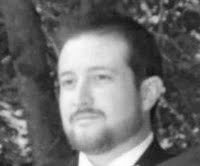
William Byrne is an emerging South Australian poet in his mid twenties. He has always lived in rural and coastal townships, excluding an urban interlude for university study for degrees in architecture and design. He has recently had work published in Westerly (Univeristy of Western Australia) and The Disappearing (Red Room Company).
Aspergers
Water dries so fast
on my fore and index fingers
once I leave the chiesa,
that foreign place of incensed marble.
It evaporates
as soon as I see the sun
and basking in it, the smooth shoulders
of the lane’s cobblestones. I trip
in my penance, later, while seated
in the brassed café
as my lips part for vermouth.
Again I see Rome’s dark shoulders
then her leather heels and passing souls,
then half smoked cicca,
their pale ghosts hanging in the streets,
then smooth, tanned Roman fingers.
Chiesa water dries so fast on my fingers.
The vermouth is also dry.
Wheat
In my old car, tyres wet, we spoke
black over green like a Rothko painting,
the young crops startled in our headlamps,
their fronds thrashing in the yellow glow.
You too were startled when I turned the headlamps off,
even though we had pulled up aside the field.
The lamps were deadened, yet the radio hailed
in a distant AM. Ice crystals formed on the window,
shading thinly the edge of the screen.
Beyond the glass, grey clouds brushed past the moon
rising on the curved horizon beyond
wheat past further than sight from two sets of eyes could see.
Afterwards, we drove to a town
at the edge of the wheat, leaving the earth
on the side of the road where we parked
a dry-ish print framed in rain craters
and shallow puddles bleeding into its soft sides.
We laughed so hard that night as we spoke and tried to see.
December 10, 2012 / mascara / 0 Comments
 B. R. Dionysius was founding Director of the Queensland Poetry Festival. His poetry has been widely published in literary journals, anthologies, newspapers and online. He is the author of six collections of poetry and won the 2009 Max Harris Poetry Award. He recently was a joint winner of the 2011 Whitmore Press Manuscript Prize and will have a new book, ‘Bowra’ released in 2013. He lives in Ipswich, Queensland where he teaches English and writes sonnets.
B. R. Dionysius was founding Director of the Queensland Poetry Festival. His poetry has been widely published in literary journals, anthologies, newspapers and online. He is the author of six collections of poetry and won the 2009 Max Harris Poetry Award. He recently was a joint winner of the 2011 Whitmore Press Manuscript Prize and will have a new book, ‘Bowra’ released in 2013. He lives in Ipswich, Queensland where he teaches English and writes sonnets.
Christmas Island Rat
Rattus macleari
We were worried about what you would bring
Into our country of nests & dark burrows, intrigues
You could only guess at. A nation of rodents brawling
All night, we encouraged high-pitched wars & rapid
Coupling, but kept those red land crabs in check.
It was the vanguard you sent ahead that finished us.
Not our black brethren who swarmed new continents
Walking planks to explore the world through a rat’s
Tunnel vision. But the other refugees they carried.
Diseases that pushed like railroads through virgin
Bloodstreams. If only you could have been processed
Offshore on some other ocean rock & kept at claws
Length in mandatory detention. Not perfect, but it
Would’ve given us time to think up a (s)pacific solution.
Elephant Bird
Aepyornis maximus
We came from the largest single cells ever to be thought
Into existence, larger than dinosaur eggs our shells cracked
Open your legends, your mouthwatering myths imagined us
Hauling off elephants; heavy-lift choppers, the East named
Us – Roc; who messed about with Sinbad & we probably
Were a little imposing for you standing at a little over 10ft,
Weighing in at half a tonne. Big Bird’s streetwise prototype.
Then Marco Polo, that intrepid reporter of misquoted facts
Named us Elephant Bird, now that hurt, how would he have
Liked us to call him ‘lemur-man’. Coastline huggers came next,
French too scared to pick through our deepest secrets, gave us
Pirates’ status – a lost treasure by the 16th century. Voromapatra
In the Malagasy tongue – ‘marsh bird’, fitting really for we sought
The most lonely places of all; at least your imagination took flight.
December 10, 2012 / mascara / 0 Comments
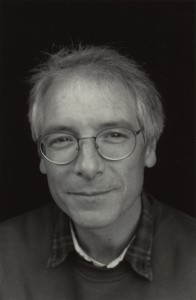 Paul Kane has published five collections of poems, including A Slant of Light (Whitmore) and Work Life (Turtle Point), and is the author of Australian Poetry: Romanticism and Negativity (Cambridge). He serves as poetry editor of Antipodes, artistic director of the Mildura Writers Festival, and general editor of The Braziller Series of Australian Poets. He teaches as Vassar, and divides his time between New York and rural Victoria.
Paul Kane has published five collections of poems, including A Slant of Light (Whitmore) and Work Life (Turtle Point), and is the author of Australian Poetry: Romanticism and Negativity (Cambridge). He serves as poetry editor of Antipodes, artistic director of the Mildura Writers Festival, and general editor of The Braziller Series of Australian Poets. He teaches as Vassar, and divides his time between New York and rural Victoria.
~Photograph by William Clift ~
The Fire Sermon
Here in the Drowned Lands
the black dirt is the blackest
black I know—give it
time and it’s oil, to blacken
earth, air and water with fire.
In winter, without
snow cover or a crop, winds
insinuate fine
granules under windows
and doors. That’s our peck of dirt.
Ironbark forests—
a world away—are fire tough,
their carbon footprint
black trunks, seared soil, and fresh green—
the Aboriginal park.
Last year we fled floods,
this year a grass fire near Clunes—
one wind shift away.
The Fire Sermon gets into
your blood: the black days ahead.
But let’s not leave it
at that. Winter played possum,
then ambled off—now
we’re marching towards spring—Daylight
Saving all the grace we need.
Worlds Apart
The bottom fell out
and it was a long way down.
He surfaced once,
saying he was back, but then
we lost him, and now he’s gone.
You could say he killed
himself with drinking, or drink
took him out at last,
but his ex-wife’s suicide
was murder on him, poor man.
Poor woman! And now,
poor daughters to sift the ash.
I cannot shake it.
Not a close friend, but friend still
in a world growing friendless.
The circle closes,
tightening like a rope loop,
or, rather, it breaks
open, with each loss gaping,
until it’s all detritus.
That’s the view inside,
but when I walk out midday,
nothing is natural
because it’s all what it is,
soft air, clouds, wood thrush, the grass.
I could describe it,
but to what purpose? We all
live in the same world,
though world’s apart, and never
to meet—except life to life.
November 23, 2012 / mascara / 0 Comments
 Christine Ratnasingham is a Sydney based writer and poet, who was born in Sri Lanka and grew up in England and Australia. She has had her poetry published in conversations, Extempore and Hypallage, and was awarded the HB Higgins Scholarship for Poetry from the University of Melbourne.
Christine Ratnasingham is a Sydney based writer and poet, who was born in Sri Lanka and grew up in England and Australia. She has had her poetry published in conversations, Extempore and Hypallage, and was awarded the HB Higgins Scholarship for Poetry from the University of Melbourne.
The Foreigner
Like a little bird, one you’ve never
seen before, who appears to have accidentally
flown in
through a slightly open window
and into an enclosed installation, enlarged
with people busily pecking at their own
and other people’s lives – flocking, talking, necking
laughing
oblivious to what has just
happened. You’ve seen it, but you’re
paralysed with hopelessness. What can you
do? She’s too fast to catch, filled with
moments
of panic, then stillness. And you watch
her, realising that now, only seconds later
this furiously flapping bird
once frightened, now seems … okay, quite happy
in fact
exploring her surrounds, making the most
of the situation – nibbling at crumbs
jumping around feet, moving along with the crowd
blending in, and it seems that even if you
wanted
to help her back outside, you may
frighten her more, and perhaps
even be going against her will, and so
all you can now do is simply watch, slightly
amused
who’s to say she doesn’t belong
We all do
don’t we?
Dark skin
I forget I have it, until I remember my childhood
when nearly every student felt they needed
to remind me that I was not of their whiteness
I forget it clothes me, until I leave home
and catch photographic glimpses in bus windows
and ad hoc reflections, reminding me
I forget it owns me, until I’m asked where
I’m from, for I can’t be from here?
But from somewhere else, a place I don’t really
know and that has forever branded me
I forget its beauty, until I see it on other
bodies that carry it with dignity
or when they are clothed to celebrate
their difference
Only one of my many parts, yet mostly, the first
one you’ll see when you look at me
I forget, then remember
I own my
dark skin
November 23, 2012 / mascara / 0 Comments
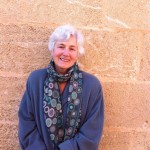
Diane Fahey’s The Wing Collection: New & Selected Poems
was published by Puncher & Wattmann in 2011, and was short-listed for
the John Bray Poetry Prize in the Adelaide Festival of Arts Awards,
2012.
Diane has been selected for Australian Poetry’s Tour of Ireland in 2013.
Four Black-Winged Stilts
At the Barwon Estuary
As if linked by elastic thread, they lift,
trace a soundless arc across the river–
botanical, somehow, with their tapering
leaf-wings, their stem-legs. They forage
then rise as one again, drift through adverse
winds back to their spot in the shallows,
touching down at the same instant.
Stilt hatchlings – brown-flecked heads and wings
sturdy legs half their height, fine bills a pointer
of things to come – are most easily found
in field guides, a dab of light in each inky eye.
Their future is to frequent marshlands,
make brisk forays across the water –
sometimes, with soul mates in triplicate.
Eastern Rosellas
In a troupe they arrive one misty day
to give a musical tirade upon
the cherry plum’s bare boughs.
The lilt of their speech evokes the cries
of children at play – piercing, tremulous
– and those of ancient scolds shrilling
what’s what in no uncertain terms.
The primary force of yellow and red
is finessed by the gold-edged black lace
down their backs: such solid apparitions
they leave after-images in the air;
their speech, as I later recall it,
marked by swoops and lifts so giddily swift
they could only be voiced by those who fly.
November 14, 2012 / mascara / 0 Comments

Louise McKenna was born in the UK where she completed a joint honours degree in English Literature and French. Her first poetry collection was A Lesson in Being Mortal (Wakefield Press 2010). She is co-editor of Flying Kites, the Friendly Street Reader 36, (Wakefield Press 2012). Her work has appeared in Poetrix and Eureka Street. Her work also features in Light and Glorie, an anthology of South Australian poetry forthcoming from Pantaenus.
With a rush of water
he reels the fish in,
light glancing off
the tessellation of mirrors
on its wet piscine skin.
In a flash he glimpses his son
writhing in a shawl of amnion,
his wife begging for oxygen
in her river of blood.
He unhooks the fish’s pleading mouth,
spills it over the bank
where the current swallows it
like a bolus of grief.
Beneath the meniscus
of his breathing world
the barb still hangs,
trails the air.
A Walk in the Post Natal Woods
A thatch of branches and fir cones
drains the sky, sieves nuggets of light.
In this moth-silent twilight
mushrooms flourish,
feeding on shadow.
Or blackberries,
sticky as blood clots.
I must carry my baby
from this bed of stone
with its lichen and moss,
its graveyard patinas.
Something malevolent
waits deep in the bole
of that tree.
I’ve heard these woods
are full of bears and witches.
I’m an easy target—
Gretel without Hansel
looking for exits
that appear and vanish
like holograms I tell the midwife.
In her eyes I see her shaking her head.
“With A Rush of Water“, was published in the Friendly Street anthology
November 14, 2012 / mascara / 0 Comments
Lyn Hatherly spends much of her time doing something about writing: editing, publishing, writing, and teaching. Some writers have been working with her – as members of The Writing Zone club – since 1997. Currently, apart from teaching writing and mentoring other writers, she’s one of the managing editors of the new Five Islands Press. In the past she was one of the founding board members of Australia Poetry, editor of Poetry Monash and the Medal Poets Series. In between lecturing in North Queensland Lyn set off in her small green car on a Writer on Wheels tour funded by the Regional Writing Fund. She also acted as poetry editor for LiNQ. Lyn has three published books: Acts of Abrasion (Five Islands Press 2006) Sappho’s Sweetbitter Songs (Routledge 1996) Songs of Silence (Medal Poets 1994). She contributes poetry and reviews to journals and anthologies and has won several awards. At the moment, after much house and garden building, Lyn is busy with a new book about creating a garden in the natural Australian style.
Shearwaters
It’s a miracle the way they home
every evening, braids of light from the city
to the burbs and boroughs
dark-suited parents in singles or pairs
swooping in with the day’s bacon or fish
dreaming, while halted, of the snug rooms
the glad cries of their young.
From crowded arterials they separate
gem-like threads shine up and down grey dales.
Who could believe they’d each find
that certain opening, could zoom at speed
into their own welcome.
By February Shearwaters have nested
in earthen burrows, each parent sitting
alternate weeks sharing their warmth
with the young as they swell in curved shells.
The other floats, dives for dinner with the flock
flies unerringly home, feathered beats
matching the clouds, shape-shadowing the sea.
Each plunges straight and fast into one entrance
among thousands, each, to my eyes
exactly alike. Babies in their fluffy suits
squeal with pleasure before the family
settles in their dim cosy nest.
Flexible bones
you slip from me
slick with the fluids of ingress
and egress
my labia refold like petals
when the world turns from the sun
I think how part of you
sleeping now against my thigh
is solid brawn yet baby-skin soft
you don’t know
in months a child will take its leave
the way you have left
my very bones spreading
almost dislocating
hormones unsettling them
as our child moves outwards
and onward
you can’t remember
how a pelvis bent as you birthed
so you fit that thin canal
how fontanelles those pliant spots
flexed your skull
where spaces lingered
where skin stretched
and revealed your soul
you didn’t see the head
of our first child pointed
as a pixie as she squeezed
into life
only love could melt bones
this way then fuse
them for a lifetime
November 9, 2012 / mascara / 0 Comments

Mani Rao is the author of eight poetry books and a translation of the Sanskrit
Bhagavad Gita (
Autumn Hill Books USA 2010,
Penguin India 2011). For links to more of her writing, visit
www.manirao.com
Midas, A Casino in Vegas
Talk to me, goldfish
Where’s Titanic?
Fancy a gold apple it’s
greed only if you’re hungry
Lady Luck just wants a fuck
You don’t need no PhD in Alchemy
Ouranos Returns
By 30, Alexander is not going through a phase
By 40 if Aristotle is not Aristotle he will never be Aristotle
The next 20 years
Open field
Around the time you need reading glasses and
numbers are leaky
you run into Kronos
Under a tree
Contemplating
two oranges
Bitter or sweet?
See what’s better
When children do not know it
is their turn to love
See what’s better
Cupid and Psyche
Psyche’s in the dark but Love isn’t blind
Catches double glint of Psyche’s intent
New moon night
Mermaid and dolphin
In a daze
Waves tilt
Ships levitate
Tender exuberant
Plasms light
Psyche sees with Cupid’s eyes
November 9, 2012 / mascara / 0 Comments
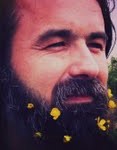 Jakob Ziguras lives in the Blue Mountains, near Sydney. His poetry has been published in Meanjin, Australian Poetry Journal, Literature and Aesthetics, and Measure: A Review of Formal Poetry. He was shortlisted for the Newcastle Poetry Prize in 2011 and 2012, and won the 2011 Harri Jones Memorial Prize. He holds a PhD in philosophy from the University of Sydney.
Jakob Ziguras lives in the Blue Mountains, near Sydney. His poetry has been published in Meanjin, Australian Poetry Journal, Literature and Aesthetics, and Measure: A Review of Formal Poetry. He was shortlisted for the Newcastle Poetry Prize in 2011 and 2012, and won the 2011 Harri Jones Memorial Prize. He holds a PhD in philosophy from the University of Sydney.
Pygmalion
Heifers with gilded horns no longer part before the axe,
in celebration of the rites of Venus; these days no
mythical obstruction dulls authentic pain, her hidden
face.
Art always seemed to offer permanence surer than
the fading skin. But I am tired of scraping at a rock
to find the girl within. Here in my garden, beside a pine
tree
skirted by shadow, a youthful form burgeons in alabaster.
Caught in a state of grace, she grasps after the fluency
of air surrounding her entombed appeal. A straying
breeze
whistles through her fluted curls. Beauty that cannot dance
or kiss. It scares me suddenly, to see my need transformed
into this lissom milk, compacted hard enough to grind the
seed
of dreams; holding my life between her glowing thighs.
November 6, 2012 / mascara / 0 Comments
 Tiffany Tsao grew up in Singapore and Indonesia, has spent time in the UK and US, and now resides in Sydney, Australia. She earned her PhD from UC-Berkeley in May 2009 and is a currently a lecturer in English at the University of Newcastle, Australia. In addition to writing fiction and poetry, she publishes on English and Indonesian literature. She keeps a blog at http://tiffanytsao.com
Tiffany Tsao grew up in Singapore and Indonesia, has spent time in the UK and US, and now resides in Sydney, Australia. She earned her PhD from UC-Berkeley in May 2009 and is a currently a lecturer in English at the University of Newcastle, Australia. In addition to writing fiction and poetry, she publishes on English and Indonesian literature. She keeps a blog at http://tiffanytsao.com
The Sprig
The man in the photo is a green shoot of a man
a slim-waisted sprig
a pocket-watch spring
with ears like the wings of a jumbo jet.
He’ll take off and you better catch on.
The shades of white and grey can’t hide
his technicolour visions.
Through the creased paper protrudes
a jaunty ambition swelling by the second.
I think his rakish moustache just sprouted another hair.
I know how he’ll unfurl.
He will build empires.
He will populate the earth.
He will feed multitudes.
He will shower the land with dollar bills.
Then: a modest monument, a humble knighthood,
a self-commissioned portrait hanging in the hallway.
But let’s keep this a secret
or he’ll never get over himself.
November 5, 2012 / mascara / 0 Comments
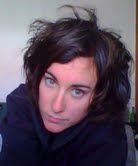 Jas writes short fiction, poetry, plays and has just finished her second novel. Her stories have appeared in various journals, including Verity La where she now reads submissions. She lives in Fremantle with her partner and dog.
Jas writes short fiction, poetry, plays and has just finished her second novel. Her stories have appeared in various journals, including Verity La where she now reads submissions. She lives in Fremantle with her partner and dog.
String
I want to stretch my life onto a long piece of string, connected to nothing at either end. Every moment which has meant something will be cut and tied back together. I cut the string to signal the heart stopping, I tie it back together to show I am still alive. I have to cut it several times, here for when I realised your beauty, and here again when I realised my love. I’ll cut it when you come back to me, just like I did when you left.
The lesson of love and cigarettes
You tried to teach me how to roll a cigarette; I roll my own now with such ease that I forget it was you who taught me and only think of it once five years later. I remember sitting on your balcony, which we peered over in silent agony waiting for your girlfriend to arrive. You taught me ill-fated love. You taught me to make you gin and tonic while you begged your mind for any excuse to ask me to leave, and found none, and so I stayed and brought you the gin you drank so well. You taught me the game of love, the notion of winning and losing, and you were my first loss. You taught me secrets, how to keep them and how to confess them at the wrong time. You taught me to swallow love and burn desire. You taught me the power of a door—once closed—a lover can never enter. You tried to teach me how to roll a cigarette. I roll my own now and think of you, but just this once and not again for another five years.
Winter
Suddenly the night air
laid down its arms
and allowed the cold to take over.
And as we entered the street
we were struck with the unmoving chill
that stood waiting on the pavement
and outside windows.
Our bodies shrivelled like leaves
and we caught our breath warm in our throats.
At your house the cold was forgotten.
The frosted street lamps,
the wet grass,
our frozen breath
—forgotten.
November 5, 2012 / mascara / 0 Comments
 DianeSahms-Guarnieri is currently Poetry Editor of The Fox Chase Review, and co-curates The Fox Chase Reading Series. Her first full length collection of poetry, Images of Being, (StoneGarden.net publishing) was released October 2011. You can visit her at http://www.dianesahms-guarnieri.com/
DianeSahms-Guarnieri is currently Poetry Editor of The Fox Chase Review, and co-curates The Fox Chase Reading Series. Her first full length collection of poetry, Images of Being, (StoneGarden.net publishing) was released October 2011. You can visit her at http://www.dianesahms-guarnieri.com/
Aluminum
Unnoticed as flowers dying
or slugs crawling
they pass as divers into liquid night
mysterious as the sick yellow glow
of hazy streetlights, using a perfect
stream of blue laser light to shine into
a line of curbside recycling bins.
They mine aluminum.
It’s faint rattle wakes me
like raccoons stirring inside dumpsters.
From the distance of my bedroom window
they are of small statue; dressed in darkness
a mismatched pair: jack of spades: queen of clubs
placing each can into bundles
of plastic handled bags to muffle the sound
filling their stolen shopping carts
rolling out of sight.
November 5, 2012 / mascara / 0 Comments

John Tranter is Australia’s most highly-awarded poet. His book Urban Myths: 210 Poems: New and Selected (2006) won four major state awards, and his latest book, Starlight: 150 Poems (2010), won the Melbourne Age Book of the Year poetry award and the Queensland Premier’s Award for Poetry. He received a Doctorate of Creative Arts from the University of Wollongong and is an Honorary Associate in the University of Sydney School of Letters, Arts and Media and an honorary fellow of the Australian Academy of the Humanities. He has given more than a hundred readings and talks in various cities around the world. He has published more than twenty collections of verse, and has edited six anthologies, including The Penguin Book of Modern Australian Poetry (with Philip Mead) which was a standard text for twenty years. He founded the free Internet magazine Jacket in 1997 and granted it to the University of Pennsylvania in 2010, he is the founder of the Australian Poetry Library at http://poetrylibrary.edu.au/ which publishes over 40,000 Australian poems online, and he has a Journal at johntranter.net, a regular Commentary page at https://jacket2.org/commentary/john-tranter and a vast homepage at johntranter.com.
Photogaph: John Tranter, Cambridge, 2001, by Karlien van den Beukel
Poem Beginning with a Line by Kenneth Koch
This Connecticut landscape would have pleased Vermeer:
The pearly light that photographs the town,
The autumn blessing and the bitter cheer
of winter close behind, with frosty crown.
The weekender lies abandoned for the week,
the den and sunroom vacant. On a couch,
the New Yorker open at a page that speaks
of Aquascutum, Harris Tweed and scotch.
O Aquascutum, shield me from the blast,
And Harris Tweed, protect me from the cold.
As for scotch, let’s leave it till the last
To warm my aching bones as I grow old.
Vermeer, to please his mistress, heard her sighs,
And painted pretty landscapes full of lies.
Another Poem Beginning with a Line by Kenneth Koch
This Connecticut landscape would have pleased Vermeer —
The trash, the pickup truck, the cans of beer —
If only Vermeer hadn’t been such a shit.
Oh well, it’s hard for an artist to paint a hit —
To make the cut, to climb the greasy grade,
To make a real impression on the trade —
It’s really hard, when you’re totally pissed.
It isn’t easy, when you’ve slit your wrist.
So fuck Connecticut and fuck Vermeer —
Who is this Dutchman with his can of cheer?
I’d rather look at Guston, or some Pollocks —
Who cares if the theory’s mostly bollocks?
The landscape is really just a frame
For something that just sat there all the same.
November 5, 2012 / mascara / 0 Comments
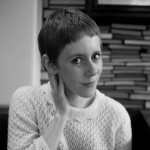 Ainslee Meredith is a poet, editor and student from Melbourne. Her poetry has been published in various places, including Going Down Swinging, Southerly, harvest, and Voiceworks. In 2011, she won the John Marden Prize for Young Australian Writers (Poetry). Her first collection will be published by Express Media and Australian Poetry in 2013.
Ainslee Meredith is a poet, editor and student from Melbourne. Her poetry has been published in various places, including Going Down Swinging, Southerly, harvest, and Voiceworks. In 2011, she won the John Marden Prize for Young Australian Writers (Poetry). Her first collection will be published by Express Media and Australian Poetry in 2013.
Fallen Woman
The clearest night is still unlit
when she calls, so closely,
on the telephone nobody watched;
saltwater and snow-water
fire-break the causeway, send
patina torches up
like false churches. The dream
is an antelope
hit to the side of the road
by a car going to swamp
for fuel. A way to ascension, this
hold on my head you have even as
I walk from South Hero
to your hotel on the game
road, forging breaths
solid as oncoming eyes.
Anna: a man followed me
because I was alone and lost
my right to choose between men,
or to not choose at all.
But the tide is low:
I am clear to cross
with my hands in my pockets,
bent over under the full moon.
Mauvais livres
Once there was a girl and she
was a ladder
inside a grandfather clock.
On her spine
a bookplate read À L’INDEX
as in ‘Brother Léon forbids this one.’
She had a date in the grand library,
but walking down Saint-Denis
the sea shone through her
brass escapement, its words
of surety: Messrs London c.
She could stand all night
on a graveyard shift
outside the Cinéma ’quoise,
unfaithful letters in
dead-cold hands, defining
those spent images – a risen
mass, clockwise, a lost
war, 5 a.m. doorstep, a child
born to a woman and a bear,
cusped sleep. After all, the librarian
won, hid her in the inner pocket
of his wooden overcoat. Like that,
a pillowcase for quiet hands.
November 5, 2012 / mascara / 0 Comments

Grace V. S. Chin, a former Malaysian journalist, holds a PhD in English Literature from the University of Hong Kong. She currently teaches English Literature and Drama Studies at the University of Brunei Darussalam. Her poems have been published in Hong Kong U Writing: An Anthology, Sweat & The City: Stories and Poems from the Hong Kong Workplace, and Cha: An Asian Literary Journal.
Patchwork
In History class, I sat with my eyes
closed, listening, to the drone
of the teacher’s voice, each word
losing its way in the drowsy
afternoon heat. A fu-
fuzzy-faced boy entered
my daymare, his disjointed arms
reached out, jarring me
into wakefulness.
“Why,” he asked
in plaintive tones,
“you cannot speak
Mandarin-ah? It’s your
Mother Tongue.”
Groggy and stunned, I groped
in wavering Cantonese, voice strained
with explanations, syllables leaking
with every translated English word.
How
do I describe
my patchwork
self? I speak
Cantonese at
home, dream,
think and talk
English
with friends, learn
to read
and write Malay
at school.
How
do I sift
these jumbled-up
tongues, as delicious
as rojak, separate one
from the other, and you lose
their precious taste.
That afternoon, his question rang
in my head, and only the branch
screeetch-scratching
the window pane outside
spoke for me.
Conversations with my dead mother
Conversations with my dead mother are rare
I should think
but she keeps coming to me
when I am quiet and pliant
in my sleep. It’s not fair,
I cry, hearing the slush
of heavy water in my bones.
“You don’t eat enough,” she declares
each time we meet. As if stuffing face
would help ease my pangs, or take away
the silted memories. She sits
with legs crossed on the kitchen
stove, a fat female Buddha
with Mona Lisa’s smile, grandly waving
her spatula like a wand, granting me wishes
that never came true for her.
She spent her life here,
boiling black bittersweet
medicinal herbs to chase away
our childhood demons, cooking
all day long in her big black
steel wok, a thousand aromas hung
in the air, each defining her
in ways we never knew — her
longbeans stir fried in belachan,
chicken braised in soya sauce
and chopped red chilis, nasi lemak,
onde onde, pandan chiffon cakes,
curry chicken, square tofu topped
with minced pork — while little brother
and I played on the table, hands deep
in floury dough as she chopped
her way into our stomachs
and hearts, and scrubbed
her wok until fingers were raw
and wrinkled. She aged
before our eyes but we
did not know it, shutting
our eyes and ears to the smashing
of glasses thrown onto walls, the yelling
for us to leave her alone, the crying
when father failed
to come home, the crashing
of her body on the floor.
All at once, I am
my mother’s daughter again,
chopper in hand, dicing small,
red onions at the sink, eyes blinded
by the sting of tears, they fall, one
after the other, flowing
like unspoken words
into the sinkhole.
November 5, 2012 / mascara / 0 Comments
 Tim Grey is a writer from Melbourne, who works a journalist, photographer and editor. He’s also part of The Red Room Company, where he helps create, publish and promote poetry in unusual ways.
Tim Grey is a writer from Melbourne, who works a journalist, photographer and editor. He’s also part of The Red Room Company, where he helps create, publish and promote poetry in unusual ways.
Cave
“it bundles in the mangrove, caulked
on waterline. the etymology incomplete;
black and clear below.
a second beer swims and fizzles
with repetition. sunrise panics and
spills like breath or my letter.
hair like hair; my hand dripping out
like your hand or my hair. red quartz
lay like leaves everywhere. don’t
american jets curl and wake
us, their hands the definite articles
that knit the map to land.
wood unravels a proletarian scent,
water burns a bag in the earth,
underneath. we wait.
hematite raft climb down and go
somewhere secret. busts in the ash-sand
peculiar grass waving a grid
on the sea-bed, the half moon
on a gorge. say nothing but the sand-path, which
is all the word means: sister”
Soon
flat sunlight transports its late sticks to that other, bees
plumb and phase , meddle with transparency; the lip
of smell. sunlight palls, a bridge through substance parted
spring is mouth in her small privacy. she watches
girls float on the asphalt pause, pool between convent and
Brougham, imagine they’re unseen. iron fencing clots and
weaves. a fairlane slows to boat. from the facility
above, the westerly fumbling at the window, grasslands
pressed against almost, municipal. the dryer wets the walls.
small language of her
shopping closing on the bench. the elevator’s every zone
November 1, 2012 / mascara / 0 Comments

Dan Disney was born in 1970 in East Gippsland, where he grew up. He has worked in psychiatric institutions, paddocks, warehouses, and universities, and currently divides his time between Melbourne and Seoul, where he lectures in twentieth-century poetries at Sogang University. Articles and poems appear in Antithesis, ABR, Heat, Meanjin, New Writing, Overland, Orbis Litterarum, and TEXT, and poems have recently received awards in the Josephine Ulrick Poetry Prize (2nd) and the Dorothy Sargent Rosenberg Prize (USA). He is on the advisory board of Cordite scholarly. His first full collection of poems, and then when the, was published by John Leonard Press in 2011.
‘only someone who already knows how to do something with it can significantly ask a name’
—— from Wittgenstein’s Tractatus
old buildings, falling out the sky
after the shriek of love leaves her body
I’m still there, a peasant and ass
laboring through dark hills toward the small bright windows
of infinity
meanwhile, afternoon seethes across a mechanical sky
the tzzz-ing of aircon
telling cicadas the rain
is a promised machine falling in pieces
‘don’t go’, I tell
her eyes darkly flicking, a slow
river in my shadow
listening to echoes deep in cold
mountains
(knee-high, green texta, weedy piss-stained carpark wall)
‘be the beauty you wish to see in the world’
I spent childhood in a hurricane. Hungry dogs wolved at the door.
Mother was an old television, father a fourth dimension. Had rain
fallen in downward lines, we’d have embraced and called it utopia
while deserts hurled themselves, sleeplessly, upon us
in the mind of the forest, the birds
are dreams tweeting rhapsodic operas. Flowers crane
their necks, louche
and metaphorical, while history looks on and falls
into place the way sunlight does. Morning is
thumping overhead, quipping ‘quieten!’ to the hives
chorusing a mist.
Thus the forest darkens, brightly
amid a copse of trees, ‘it’s not the flesh, drooped
and unblooming, but
our bones that groan so
beneath the slump of heaven’
the wooden temple amid hoarfrost. Her voice alone, is filled
with centuries. And when she talks, memories crowd
her bony feet and hop like chicks
(each sentence made of sunlight)
headline: ‘Bird of Paradise Cloned in Underworld
(Underworld Birds Not Happy)’
clutching the finger bones of dolls dreams
all the doors grinning
while night storms in: she’s there
in the corner of her lives
drinking the black
I was not there. The bird did nothing.
I was there pointing and the bird lifted and was then held out by air and this was called reality.
morning was a rain-smudged lens
focused into millennia
where strangers bent an early light
into shape
trailing the gloop of history indoors
new buildings, falling into the sky
October 27, 2012 / mascara / 0 Comments
 Ravi Shankar is a poet and critic and the editor of Drunken Boat. His first full length book was Instrumentality (Word Press, 2004). Along with Tina Chang and Nathalie Handal, he edited Language for a New Century: Contemporary Poetry from Asia, the Middle East & Beyond (W.W. Norton & Co.). His work has appeared in the New York Times and the Chronicle of Higher Education, and on the BBC and NPR. He teaches in Fairfield University’s MFA Program and in the first international MFA Program at City University of Hong Kong. Deepening Groove was winner of the 2010 National Poetry Review Press Prize.
Ravi Shankar is a poet and critic and the editor of Drunken Boat. His first full length book was Instrumentality (Word Press, 2004). Along with Tina Chang and Nathalie Handal, he edited Language for a New Century: Contemporary Poetry from Asia, the Middle East & Beyond (W.W. Norton & Co.). His work has appeared in the New York Times and the Chronicle of Higher Education, and on the BBC and NPR. He teaches in Fairfield University’s MFA Program and in the first international MFA Program at City University of Hong Kong. Deepening Groove was winner of the 2010 National Poetry Review Press Prize.
Urban Pastoral
Swarming cities,
gorged with dream,
opaque to the spectacle
of the spectral trace
left by bodies in motion,
in medias res, like after
a magician has left a pinch
of magnesium shaving
in the air to ignite
then vanished off-stage
in a wake of white
light. Not like
the Brobdingnagian
moment of monstrosity,
but rather the subtle
uncanny pushing out
gradually further
and further into
the mind until buds
burst into no blossom
ever before seen nor since.
Bop with a Refrain taken from Jonathan Safron Foer
Half-past on the 9:07 local to New Haven, the Bronx
tenements pent in vaguely post-apocalyptic paragraphs
rushing past too fast to cohere into prose, leaving loops
of graffiti, marred and boarded windows, a hoops game
glowing yellowish in the mercury vapor of street lights,
a Pontiac Bonneville, tireless, jacked up on cinder blocks.
Time waving like a hand from a train I wanted to be on.
Riding a train embodies democracy. Not like cramped,
dank seats of a bus or on the highway where cars mark
the demographic by make and model, here everything
is equalized, time and space included. The post-punk
pierced girl, ears plugged with music, sits next to a man,
silk cravat loosened, fixated on his snuff box, providing
the grand illusion of temporal continuity, the centuries
stacked one on top of the other, a set of encyclopedias.
Time waving like a hand from a train I wanted to be on.
Slouched in the seat, westbound, my forehead pressed
to the scratched up window, rapidly being carried away
from the city, something important recedes, something
else coheres, but I can’t seem to conjure a single word
as to what these might be, why I’m filled with such vast,
implacable sadness. I just want to get home, go to sleep.
Time waving like a hand from a train I wanted to be on.
October 27, 2012 / mascara / 0 Comments
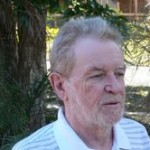 Mark Young has been publishing poetry for nearly fifty-five years. His work has been widely anthologized, & his essays & poetry translated into a number of languages. He is the author of more than twenty books, primarily poetry but also including speculative fiction & art history. He is the editor of the ezine Otoliths. He lives on the Tropic of Capricorn.
Mark Young has been publishing poetry for nearly fifty-five years. His work has been widely anthologized, & his essays & poetry translated into a number of languages. He is the author of more than twenty books, primarily poetry but also including speculative fiction & art history. He is the editor of the ezine Otoliths. He lives on the Tropic of Capricorn.

A line from Frantz Fanon
Leaving aside the
Gaelic for kiss my
ass, most Declarations
of Independence are
top heavy with awk-
ward or extremely
dated references. Some-
times they present
in the form of a
pure orange pocket
synthesizer with a
sound set restricted
to industrial use
because of extremely
mixed reviews. At
other times as an
holistic framework
that purports to look
at all aspects of life
as spiritual practice
but then recommends
the confining of women
to the home & the use
of tanks to shell densely
populated areas. Colon-
ialism begets patriarchal
systems. The methods
devour themselves.
A line from Fidel Castro 2
Winter is getting me
down. A unit of cult-
ural information has
put the Galactic Senate
under attack, driving
it from crisis to crisis.
That slavery is inexorably
tied to the availability
of oil is the standard
paradigm for most
crises; but now recent
breeding population
trends of farmland
birds need to be fact-
ored in. Please complete
the enquiry form below
& I will provide you
with a list of exclusive
Havana Vacation Homes
available for weekly rent.
A line from Courtney Love
English newspapers
laced up their tennis
shoes, Real Madrid
went on another goal
spree, the strife-prone
household insulation
program turned on
its heel & headed to
a park; but not even
a change in appetite &
toilet habits can stop
the generally low inter-
city mobility of urban
populations. So. We
drowned them all in
their swimming pools.
October 27, 2012 / mascara / 0 Comments

Judy Johnson has published three poetry collections, a verse novel and a novel. In 2011 she spent a month at The Tyrone Guthrie Centre in Ireland as part of the Varuna Alumni exchange program. A poetry collection is forthcoming in 2012.
The Right Fit
Always your thoughts
too big,
too small
for the world.
As though a seamstress
took your measure early on
with a cool yardstick
and what was kept for the record
was an outline
you immediately outgrew.
There is no cure
for not living in the moment
but it can’t hurt to ponder
the methodical dust
released by its action
instead
of the tailor’s chalk mark.
It can’t hurt to meditate
with a mouthful of pins.
Words, after an absence
Tend the graves of photographs,
love letters, dried daisies.
Finger the devotions
one by one
like knots in a prayer rope.
Gather inklings and injuries
as kindling for fire.
Attune to textures
especially
the soft crystals of silence
in the air above old monasteries.
Listen to which footsteps
placed
on the heart’s risers
produce a squeak
and which treads
are noisless.
Accept that the poem already exists
in no known language
and in perfect order.
And now that your task
is impossible
take the one tool you have.
Try hard to find
a way back to the page
with words.
Try harder to do no harm.
August 26, 2012 / mascara / 0 Comments

Wendy Chin-Tanner’s debut collection Turn is forthcoming from Sibling Rivalry Press in March, 2014. Her poetry has appeared in Softblow, The Mays Anthology of Oxford and Cambridge, The Saint Ann’s Review, and The Raintown Review. She is a Founding Editor at Kin Poetry Journal, a Poetry Editor at The Nervous Breakdown, and the Staff Interviewer at Lantern Review.
No Moon
In the old beige station wagon straining forward
on the road like a dog
frantically sniffing for the way home,
we are lost in the winding countryside, overgrown
branches scratching the roof
as the signs bearing route numbers grow
too dark to read after a day spent hunting real estate;
a house, some land, some water
where we could run, a precaution after Chernobyl
when we drank only powdered milk and frozen juice for a year.
In the front seat, Ma and Ba sit
silhouetted in silence, sustained in the green glow
of the dashboard, a play
of shadows flitting from the landscape over their faces.
Across the broad lap of the leather backseat, I lie
supine as the daylight that had earlier been
so dazzling and bright dancing
in the paisley of the real estate agent’s scarf
fades from dusk to a black
whose dense immensity, though the opposite
of light, holds its own kind of clarity,
a reminder of how far
you could fall, and I imagine that the car door
could suddenly unlatch and I would fly
out into that darkness, into the woods, into the universe.
Outside my window above the blur of dark shapes,
I scan the horizon for a steady still spot,
but a shooting star screeches like a skidmark
across the night and amid the clouds tumbling
thick and ink-smeared and round,
there is no moon to be found until long after we arrive
when its battered face appears,
a pale ghost hanging in the bright morning sky.
Little Death
Grandma, your tongue twists, making half-joined
sounds. Your good hand points to the bandages, asking
why and when we will go. The nurses studiously
avoid your eyes, accustomed in their way to such
little scenes; another day, another little death.
The summer I learned to read, I asked you the questions
for the citizenship test. We rehearsed them
over and over again: Are you a Communist?
No! you’d cry and I’d nod yes, smiling but afraid you might
not pass until finally, standing before the judge, you pledged
your allegiance, hand over heart. Your skin is soft and
plump like a girl’s, swollen from the IV, liver spots scattered
sweetly like Brown-Eyed Susans in a field
of bruises. I massage your insteps, running
my thumbs again and again over
your warm little feet. In my hands,
they fit perfectly, arching and curling, toenails like pearls
clipped into miniature half moons. Each visit, we do this
and then I leave. At home, with strong soap, I scrub
my hands clean. And I lead my husband to the bedroom.
August 26, 2012 / mascara / 0 Comments

Floyd Cheung teaches at Smith College in Northampton, Massachusetts. His poems have appeared in various journals including The Apple Valley Review, qarrtsiluni, and Rhino.
Waylaid
brought a book
but watch her instead
only the width of the bar
between me and her workstation,
heat of the wood-fired oven
she kneads expertly
her brown fingers slender and sure
but must be in training
while twirling the dough
says shit when she rips it
mounds my green salad too high
popping into her mouth
the fallen leaves
Crow Catching
A few deft steps.
Striking with both hands,
my father caught the crow–
wings pinned,
talons pointed away.
We had been strolling–
my mother and father,
my wife and me.
Their first visit
to our first home,
an apartment overlooking
a dumpster near the levee.
I never saw him
do this before,
though I knew
my grandmother
sometimes made
bird soup.
Performance now,
provision then.
Seraphim
Billy Collins writes of readers
who tie up poems, beat them with hoses,
torture confessions out of them.
But some poems are so strong
they cannot be bound.
We can wrestle with them
like Jacob with the angel,
but they grant us no blessing.
These seraphim–
ropes burn right off their blazing bodies.
Only turn the page and hope
they let us be.
On Eating Peanuts
It only hurts when I chew
on the left side of my mouth.
My dentist tried three times
to fix the offending tooth,
but I will not let him try again.
It’s not his fault. He trained at Harvard.
Who am I to live pain-free?
Now I’ve the opportunity to remember
frailty, mortality. Pain
a part of life, each peanut a jolt
of awareness and sin.
Thomas More had his hair shirt,
I molar #19.
August 26, 2012 / mascara / 0 Comments
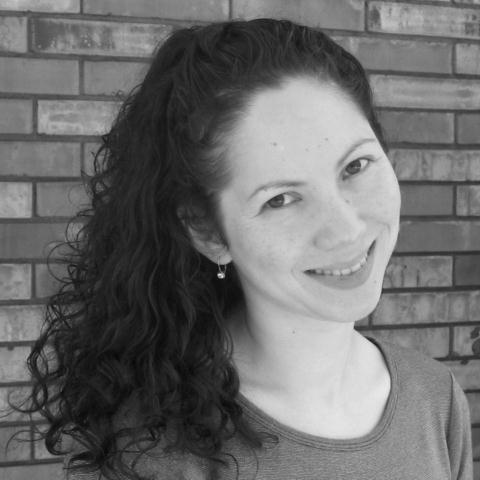 Kim-An Lieberman is a writer of Vietnamese and Jewish American descent, born in Rhode Island and raised in the Pacific Northwest. She holds a Ph.D. in English from the University of California, Berkeley. Her poetry collection, Breaking the Map, won the 2008 First Book Award from Blue Begonia Press.
Kim-An Lieberman is a writer of Vietnamese and Jewish American descent, born in Rhode Island and raised in the Pacific Northwest. She holds a Ph.D. in English from the University of California, Berkeley. Her poetry collection, Breaking the Map, won the 2008 First Book Award from Blue Begonia Press.
Unearthing Song
Today I am a child, leaping from bank of silt
into chest-deep canal, droplets silvering my brow
in the flat sunlight. Yesterday I was my uncle,
my grandfather, my grandmother, a nameless row
tied at the hands to haul buckets of dirt away
for a whisper of grain, chopping the steel-hard ground
to the clashing of hubcaps, staccato bullet-spray
breaking time apart. Gun muzzle jabbed in the back,
we slash at the land until its arteries lie splayed
and splashing, surging, indelibly green. We take
what we are given. We swallow what we must.
We clear skulls and jawbones from the floodgate
and burn what we are told to burn. Then today I am just
anyone, some random onlooker reading a dispassionate
news clip about the children of a faraway harvest,
six boys leaping from mudbank to silvering wet,
fed and happy, ignorant of what soft soils they till,
what buckets and buckets of blood. Every night
we rinse the white dust from our rice, let it boil
until the pot’s steaming broth is fragrant and clear,
no trace of iron or salt, no tang of human ill.
Meal after meal, we refuse to taste the labor,
the dark coagulate lodged between tongue and teeth.
So close the eyes. Swallow. We will dream our water
and bread in the sweetest light, will fully believe
our foods pure and close to the source, will live days
drunk on ash and bone-flake, hungering for need.
Every season a communion. Every year another seed.
The Anti-Chinese Riot at Seattle, Washington Territory, Drawn By W.P. Snyder, From Sketches By J.F. Whiting, of Seattle (Harper’s Magazine, March 1886)
A century’s span—candles to streetlights,
horsecarts to highways, whole city blocks
rising and crumbling, ungathered, remade—
but surely that morning was Seattle as ever,
drizzle and damp, cool salt-cornered air,
sun not yet risen between sheets of grey.
One man graved this image, line by line,
carved out jackets, shirtsleeves, collars, fists,
a dark throng of hats. We do not need captions
to understand the crowd’s clamoring roar,
the police guard swashing rifles overhead,
or the begging, frenzied figures at the center.
Their billowing black sleeves, their slippers.
Their long manchurian braids. Loudly limned
even in miniature, faces oval and eyeless,
absent any tint to warm the honey of their skin.
Some stand in profile, arms reaching outward.
Some run, but not far. Some kneel as if to pray.
But no hurried fear in the artist’s arrangement.
One strong line sweeps sharply left to right,
cordoning the bullies, centering the victims.
The reporter’s type tells how the quarter doors
yielded to quiet force, to a shivering multitude
dragged from sleep and herded to the harbor.
Decades shy of the flashbulb, the halftone,
we can only imagine the truths of this tale.
A terrified boy stuffing his bag, no time to find
the silks that his sister hand-stitched to fit.
A pile of gambling counters, an upturned chair.
Blood and breaking. Cold tea in half-empty cups.
All we have here are faint echoes of memory,
an after-hours geometry, a footnote on the fold.
And just one clear face frozen in the scene—
low, corner right. Thick mustache, dark felt hat.
He is cheering the mob. Or protesting. Or simply
bearing witness, pencil in his upraised hand.
August 26, 2012 / mascara / 0 Comments

Jennifer Tseng’s book The Man With My Face (AAWW 2005) won the Asian American Writers’ Workshop’s National Poetry Manuscript Competition and a 2006 PEN American Center Beyond Margins Award. Poems from her new manuscript Red Flower, White Flower have appeared in or are forthcoming in Cura, H.O.W. Journal, PEN America, Ploughshares, and From the Fishouse. Chinese translations of several Red Flower, White Flower poems recently appeared in the Beijing journal Dear Whistle.
I love the poets ruled by love
Who write: I am vexed to love you.
As if love is a dog that leads
Them like lambs to the slaughter.
To be a lamb for love is human.
To be a dog for love is human.
Here outside that pasture I am
Ruled by something else and yet
I love the poets ruled by love.
Please, take me to their leader.
Elegy with Red Flower
One vermillion poppy in a clover field.
Rain the field drinks you drink.
Sun that lights you lights the field.
The beasts trample you; the beasts ignore you as food.
They are like pandas who only want bamboo.
Though you grow in their sloe, cow-shaped shadows,
You will never be slung by their continental tongues,
Feel their teeth clip you like grass from your stem.
To them, you are nothing.
A failed color, a false scent. To them,
You are a clover gone wrong.
What then will devour you, who then
Will you be, here, where you have landed,
Red flower in a stranger’s green field?
“…not quite the rose/not quite the roots…” – Lee Herrick
Stem of the Hybrid Perpetual
You hold the rose aloft.
You elevate.
If root is a secret
& rose a prize,
You are the telling.
In you the two are sisters.
Throat of happiness,
Singer of flames, music
Of red & white, your
Pinnate leaves evoke
A strange bird’s flight.
Green road, you
Begin in darkness,
& end in light.
You touch everything.
You ascend.
You are the axis.
At your apex
A nation grows.
Suitor of heaven,
Child of earth,
Bearer of thorns & gifts,
You hold the rose.
August 26, 2012 / mascara / 0 Comments

Lee Herrick is the author of This Many Miles from Desire (WordTech Editions, 2007) and Gardening Secrets of the Dead, forthcoming from WordTech Editions in 2013. His poems have appeared in ZYZZYVA, Hawaii Pacific Review, Many Mountains Moving, The Bloomsbury Review, and online at From the Fishouse, among others, and in anthologies such as Highway 99: A Literary Journey Through California’s Great Central Valley, 2nd Edition and The Place That Inhabits Us: Poems from the San Francisco Bay Watershed. He is the founding editor of In the Grove, and he was the guest editor of New Truths: Writing in the 21st Century by Korean Adoptees for Asian American Poetry and Writing (2010). He lives in Fresno, California and teaches at Fresno City College and in the low-residency MFA Program at Sierra Nevada College.
Kwi Ch’on
for Ch’on Sang Pyong, 1930—1993
Because after imprisonment, you could laugh
with your mouth so wide open, as if to swallow
the swirling bats of the CIA, because when you
disappeared in 1971, your friends thought
about your poems and you going back to heaven,
because I am dreaming of the sunset over Eurwangni
tonight, there is jujube tea in Insadong waiting for us.
Did you drink every hour of 1972?
And when they found you, unable
to remember your name but that you were a poet,
did you remember the answer to your own question?
That there is no answer at all but the request that
someone would find you in that fractured slur,
the tired lean and the pen your only possession,
that someone like her, with a language like food,
would know how tea can restore such fatigue?
Self-Portrait
I am twenty-five yards past the last breaking wave
a flute plateaued at the maestro’s steady baton hand
I am five stones from the last good wind
I am four bones from a cow after the shotgun.
I am the idea that did not detonate.
Brothers, we are Korean, so we know
about fracture – family, country, tongue.
We know the volcanic descent of government.
Once, a woman told me
I am the only one who understands
the cost of her survival.
So we did all we could.
We touched each other’s hands,
inhaled deeply, contemplated not letting go.
August 26, 2012 / mascara / 0 Comments
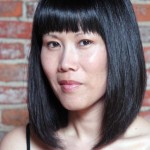
Katie Hae Leo is a poet, playwright, and essayist whose work has appeared in journals such as Asian American Literary Review, Water~Stone Review, Kartika Review, Midway Journal, Asian American Poetry & Writing, and Asian American Plays for a New Generation (in Sun Mee Chomet’s Asiamnesia). Her chapbook Attempts at Location was a finalist for the Tupelo Press Snowbound Award and is available through Finishing Line Press. She holds an M.F.A. in Creative Writing from the University of Minnesota.
How to Divide a Peninsula
Here is a table. It is a good table. We agree that this table must be spread, like all good tables. But what to spread it with? Here is a fine linen, here silk, here cotton, here a stiff wool. Each will share the beauty of this table. As a child I often sat under a table but never once thought about what the table wanted. Only legs and laps, only who owned them and what they meant to me. Such is the strange fate of tables. To exist only as we use them. Tables do not know what they want. Tables know heat and cold and the hands that touch them. They measure time in flakes of wood. If they could speak, their voices would be filled with dirt.
No Gun Ri, or The Battle That Wasn’t
Four hundred porcelain cups lie broken in the sun. Who will take responsibility?
The policy regarding cups dictates that all cups must first apply to the Bureau of Ceramic Housewares for permission to assemble in open fields. This includes but is not limited to tea parties, picnics, family reunions, and outdoor banquets.
The official position on destruction of fine china is illustrated in a letter from the Ambassador of Dining to the Undersecretary of Kitchen Behavior. In this letter the ambassador worries that the extermination of unauthorized cups within the conflict zone might damage relations between tea drinking countries.
Remains of broken cups are still being discovered throughout the land. If cups had souls, they would roam the streets, unsatisfied.
Meanwhile, the Ministry of Collective Memory asks that all persons with knowledge of the cup incident report to their local branch, where they will be rewarded with a Starbucks gift card and a lifetime subscription to People magazine.
August 26, 2012 / mascara / 0 Comments

Jenna Le’s first full-length collection of poetry, Six Rivers, was published by New York Quarterly Books in 2011. Her poems, essays, and translations have been published by Barrow Street, The Brooklyn Rail, New York Quarterly, Post Road, The Rumpus, Salamander, Sycamore Review, and others. She has been a finalist in the William Carlos Williams Poetry Competition, a Pushcart Prize nominee, and a nominee for the PEN Emerging Writers Award.
Phillips Beach, 6 AM
The moon, to Tantric Buddhists, is a symbol
of masculinity. Watch how he ambles
around the earth, an active little boy
gathering dirt-clods in his grubby hands,
gathering the tides, while the sun smiles blandly
from her throne at the milling hoi polloi.
It’s easy to see these things from the helm
of a boat off Phillips Beach at 6 AM:
the sun cupping her pregnant belly with both palms
the way a pyromaniac cups a flame.
Devotional
With the underside of your whiskered boar,
cast a shadow on my sprouting bean.
Bite a clay pipe while drowsing in my chair,
but no harder than you’d chew your own lip.
When tides submerge the footbridge between us,
send a moth in a box as your proxy.
Mention your wife in your will, but only as often
as you’ve cried out her name in dreams.
In my orchard, the apples wear eyepatches
to hide their brown spots from view.
At the bottom of my wishing well,
a merman half-devoured by sharks lies gasping:
it’s been years since the well has known how to tell
my deepest wishes apart from his.
To an Aspiring Blues Singer
Your voice is so sweet that a heifer in heat
would tan her own hide, just to make you new shoes.
Your voice is so pure, all the butter and meat
in my pantry is yours to devour, if you choose.
Your voice is as green as unripe apple juice
that on your piano keys dribbles and spills.
But you’ll never be able to master the blues
if you think love’s an illness responsive to pills.
If you doubt me, just look at blues music’s elite:
Etta James, the great dame who on old records coos
that blindness is preferable to keen-eyed defeat,
knew all about love’s brutal nature. She knew
neither cigarettes, heroin, Prozac, nor booze
can stifle the pain of love’s porcupine quills.
Knew you’ll never be able to master the blues
if you think love’s an illness responsive to pills.
Or consider Ms. Joplin, who, quite indiscreet,
took the stage to lament all the blowhards she’d screw
and be screwed by. Love’s nothing so simple or neat
as a serotonin shortage, eh, shaggy chanteuse?
Love’s no less than a god, the dark twin of the Muse,
and Janis was one of his martyrs, his kills.
Child, you’ll never be able to master the blues
if you think love’s an illness responsive to pills.
I know what’s at stake, what you’re risking to lose:
when folks doubt you’re sane, they belittle your skills.
But you’ll never be able to master the blues
if you think love’s an illness responsive to pills.
August 26, 2012 / mascara / 0 Comments

Jeffrey Hecker was born in 1977 in Norfolk, VA, of quarter-hapa Japanese descent. A graduate of Old Dominion University, his debut book Rumble Seat is published by San Francisco Bay Press (www.sanfranciscobaypress.com). Recent work has appeared in altdaily.com, Cannonball City, The Waterhouse Review (where he was nominated for a 2011 Pushcart Prize), the Los Angeles-based Zocalo Public Square, and forthcoming in London’s La Reata Review. He lives with his wife Robin in Olde Towne Portsmouth, Virginia, USA.
Generations of Robertos Paying Attention
for Lisa A. Flowers
Roberto II knows exactly how many people live in every hacienda on the coast.
Roberto III knows roughly how many haciendas stand unoccupied on the coast,
though none of the owners.
Roberto IV couldn’t locate the guest bathroom in his own hacienda.
Next week, Roberto III plans to drive Roberto IV to the countryside,
get lost on purpose.
Can Roberto IV handle family business if Roberto III and Roberto II
disappear, during the Rapture for instance? This is to be the test.
Can Roberto IV rely upon an outdated map of a snow pea farm,
willful local migrant workers pointing shovel blades from sky to dirt?
Unfortunately, we’ll never know. Roberto IV and Roberto III
visit Roberto II’s hacienda.
The Boricua Popular Army visits seconds later,
gun stocks pressed hard against right shoulders,
even if left-handed.
Roberto IV asks Roberto III
“Why do mercenaries move so jerky?”
before both are shot dead.
Roberto III had wanted to answer, “They’re appraising
our frescoes,” which would have sounded patronizing,
but understand Roberto III had asked Roberto II
the same question at a less strenuous time
and Roberto II had blown him off by cigar-puffing.
The sultriest senorita among all Roberto IV’s haciendas prefers to sleep
in Roberto II’s hacienda. She’s shot asleep. Her sister is, instantly sultrier,
shot awake. This is probably all for the best.
Large Moon Evaluation
Lieutenant Uhura was the first woman
to say no woman
completely loves you
until you’re completely wrong
and she completely backs you.
Lieutenant Uhura was the first mother
to tell another mother quit
talking like an infant to your husband
baby like boss
father like god
sister like mechanic
sitter like physician
Christmas tree salesman like rapist
Shaposhnikov like Rachmaninoff.
Lieutenant Uhura, asked about earth,
responded “you mean
the planet
I’m finally off?”
Bad Bathroom Breaks
Coyote Chipotle Eatery, 3 miles outside of Jeddito, Arizona
The sink to urinal threshold tile transitions Herringbone Mosaic to Basketweave Marquina
without warning. The most we can hope for is to shake dry our urethras and continue
to look forward. The pattern projects a step up where there is no step up. There is no step.
Many cowboys (I suspect cowgirls in the next room too) fall to the smooth sticky surface,
rebirth the word doosey. I follow with the word illusion. I wash but I do not dry my hands.
Rest Area, Curt Gowdy State Park, Cheyenne, Wyoming
It needs to be explained someday why a factory-produced sign appears only on the women’s
lavatory door reading: NO DWARVES BEFORE 6:30 P.M. I return to the jeep eager to tell
my wife, who didn’t have to pee, a timeless story. She cuts me off. In the parking lot,
she tells me I just missed a long line of tiny hookers, all checking wrist-watches,
brush past her kneecaps. I ask, “No shit?” She asks, “Didn’t I tell you I didn’t have to go?”
Homedale, Idaho, 4-H, Port-O-Let
This town’s name was chosen from a hat. Half the commode seat’s missing. Front to mid-back,
it could be a mouth-guard for a giant. No tank cover, the flapper gasps. To sit requires a butt-
compression counterproductive to the act required of its cheeks. I hear spades shoveling outside
these plastic walls, unsuccessful prior visitors digging holes. One says she’ll happily leave her
tool for me in case I’m irregular. I don’t know how to thank her. I’m regular.
August 26, 2012 / mascara / 0 Comments
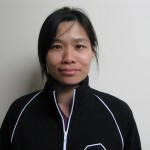
Yim Tan Wong was born in Kowloon, Hong Kong, and spent her formative years in the American mill town of Fall River, Massachusetts. She studied English and French Literature at Emory University and earned an MFA from Hollins University, where she also received a teaching fellowship and an Academy of American Poets Prize. Her poems have appeared or are forthcoming in The Portland Review, Spillway, Off the Coast, Crab Orchard Review, Crab Creek Review, MARGIE, and Michigan Quarterly Review, among other journals.
Acacia Moon / Tornado Snow
after René Magritte’s Key to Dreams (1930)
Slice a window into six glass squares. Float an egg
inside square one. In two, flaunt a footless shoe
with tassels & a two-inch heel. Drift a derby hat
beneath the tacit egg, and below the shoe, a candle melts,
flame unflickering, still as water imitating glass,
block five’s clear tenant. Frame six: a sledgehammer
mid-swing. Angled forty-five degrees, the sledgehammer
is labeled le Désert as though smashed shells of eggs
compose the desert’s sand instead of shattered glass.
Glass, aka l’Orage, is a static, crystal storm, what the shoe
once bet the nimbostratus could not do. Definitions melt.
Word & picture alloys vow: “Snow” is but a word for “Hat.”
Have you ever worn storm snows like dusty, floppy hats?
Unleashed a glass anger that could break a thousand hammers?
Or watched a mirror liquefy your face & melt
its cloud-patched skin into the canary scramble of an egg?
Have you felt in you a ghost foot as though you were a shoe?
Or panicked when you did not see yourself in a looking-glass?
Spell “Glass” S-T-O-R-M, though others may insist G-L-A-S-S.
Letters are but coins: They clink & toast inside a tongueless pauper’s hat.
Whether you call La Lune “the moon”, “a camel” or “a gnu”, a shoe—
but not a shoe—is what the high-heeled, tasseled hammer
slings, cooking dim, dim din. Yet, trust René’s elliptic map, equating “Egg”
to tree “Acacia,” burning worn-out routes until it melds melted
canals into nightmare, love, a war, a law, or lie. Clarity forever melts,
twists up the funnel’s train wreck roar & snowflakes made of glass
mosaic the tornado’s spinning trail of wrecks. An orphaned egg,
free-range, freestyles new names for moons circling planet Hat.
Cosmologists calculate no ceiling to what one can hammer
picture-word relationships into, so, wear this chaos like a shoe
of shell, of fire, glass or sand, this shape-shifting shoe
that glistens like a patent leather moon, ever-melting
cantabile through freelance wind and wax. The master hammers
silicate alphabets out of shredded dictionaries and prescription glass
to read, to really see, past paint, past words of sand, la Neige, the hat,
giraffes who munch acacia leaves where some insist they see an egg.
Rocket through this shuffled world; wear its red-red shoes of glass.
Words are storms & beasts: they melt & mate, trade identities like hats.
Sledge your hammer! Order disorder, the mayhem omelet of a restless egg.
Rene, on your birthday,
I did not wash the green apples before I ate.
That would have been like bathing a reel of film,
or rinsing the telephone in soapy water.
Apples were machines linking brushstrokes
to a crucial deep breath I fought to catch
and stack inside my chest
though my lungs resisted, contracted.
To disconnect distances from Brussels
to Boston, my teeth to your hair, from smoke
to a tuba on fire, from rain
to an age of ice —trapped between
what I tasted with my eyes, and pinched
by what I saw in shadows, sung to
by pulses I heard with the heel of my hand,
whatever was trapped between sensation
and translation, in one bite, my incisors
sliced past its sour skin,
through its wiry core, to the secretive seed.
It was the core of a day that could fill
a room with an apple tall as the ceiling,
wide as the Seine. I bragged
to the nearest listening soul, an open, floating
umbrella, that this was my first
fair -weather cloud.
My heart, also an umbrella, unsure
it was raining, opened, collapsed, opened once more.
August 26, 2012 / mascara / 0 Comments
 Rey Escobar lives in Evanston, IL. with his wife Christine, founder of Green Parent Chicago (http://greenparentchicago.com), and their two self-educated kids, Ezra and Lucie. He is a member of the Next Objectivist, address in the ether: http://nextobjectivists.blogspot.com/, physical evidences: twice a month at http://messhall.org/
Rey Escobar lives in Evanston, IL. with his wife Christine, founder of Green Parent Chicago (http://greenparentchicago.com), and their two self-educated kids, Ezra and Lucie. He is a member of the Next Objectivist, address in the ether: http://nextobjectivists.blogspot.com/, physical evidences: twice a month at http://messhall.org/
Identity crisis invents the indigo Inspector Sands, his audiophile abiding
idiopathic criticism inverses the indisposition Inspector Sands, his bitch box budding
idleness crock investigations the indium Inspector Sands, his ceramic pickup callow
idyll crone invidious the individualize Inspector Sands, his derive four channel dewy
igloo cropper invitationals the indolent Inspector Sands, his ear blower enduring
ignominy crossbreed invokes the induce Inspector Sands, his fueled audio frozen
indicated-horsepower crossfire invulnerable the indulged Inspector Sands, his gramaphone green
ilium crosspollination iodizes the industrialized Inspector Sands, his high-fidelity hand in glove
illadvised crossway innings-pitched the inebriated Inspector Sands, his intercom intact
illfated crotchety infrared the ineligible Inspector Sands, his jukebox juiced up
illinois crowd irate the inertia Inspector Sands, his kinetic stereo keeping things raw
illstarred cruciate iridiums the inexcusable Inspector Sands, his lance voice lasting
illusage crudity irk the inexpert Inspector Sands, his mono needle maidenly
illustrate cruiser ironic the infallible Inspector Sands, his nickel quadrophonic new
image crummier ironware the infantile Inspector Sands, his out herod Herod original untouched
August 26, 2012 / mascara / 0 Comments
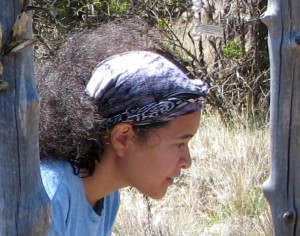
Tiel Aisha Ansari is a Sufi, martial artist, and data analyst living in the Pacific Northwest. Her work has appeared or is forthcoming in The Bruised Peach, Islamica Magazine, Windfall, Verseweavers, The Lyric, Barefoot Muse, and the VoiceCatcher anthology from Portland Women Writers. Her poetry has been featured on KBOO, Prairie Home Companion and MiPoRadio and has been nominated for a Pushcart Prize. Her collection Knocking from Inside is available from Ecstatic Exchange. You can visit her online at https://www.knockingfrominside.blogspot.com and https://www.smashwords.com/profile/view/TielAishaAnsari
At the Japanese Peace Garden in Waterfront Park
the boulders stand brown and angular
like neglected teeth. Chiseled kanji
spell out the haiku of exile
across their weathered faces.
Here, a glimpse out a train window
of a home rolling backward out of sight;
there, the names of camps,
desert stretching away
beyond barbed wire.
Today cherry petals were falling,
stroking the surfaces of stone.
Today a young couple was being photographed
in a bridal dress and a natty suit.
Holding each other under the flowering trees
and drinking from opposite sides of a fountain
like their parents, sipping from opposite ends of an ocean.
I thought the rocks had turned to a row of old women
wiping drops of Oregon rain
from their stone faces.
I wanted to line up a row of pebbles at their feet
and say “Here, Grandmothers,
here are your grandchildren.”
Scraps
The old women who came over from China
owned narrow-skirted dresses with round high collars
that buttoned above the left breast. Dresses made from:
grey silk embroidered with flying cranes
scarlet heavily brocaded with bamboo
pink satin heaped with plum blossoms like summer snow.
Delicate fabrics stretched over stiff shells.
We, the daughters fed on American beef
the round-eyed granddaughters,
could not fit our larger frames into those dresses.
We cut them up, repurposed the cloth
as vests or fancy cushions.
I had never seen my grandmother wear those clothes.
She chose wash-n-wear, slacks and pantsuits, occasionally a skirt
saying “It’s easier,
I’m too old for fancy clothes.”
I quilt together scraps of cloth and stories:
this is the dress in which my grandfather first saw her
and forgot all about the political meeting he was supposed to attend
this is the one she was wearing when the Japanese bombs began to fall
and she protected my infant mother with only her own body
in this one she took ship for a new land that would fill her children’s mouths
with a foreign tongue. I rip a seam.
I stitch another square.
August 26, 2012 / mascara / 0 Comments
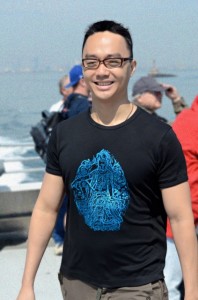
Jason Wee is an artist and a writer. He is a co-editor of Softblow Poetry Journal and the author of My Suit (Math Paper Press 2011). He lives in Cambridge, New York and Singapore.
Parts
Think of an older body lying on
top of a younger body.
Think of that body above waking up
slightly startled at the sight
of having slept with one’s long lost self,
the bed a time machine
bringing one back to another dark room,
when one touches a stranger
for the solace usually found alone.
Think of the body below
stirring, brushing its hands on bits and parts,
a pit of coarse hair, elbows,
ribs, returning to slumber, satisfied
with the evidence of flesh
careworn and starved, knowing the shape of
a self so disappointed
proves its power to unmake experience,
to ignore pain as it stands
for another year, hour, another song
passing. The older hums, stops.
When the body below wakes, will it know
those eyes it looks in on, or
nothing grasped, will it ask to be known
naked and seized for the first time?
August 26, 2012 / mascara / 0 Comments

Vanni Taing is currently pursuing an MFA in poetry at Western Michigan University, and is a 2010 recipient of WMU’s Gwen Frostic Creative Writing scholarship. Her work has appeared in Lantern Review, CURA, and others.
The Boat
I built my home in a bottle. My father said I should have built a plane, but I said, no. Think of the expenses. A Gulfstream can burn anywhere from 250 to 440 gallons of fuel an hour. Where will the money come from, I ask him, I have no money. So I built a small boat in my bottle to retire to when I tired of my mother’s accusations: You want get raped, huh? You cut hair like boy. You ugly.
Her knuckles clock the glass. I do not come out. I strap myself in and wait for the gales to subside. She rolls the bottle, round and round and I hear the sounds of air: pressure, release, confinement. I peer up the thick neck and study its narrow mouth.

 Vesna Goldsworthy (1961, Belgrade) lives in London and writes poetry in English, her third language, as well as her native Serbian, in which her poetry is much-anthologized. Aged twenty-three, she read her poems at a football stadium to an audience of thirty thousand people. She moved to Britain soon afterwards and did not write a line of poetry for over twenty years. Her Crashaw Prize winning debut poetry collection in English, The Angel of Salonika (Salt, 2011) was one of the Times Best Poetry Books of the Year.
Vesna Goldsworthy (1961, Belgrade) lives in London and writes poetry in English, her third language, as well as her native Serbian, in which her poetry is much-anthologized. Aged twenty-three, she read her poems at a football stadium to an audience of thirty thousand people. She moved to Britain soon afterwards and did not write a line of poetry for over twenty years. Her Crashaw Prize winning debut poetry collection in English, The Angel of Salonika (Salt, 2011) was one of the Times Best Poetry Books of the Year.

 Brenda Saunders is a Sydney poet of Aboriginal and British descent. She has published three collections of poetry, her most recent, The Sound of Red (Ginninderra Press, 2013). Her work has also featured in anthologies and journals and was included in Best Australian Poems 2013 (Black Inc.) In 2013 she was awarded a Resident Fellowship to CAMAC Arts Centre in France where she worked translating into her poetry into French.
Brenda Saunders is a Sydney poet of Aboriginal and British descent. She has published three collections of poetry, her most recent, The Sound of Red (Ginninderra Press, 2013). Her work has also featured in anthologies and journals and was included in Best Australian Poems 2013 (Black Inc.) In 2013 she was awarded a Resident Fellowship to CAMAC Arts Centre in France where she worked translating into her poetry into French. Joel Ephraims lives on the South-East Coast of NSW. He studies creative writing, philosophy, and literature at the University of Wollongong. In 2011 he won the Overland Judith Wright Poetry Prize and in 2013 his chapbook of poetry, Through The Forest was published as part of Australian Poetry and Express Media’s New Voices Series.
Joel Ephraims lives on the South-East Coast of NSW. He studies creative writing, philosophy, and literature at the University of Wollongong. In 2011 he won the Overland Judith Wright Poetry Prize and in 2013 his chapbook of poetry, Through The Forest was published as part of Australian Poetry and Express Media’s New Voices Series. 
 Autumn Royal is a poet and PhD candidate at Deakin University. Autumn’s writing has appeared in publications such as Antipodes, Cordite, Rabbit, and Verity La.
Autumn Royal is a poet and PhD candidate at Deakin University. Autumn’s writing has appeared in publications such as Antipodes, Cordite, Rabbit, and Verity La. Saba Vasefi is a poet, a documentary filmmaker and human rights activist. She was a lecturer in Tehran, Shahid Beheshti University. She became a member of the Committee of Human Rights Reporters. She also worked as a reporter for the International Campaign for Human Rights in Iran. She was twice a judge for the Sedigheh Dolatabadi Book Prize for best literature on women’s issues. She was expelled from the University after 4 years of teaching due to her activism. Her documentary film about child execution in Iran ”Don’t Bury My Heart” has been screened for the BBC, United Nation, Amnesty International, The Copenhagen International Film Festival, SOAS university, University of Oslo, Dendy Opera Quays cinema and Seen & Heard Film Festival. She has published poems, research papers, articles, reports, interviews and multimedia about executions, censorship, and women and children’s rights. Her multimedia piece, “Shirin, A Soloist in the Silence Room” was screened in Geneva for the UN. She has also had work published in the anthology “Confronting the Clash: The Suppressed Voices of Iran. She was director of First Sydney International Women’s Poetry Festival (Woman Scream). Currently; she is completing a postgraduate degree in documentary at The Australian Film TV and Radio School (AFTRS).
Saba Vasefi is a poet, a documentary filmmaker and human rights activist. She was a lecturer in Tehran, Shahid Beheshti University. She became a member of the Committee of Human Rights Reporters. She also worked as a reporter for the International Campaign for Human Rights in Iran. She was twice a judge for the Sedigheh Dolatabadi Book Prize for best literature on women’s issues. She was expelled from the University after 4 years of teaching due to her activism. Her documentary film about child execution in Iran ”Don’t Bury My Heart” has been screened for the BBC, United Nation, Amnesty International, The Copenhagen International Film Festival, SOAS university, University of Oslo, Dendy Opera Quays cinema and Seen & Heard Film Festival. She has published poems, research papers, articles, reports, interviews and multimedia about executions, censorship, and women and children’s rights. Her multimedia piece, “Shirin, A Soloist in the Silence Room” was screened in Geneva for the UN. She has also had work published in the anthology “Confronting the Clash: The Suppressed Voices of Iran. She was director of First Sydney International Women’s Poetry Festival (Woman Scream). Currently; she is completing a postgraduate degree in documentary at The Australian Film TV and Radio School (AFTRS). Deb Matthews-Zott has published two collections of poetry, Shadow Selves (2003) and Slow Notes (2008). She runs the Australian Poets’ Exchange Facebook Group, which has a membership of over 800, and is convener of SPIN (Southern Poets and Musicians Interactive Network). ‘The Weir’ and ‘The Pug Hole’ are from her verse novel in progress, ‘An Adelaide Boy’.By day she is a Librarian.
Deb Matthews-Zott has published two collections of poetry, Shadow Selves (2003) and Slow Notes (2008). She runs the Australian Poets’ Exchange Facebook Group, which has a membership of over 800, and is convener of SPIN (Southern Poets and Musicians Interactive Network). ‘The Weir’ and ‘The Pug Hole’ are from her verse novel in progress, ‘An Adelaide Boy’.By day she is a Librarian. sean burn’s third and latest full volume of poetry is that a bruise or a tattoo? (isbn 9781848612945)
sean burn’s third and latest full volume of poetry is that a bruise or a tattoo? (isbn 9781848612945)
 Nathan Curnow lives in Ballarat and is a past editor of Going Down Swinging. His work features in Best Australian Poems 2008, 2010 and 2013 (Black Inc) and has won a number of awards including the Josephine Ulrick Poetry Prize. His most recent collection, RADAR, is available through
Nathan Curnow lives in Ballarat and is a past editor of Going Down Swinging. His work features in Best Australian Poems 2008, 2010 and 2013 (Black Inc) and has won a number of awards including the Josephine Ulrick Poetry Prize. His most recent collection, RADAR, is available through 
 Toby Davidson is a West Australian poet, editor and reviewer now living in Sydney where he is an Australian Literature researcher at Macquarie University. He is the editor of Francis Webb Collected Poems (UWA Publishing ) and author of the critical study Christian Mysticism and Australian Poetry (Cambria Press). His debut poetry collection is Beast Language (Five Islands Press).
Toby Davidson is a West Australian poet, editor and reviewer now living in Sydney where he is an Australian Literature researcher at Macquarie University. He is the editor of Francis Webb Collected Poems (UWA Publishing ) and author of the critical study Christian Mysticism and Australian Poetry (Cambria Press). His debut poetry collection is Beast Language (Five Islands Press). Ron Pretty’s eighth book of poetry, What the Afternoon Knows, was published in 2013. An updated edition of Creating Poetry will be published later this year. He spent six months in Rome in 2012, on a residency granted by the Australia Council.
Ron Pretty’s eighth book of poetry, What the Afternoon Knows, was published in 2013. An updated edition of Creating Poetry will be published later this year. He spent six months in Rome in 2012, on a residency granted by the Australia Council. William Byrne is a South Australian poet in his twenties. He has always lived in rural and coastal townships, excluding an urban interlude for university study for degrees in architecture and design.
William Byrne is a South Australian poet in his twenties. He has always lived in rural and coastal townships, excluding an urban interlude for university study for degrees in architecture and design. Hazel Smith is a research professor in the Writing and Society Research Centre at the University of Western Sydney. She is author of The Writing Experiment: strategies for innovative creative writing, Allen and Unwin, 2005 and Hyperscapes in the Poetry of Frank O’Hara: difference, homosexuality, topography, Liverpool University Press, 2000. She is co-author of Improvisation, Hypermedia And The Arts Since 1945, Harwood Academic, 1997 and co-editor with Roger Dean of Practice-led Research, Research-led Practice in the Creative Arts, Edinburgh University Press, 2009. She is co-editor with Roger Dean of soundsRite, a journal of new media writing and sound, based at the University of Western Sydney.
Hazel Smith is a research professor in the Writing and Society Research Centre at the University of Western Sydney. She is author of The Writing Experiment: strategies for innovative creative writing, Allen and Unwin, 2005 and Hyperscapes in the Poetry of Frank O’Hara: difference, homosexuality, topography, Liverpool University Press, 2000. She is co-author of Improvisation, Hypermedia And The Arts Since 1945, Harwood Academic, 1997 and co-editor with Roger Dean of Practice-led Research, Research-led Practice in the Creative Arts, Edinburgh University Press, 2009. She is co-editor with Roger Dean of soundsRite, a journal of new media writing and sound, based at the University of Western Sydney. Dimitra has a Bachelor of Performance Studies from the University of Western Sydney – Theatre Nepean, and a Master of Letters in Creative Writing from University of Sydney. She’s had poems published in Australian Poetry’s Members’ Anthology, Meanjin, and Southerly. In 2012 she won the Australian Society of Author’s Ray Koppe Young Writers Residency.
Dimitra has a Bachelor of Performance Studies from the University of Western Sydney – Theatre Nepean, and a Master of Letters in Creative Writing from University of Sydney. She’s had poems published in Australian Poetry’s Members’ Anthology, Meanjin, and Southerly. In 2012 she won the Australian Society of Author’s Ray Koppe Young Writers Residency.

 Christopher Pollnitz’s Little Eagle and Other Poems was a Wagtail publication in 2010, and his six “American Idylls” were in Mascara 11. He has written criticism of Judith Wright, Les Murray, Alan Wearne and John Scott, as well as D. H. Lawrence, and been a reviewer for Notes and Queries and Scripsi, as well as The Australian and Sydney Morning Herald. His edition of The Poems for the Cambridge University Press series of Lawrence’s Works appeared in 2013.
Christopher Pollnitz’s Little Eagle and Other Poems was a Wagtail publication in 2010, and his six “American Idylls” were in Mascara 11. He has written criticism of Judith Wright, Les Murray, Alan Wearne and John Scott, as well as D. H. Lawrence, and been a reviewer for Notes and Queries and Scripsi, as well as The Australian and Sydney Morning Herald. His edition of The Poems for the Cambridge University Press series of Lawrence’s Works appeared in 2013. Benjamin Dodds is a Sydney-based poet whose work appears in a variety of journals and magazines. Two fun factoids: (1) Benjamin collects Mickey Mouse watches, and (2) his first collection, Regulator, will be published by Puncher & Wattmann in early 2014.
Benjamin Dodds is a Sydney-based poet whose work appears in a variety of journals and magazines. Two fun factoids: (1) Benjamin collects Mickey Mouse watches, and (2) his first collection, Regulator, will be published by Puncher & Wattmann in early 2014.


 Jen Crawford is a New Zealand poet who coordinates the Creative Writing Programme at Nanyang Technological University, Singapore. Her poetry collections include Bad Appendix, Pop Riveter and Napoleon Swings. New work can be found in Axon 5, Brief 49 and Shearsman 95 & 96.
Jen Crawford is a New Zealand poet who coordinates the Creative Writing Programme at Nanyang Technological University, Singapore. Her poetry collections include Bad Appendix, Pop Riveter and Napoleon Swings. New work can be found in Axon 5, Brief 49 and Shearsman 95 & 96. 









 Melbourne-born poet, Peter Bakowski, keeps in mind the following three quotes when writing poems ‐ “Use ordinary words to say extraordinary things’–Arthur Schopenhauer, “Writing is painting”– Charles Bukowski, anand “Make your next poems different from your last”–Robert Frost. Visit his blog
Melbourne-born poet, Peter Bakowski, keeps in mind the following three quotes when writing poems ‐ “Use ordinary words to say extraordinary things’–Arthur Schopenhauer, “Writing is painting”– Charles Bukowski, anand “Make your next poems different from your last”–Robert Frost. Visit his blog 









































 Kim-An Lieberman is a writer of Vietnamese and Jewish American descent, born in Rhode Island and raised in the Pacific Northwest. She holds a Ph.D. in English from the University of California, Berkeley. Her poetry collection, Breaking the Map, won the 2008 First Book Award from Blue Begonia Press.
Kim-An Lieberman is a writer of Vietnamese and Jewish American descent, born in Rhode Island and raised in the Pacific Northwest. She holds a Ph.D. in English from the University of California, Berkeley. Her poetry collection, Breaking the Map, won the 2008 First Book Award from Blue Begonia Press.








